Official Journal Of The Society for Research
VerifiedAdded on 2022/08/26
|37
|10846
|15
AI Summary
Contribute Materials
Your contribution can guide someone’s learning journey. Share your
documents today.
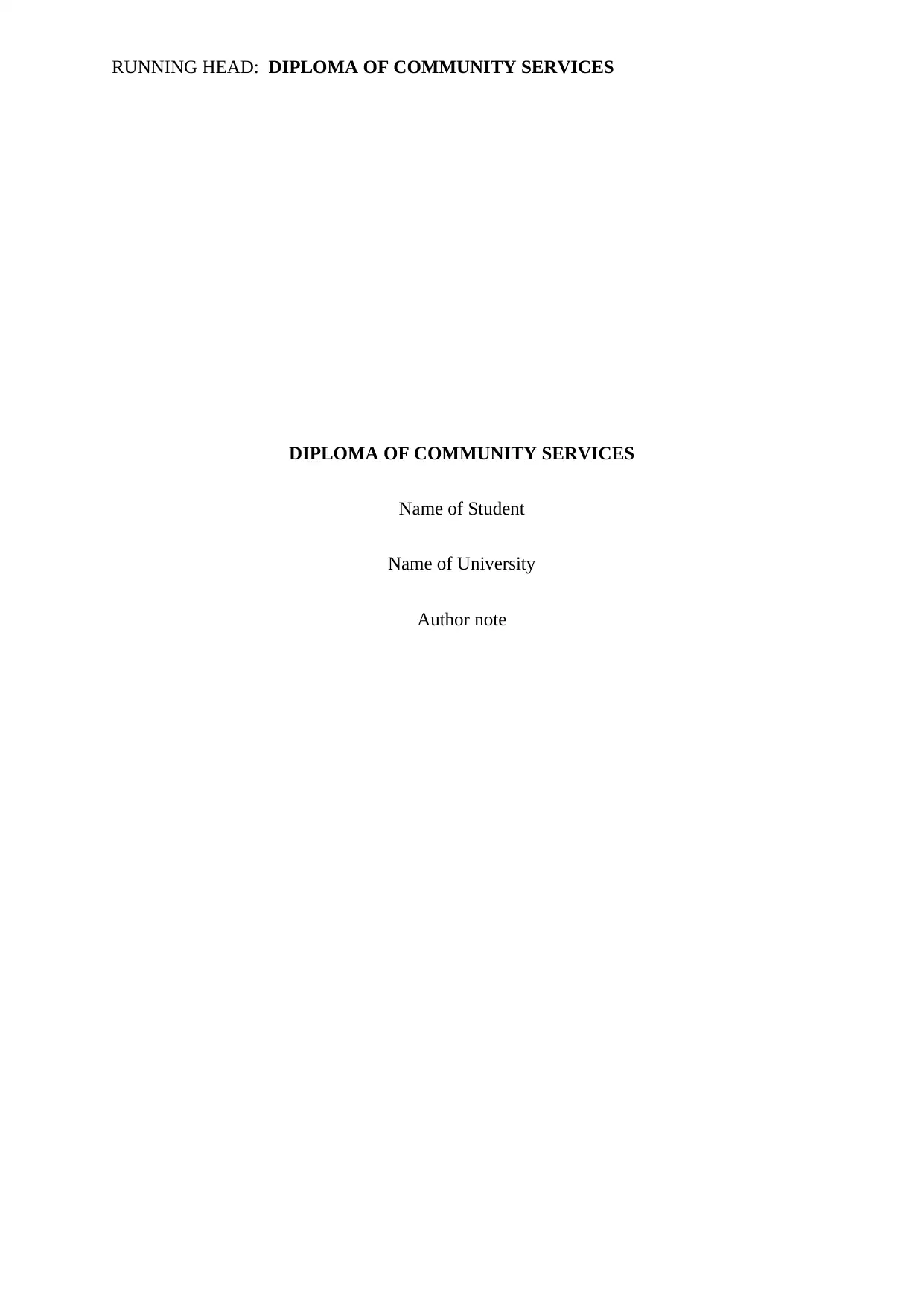
RUNNING HEAD: DIPLOMA OF COMMUNITY SERVICES
DIPLOMA OF COMMUNITY SERVICES
Name of Student
Name of University
Author note
DIPLOMA OF COMMUNITY SERVICES
Name of Student
Name of University
Author note
Secure Best Marks with AI Grader
Need help grading? Try our AI Grader for instant feedback on your assignments.
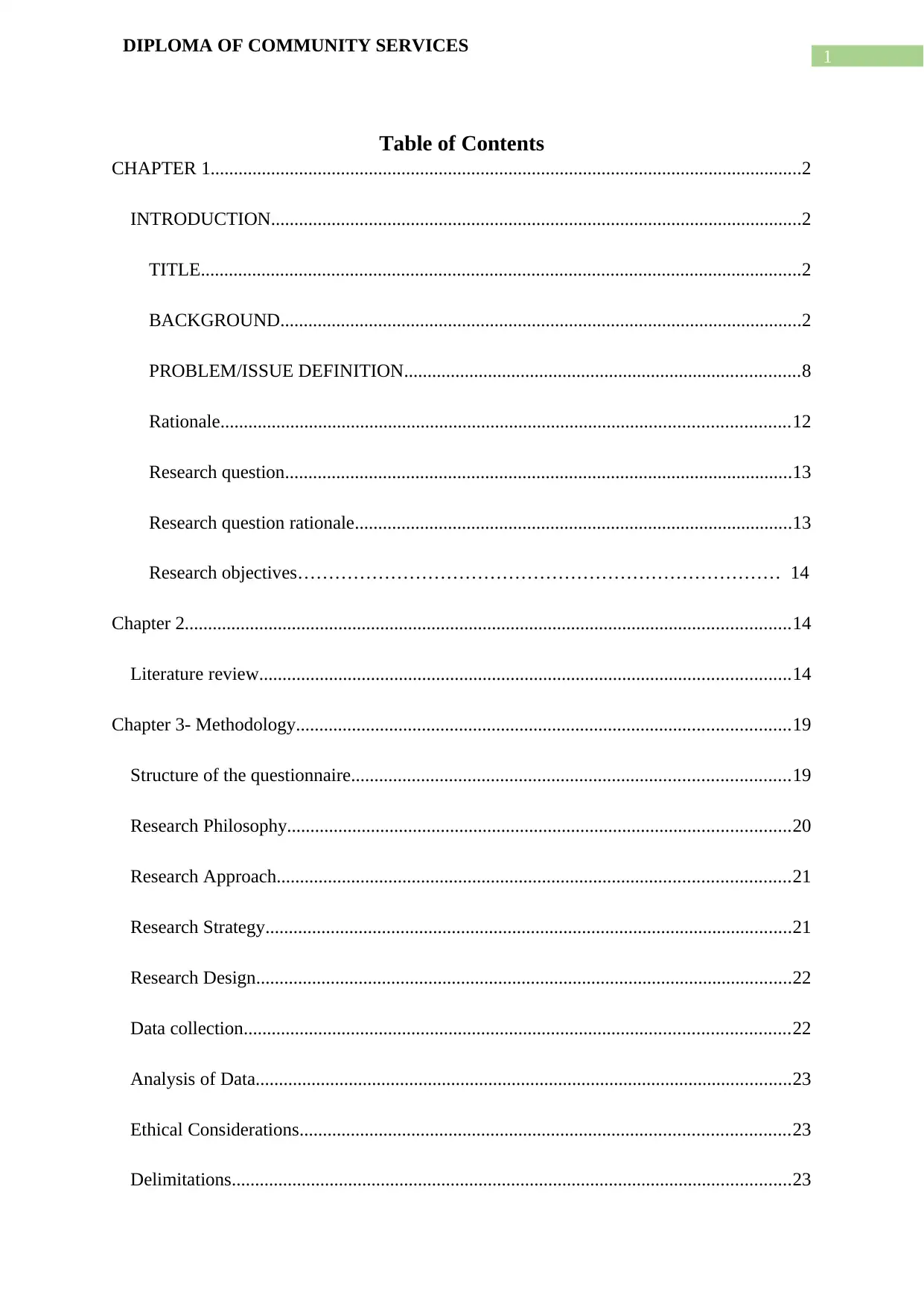
1
DIPLOMA OF COMMUNITY SERVICES
Table of Contents
CHAPTER 1...............................................................................................................................2
INTRODUCTION..................................................................................................................2
TITLE.................................................................................................................................2
BACKGROUND................................................................................................................2
PROBLEM/ISSUE DEFINITION.....................................................................................8
Rationale..........................................................................................................................12
Research question.............................................................................................................13
Research question rationale..............................................................................................13
Research objectives…………………………………………………………………… 14
Chapter 2..................................................................................................................................14
Literature review..................................................................................................................14
Chapter 3- Methodology..........................................................................................................19
Structure of the questionnaire..............................................................................................19
Research Philosophy............................................................................................................20
Research Approach..............................................................................................................21
Research Strategy.................................................................................................................21
Research Design...................................................................................................................22
Data collection.....................................................................................................................22
Analysis of Data...................................................................................................................23
Ethical Considerations.........................................................................................................23
Delimitations........................................................................................................................23
DIPLOMA OF COMMUNITY SERVICES
Table of Contents
CHAPTER 1...............................................................................................................................2
INTRODUCTION..................................................................................................................2
TITLE.................................................................................................................................2
BACKGROUND................................................................................................................2
PROBLEM/ISSUE DEFINITION.....................................................................................8
Rationale..........................................................................................................................12
Research question.............................................................................................................13
Research question rationale..............................................................................................13
Research objectives…………………………………………………………………… 14
Chapter 2..................................................................................................................................14
Literature review..................................................................................................................14
Chapter 3- Methodology..........................................................................................................19
Structure of the questionnaire..............................................................................................19
Research Philosophy............................................................................................................20
Research Approach..............................................................................................................21
Research Strategy.................................................................................................................21
Research Design...................................................................................................................22
Data collection.....................................................................................................................22
Analysis of Data...................................................................................................................23
Ethical Considerations.........................................................................................................23
Delimitations........................................................................................................................23

2
DIPLOMA OF COMMUNITY SERVICES
Summary of the chapter.......................................................................................................24
Saunder’s Research Onion framework.................................................................................25
Chapter 4- Findings and Analysis............................................................................................26
Raw data for the study obtained from questionnaire:..........................................................26
Correlation of the factors associated with the study:...........................................................27
Discussion............................................................................................................................28
Chapter 5- Conclusion and Recommendation..........................................................................30
References................................................................................................................................32
DIPLOMA OF COMMUNITY SERVICES
Summary of the chapter.......................................................................................................24
Saunder’s Research Onion framework.................................................................................25
Chapter 4- Findings and Analysis............................................................................................26
Raw data for the study obtained from questionnaire:..........................................................26
Correlation of the factors associated with the study:...........................................................27
Discussion............................................................................................................................28
Chapter 5- Conclusion and Recommendation..........................................................................30
References................................................................................................................................32
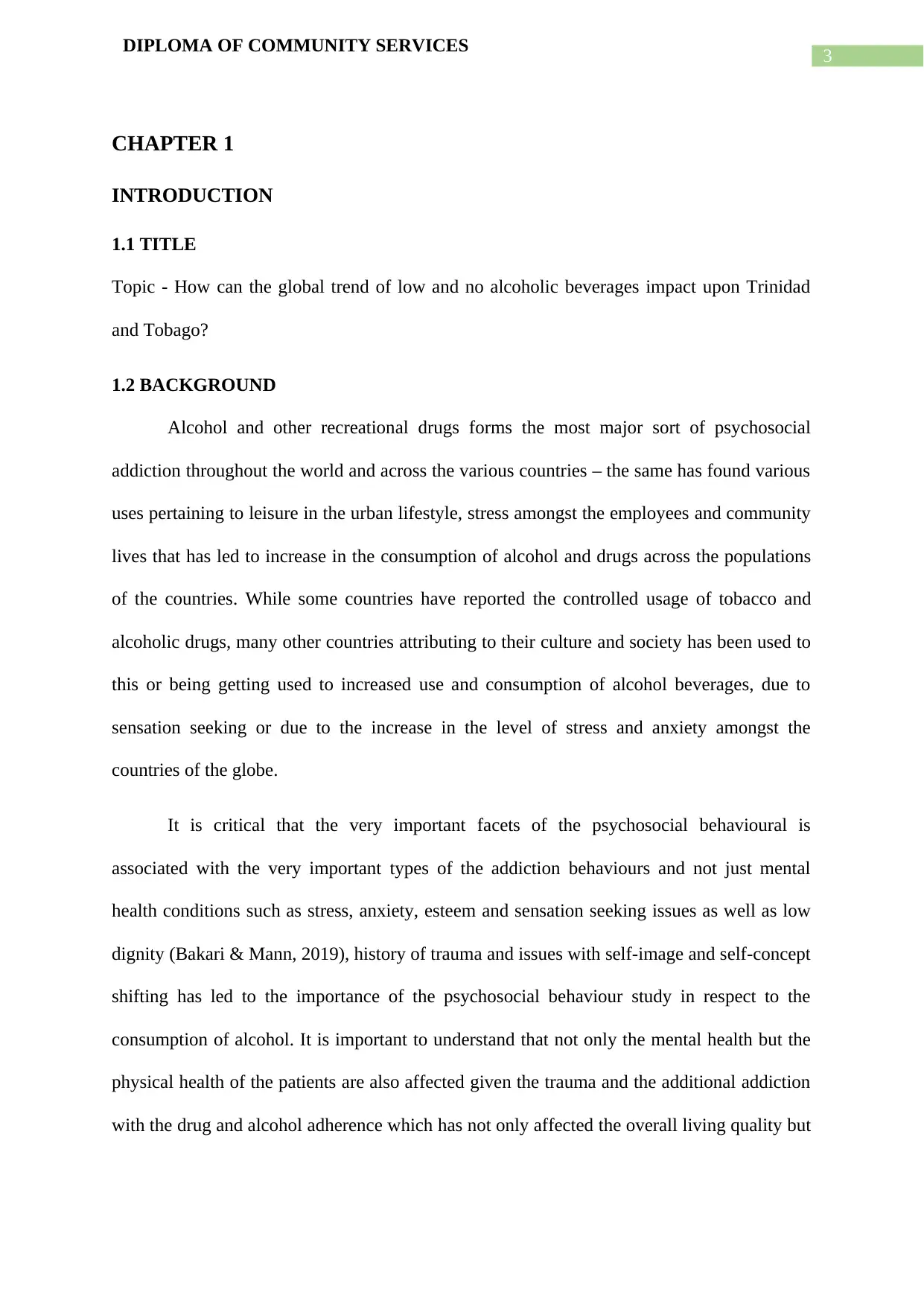
3
DIPLOMA OF COMMUNITY SERVICES
CHAPTER 1
INTRODUCTION
1.1 TITLE
Topic - How can the global trend of low and no alcoholic beverages impact upon Trinidad
and Tobago?
1.2 BACKGROUND
Alcohol and other recreational drugs forms the most major sort of psychosocial
addiction throughout the world and across the various countries – the same has found various
uses pertaining to leisure in the urban lifestyle, stress amongst the employees and community
lives that has led to increase in the consumption of alcohol and drugs across the populations
of the countries. While some countries have reported the controlled usage of tobacco and
alcoholic drugs, many other countries attributing to their culture and society has been used to
this or being getting used to increased use and consumption of alcohol beverages, due to
sensation seeking or due to the increase in the level of stress and anxiety amongst the
countries of the globe.
It is critical that the very important facets of the psychosocial behavioural is
associated with the very important types of the addiction behaviours and not just mental
health conditions such as stress, anxiety, esteem and sensation seeking issues as well as low
dignity (Bakari & Mann, 2019), history of trauma and issues with self-image and self-concept
shifting has led to the importance of the psychosocial behaviour study in respect to the
consumption of alcohol. It is important to understand that not only the mental health but the
physical health of the patients are also affected given the trauma and the additional addiction
with the drug and alcohol adherence which has not only affected the overall living quality but
DIPLOMA OF COMMUNITY SERVICES
CHAPTER 1
INTRODUCTION
1.1 TITLE
Topic - How can the global trend of low and no alcoholic beverages impact upon Trinidad
and Tobago?
1.2 BACKGROUND
Alcohol and other recreational drugs forms the most major sort of psychosocial
addiction throughout the world and across the various countries – the same has found various
uses pertaining to leisure in the urban lifestyle, stress amongst the employees and community
lives that has led to increase in the consumption of alcohol and drugs across the populations
of the countries. While some countries have reported the controlled usage of tobacco and
alcoholic drugs, many other countries attributing to their culture and society has been used to
this or being getting used to increased use and consumption of alcohol beverages, due to
sensation seeking or due to the increase in the level of stress and anxiety amongst the
countries of the globe.
It is critical that the very important facets of the psychosocial behavioural is
associated with the very important types of the addiction behaviours and not just mental
health conditions such as stress, anxiety, esteem and sensation seeking issues as well as low
dignity (Bakari & Mann, 2019), history of trauma and issues with self-image and self-concept
shifting has led to the importance of the psychosocial behaviour study in respect to the
consumption of alcohol. It is important to understand that not only the mental health but the
physical health of the patients are also affected given the trauma and the additional addiction
with the drug and alcohol adherence which has not only affected the overall living quality but
Secure Best Marks with AI Grader
Need help grading? Try our AI Grader for instant feedback on your assignments.
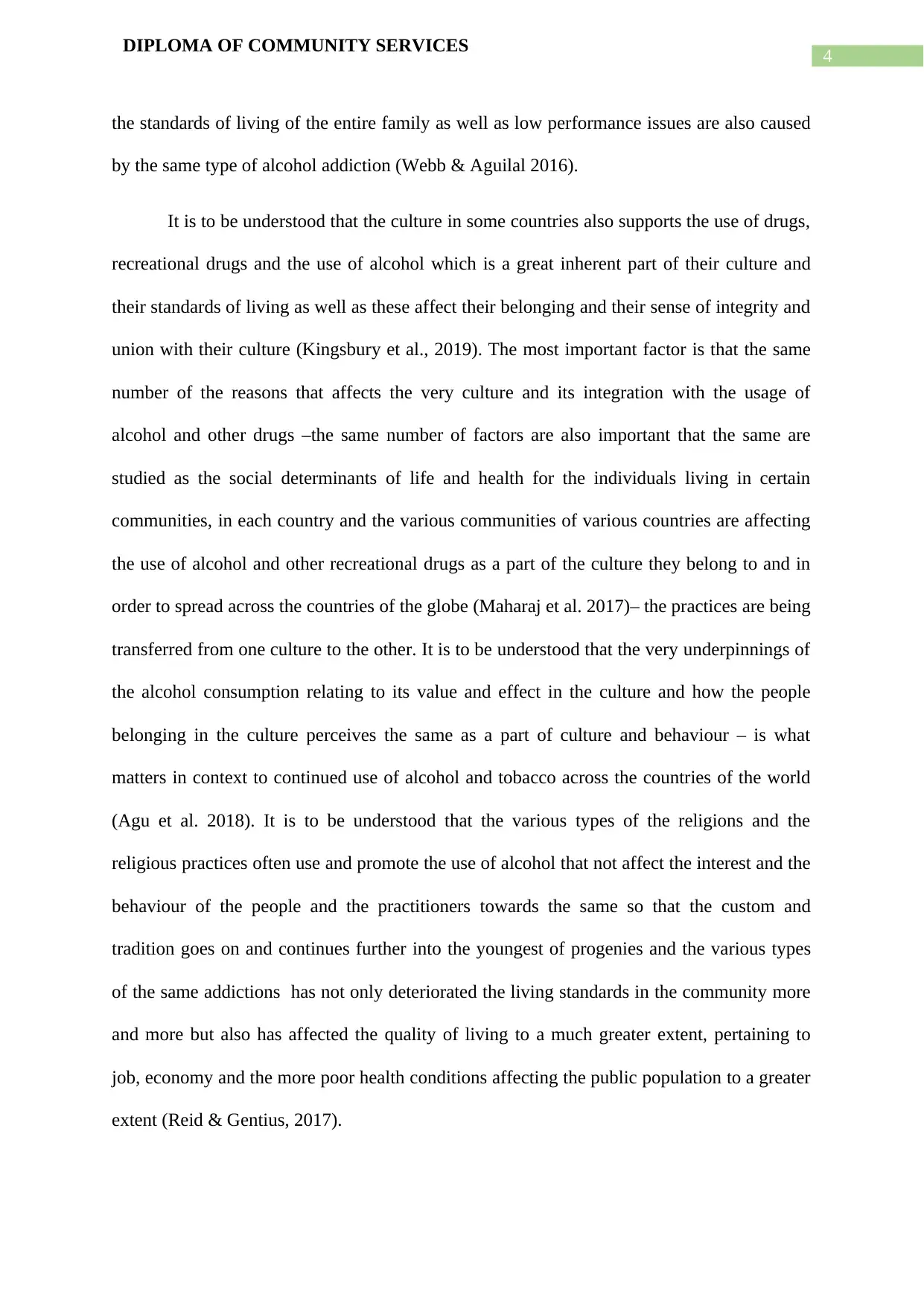
4
DIPLOMA OF COMMUNITY SERVICES
the standards of living of the entire family as well as low performance issues are also caused
by the same type of alcohol addiction (Webb & Aguilal 2016).
It is to be understood that the culture in some countries also supports the use of drugs,
recreational drugs and the use of alcohol which is a great inherent part of their culture and
their standards of living as well as these affect their belonging and their sense of integrity and
union with their culture (Kingsbury et al., 2019). The most important factor is that the same
number of the reasons that affects the very culture and its integration with the usage of
alcohol and other drugs –the same number of factors are also important that the same are
studied as the social determinants of life and health for the individuals living in certain
communities, in each country and the various communities of various countries are affecting
the use of alcohol and other recreational drugs as a part of the culture they belong to and in
order to spread across the countries of the globe (Maharaj et al. 2017)– the practices are being
transferred from one culture to the other. It is to be understood that the very underpinnings of
the alcohol consumption relating to its value and effect in the culture and how the people
belonging in the culture perceives the same as a part of culture and behaviour – is what
matters in context to continued use of alcohol and tobacco across the countries of the world
(Agu et al. 2018). It is to be understood that the various types of the religions and the
religious practices often use and promote the use of alcohol that not affect the interest and the
behaviour of the people and the practitioners towards the same so that the custom and
tradition goes on and continues further into the youngest of progenies and the various types
of the same addictions has not only deteriorated the living standards in the community more
and more but also has affected the quality of living to a much greater extent, pertaining to
job, economy and the more poor health conditions affecting the public population to a greater
extent (Reid & Gentius, 2017).
DIPLOMA OF COMMUNITY SERVICES
the standards of living of the entire family as well as low performance issues are also caused
by the same type of alcohol addiction (Webb & Aguilal 2016).
It is to be understood that the culture in some countries also supports the use of drugs,
recreational drugs and the use of alcohol which is a great inherent part of their culture and
their standards of living as well as these affect their belonging and their sense of integrity and
union with their culture (Kingsbury et al., 2019). The most important factor is that the same
number of the reasons that affects the very culture and its integration with the usage of
alcohol and other drugs –the same number of factors are also important that the same are
studied as the social determinants of life and health for the individuals living in certain
communities, in each country and the various communities of various countries are affecting
the use of alcohol and other recreational drugs as a part of the culture they belong to and in
order to spread across the countries of the globe (Maharaj et al. 2017)– the practices are being
transferred from one culture to the other. It is to be understood that the very underpinnings of
the alcohol consumption relating to its value and effect in the culture and how the people
belonging in the culture perceives the same as a part of culture and behaviour – is what
matters in context to continued use of alcohol and tobacco across the countries of the world
(Agu et al. 2018). It is to be understood that the various types of the religions and the
religious practices often use and promote the use of alcohol that not affect the interest and the
behaviour of the people and the practitioners towards the same so that the custom and
tradition goes on and continues further into the youngest of progenies and the various types
of the same addictions has not only deteriorated the living standards in the community more
and more but also has affected the quality of living to a much greater extent, pertaining to
job, economy and the more poor health conditions affecting the public population to a greater
extent (Reid & Gentius, 2017).
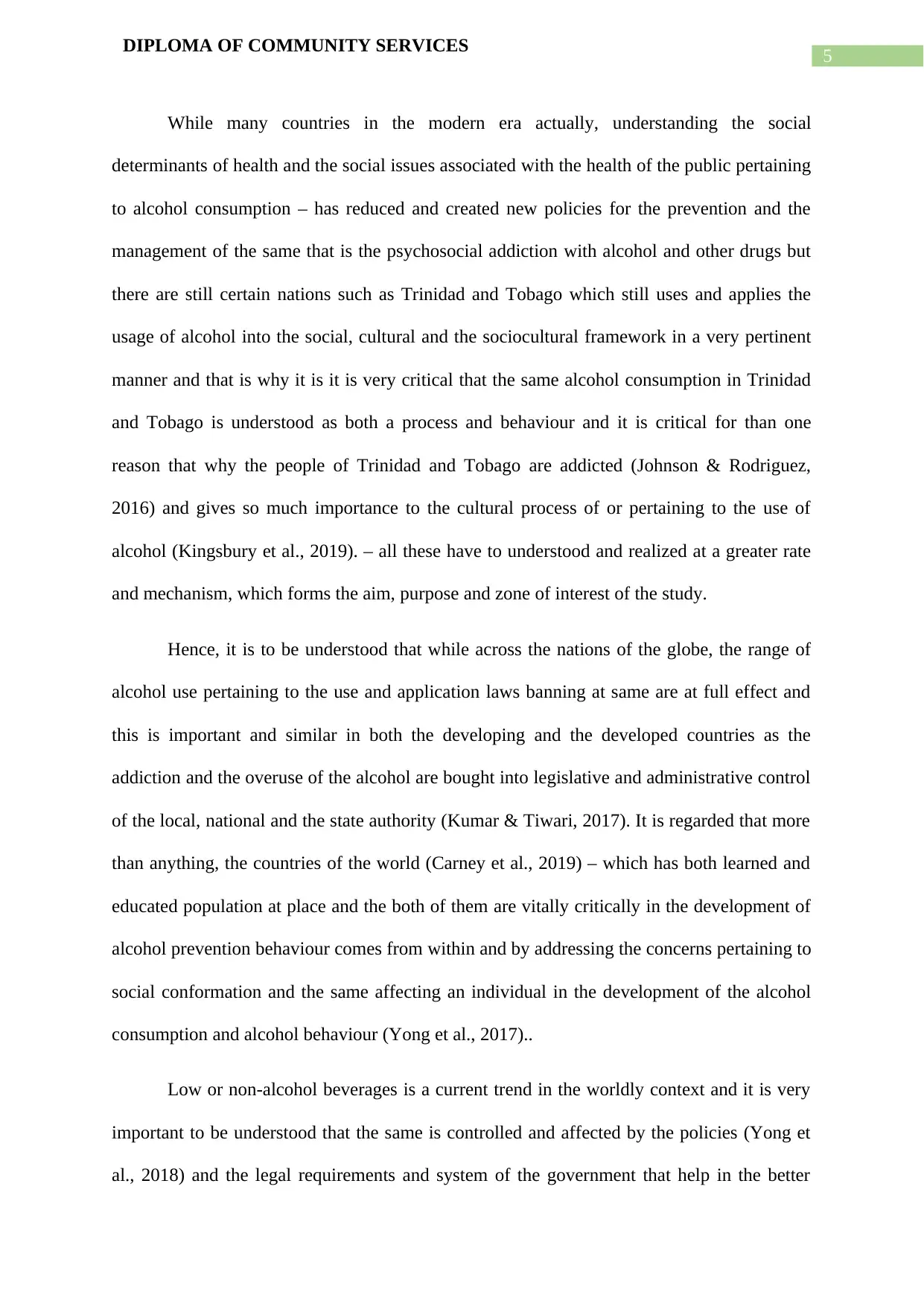
5
DIPLOMA OF COMMUNITY SERVICES
While many countries in the modern era actually, understanding the social
determinants of health and the social issues associated with the health of the public pertaining
to alcohol consumption – has reduced and created new policies for the prevention and the
management of the same that is the psychosocial addiction with alcohol and other drugs but
there are still certain nations such as Trinidad and Tobago which still uses and applies the
usage of alcohol into the social, cultural and the sociocultural framework in a very pertinent
manner and that is why it is it is very critical that the same alcohol consumption in Trinidad
and Tobago is understood as both a process and behaviour and it is critical for than one
reason that why the people of Trinidad and Tobago are addicted (Johnson & Rodriguez,
2016) and gives so much importance to the cultural process of or pertaining to the use of
alcohol (Kingsbury et al., 2019). – all these have to understood and realized at a greater rate
and mechanism, which forms the aim, purpose and zone of interest of the study.
Hence, it is to be understood that while across the nations of the globe, the range of
alcohol use pertaining to the use and application laws banning at same are at full effect and
this is important and similar in both the developing and the developed countries as the
addiction and the overuse of the alcohol are bought into legislative and administrative control
of the local, national and the state authority (Kumar & Tiwari, 2017). It is regarded that more
than anything, the countries of the world (Carney et al., 2019) – which has both learned and
educated population at place and the both of them are vitally critically in the development of
alcohol prevention behaviour comes from within and by addressing the concerns pertaining to
social conformation and the same affecting an individual in the development of the alcohol
consumption and alcohol behaviour (Yong et al., 2017)..
Low or non-alcohol beverages is a current trend in the worldly context and it is very
important to be understood that the same is controlled and affected by the policies (Yong et
al., 2018) and the legal requirements and system of the government that help in the better
DIPLOMA OF COMMUNITY SERVICES
While many countries in the modern era actually, understanding the social
determinants of health and the social issues associated with the health of the public pertaining
to alcohol consumption – has reduced and created new policies for the prevention and the
management of the same that is the psychosocial addiction with alcohol and other drugs but
there are still certain nations such as Trinidad and Tobago which still uses and applies the
usage of alcohol into the social, cultural and the sociocultural framework in a very pertinent
manner and that is why it is it is very critical that the same alcohol consumption in Trinidad
and Tobago is understood as both a process and behaviour and it is critical for than one
reason that why the people of Trinidad and Tobago are addicted (Johnson & Rodriguez,
2016) and gives so much importance to the cultural process of or pertaining to the use of
alcohol (Kingsbury et al., 2019). – all these have to understood and realized at a greater rate
and mechanism, which forms the aim, purpose and zone of interest of the study.
Hence, it is to be understood that while across the nations of the globe, the range of
alcohol use pertaining to the use and application laws banning at same are at full effect and
this is important and similar in both the developing and the developed countries as the
addiction and the overuse of the alcohol are bought into legislative and administrative control
of the local, national and the state authority (Kumar & Tiwari, 2017). It is regarded that more
than anything, the countries of the world (Carney et al., 2019) – which has both learned and
educated population at place and the both of them are vitally critically in the development of
alcohol prevention behaviour comes from within and by addressing the concerns pertaining to
social conformation and the same affecting an individual in the development of the alcohol
consumption and alcohol behaviour (Yong et al., 2017)..
Low or non-alcohol beverages is a current trend in the worldly context and it is very
important to be understood that the same is controlled and affected by the policies (Yong et
al., 2018) and the legal requirements and system of the government that help in the better
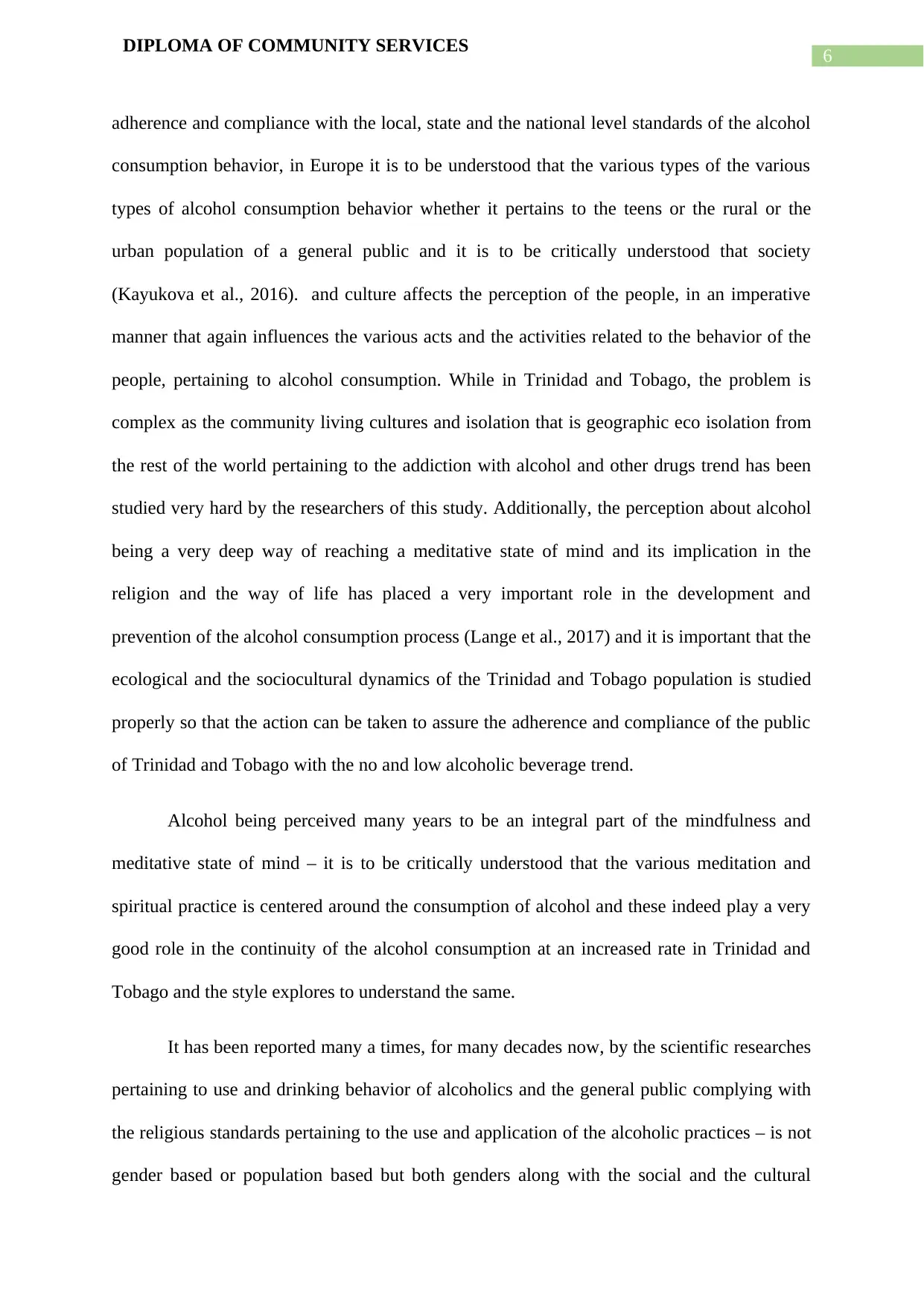
6
DIPLOMA OF COMMUNITY SERVICES
adherence and compliance with the local, state and the national level standards of the alcohol
consumption behavior, in Europe it is to be understood that the various types of the various
types of alcohol consumption behavior whether it pertains to the teens or the rural or the
urban population of a general public and it is to be critically understood that society
(Kayukova et al., 2016). and culture affects the perception of the people, in an imperative
manner that again influences the various acts and the activities related to the behavior of the
people, pertaining to alcohol consumption. While in Trinidad and Tobago, the problem is
complex as the community living cultures and isolation that is geographic eco isolation from
the rest of the world pertaining to the addiction with alcohol and other drugs trend has been
studied very hard by the researchers of this study. Additionally, the perception about alcohol
being a very deep way of reaching a meditative state of mind and its implication in the
religion and the way of life has placed a very important role in the development and
prevention of the alcohol consumption process (Lange et al., 2017) and it is important that the
ecological and the sociocultural dynamics of the Trinidad and Tobago population is studied
properly so that the action can be taken to assure the adherence and compliance of the public
of Trinidad and Tobago with the no and low alcoholic beverage trend.
Alcohol being perceived many years to be an integral part of the mindfulness and
meditative state of mind – it is to be critically understood that the various meditation and
spiritual practice is centered around the consumption of alcohol and these indeed play a very
good role in the continuity of the alcohol consumption at an increased rate in Trinidad and
Tobago and the style explores to understand the same.
It has been reported many a times, for many decades now, by the scientific researches
pertaining to use and drinking behavior of alcoholics and the general public complying with
the religious standards pertaining to the use and application of the alcoholic practices – is not
gender based or population based but both genders along with the social and the cultural
DIPLOMA OF COMMUNITY SERVICES
adherence and compliance with the local, state and the national level standards of the alcohol
consumption behavior, in Europe it is to be understood that the various types of the various
types of alcohol consumption behavior whether it pertains to the teens or the rural or the
urban population of a general public and it is to be critically understood that society
(Kayukova et al., 2016). and culture affects the perception of the people, in an imperative
manner that again influences the various acts and the activities related to the behavior of the
people, pertaining to alcohol consumption. While in Trinidad and Tobago, the problem is
complex as the community living cultures and isolation that is geographic eco isolation from
the rest of the world pertaining to the addiction with alcohol and other drugs trend has been
studied very hard by the researchers of this study. Additionally, the perception about alcohol
being a very deep way of reaching a meditative state of mind and its implication in the
religion and the way of life has placed a very important role in the development and
prevention of the alcohol consumption process (Lange et al., 2017) and it is important that the
ecological and the sociocultural dynamics of the Trinidad and Tobago population is studied
properly so that the action can be taken to assure the adherence and compliance of the public
of Trinidad and Tobago with the no and low alcoholic beverage trend.
Alcohol being perceived many years to be an integral part of the mindfulness and
meditative state of mind – it is to be critically understood that the various meditation and
spiritual practice is centered around the consumption of alcohol and these indeed play a very
good role in the continuity of the alcohol consumption at an increased rate in Trinidad and
Tobago and the style explores to understand the same.
It has been reported many a times, for many decades now, by the scientific researches
pertaining to use and drinking behavior of alcoholics and the general public complying with
the religious standards pertaining to the use and application of the alcoholic practices – is not
gender based or population based but both genders along with the social and the cultural
Paraphrase This Document
Need a fresh take? Get an instant paraphrase of this document with our AI Paraphraser
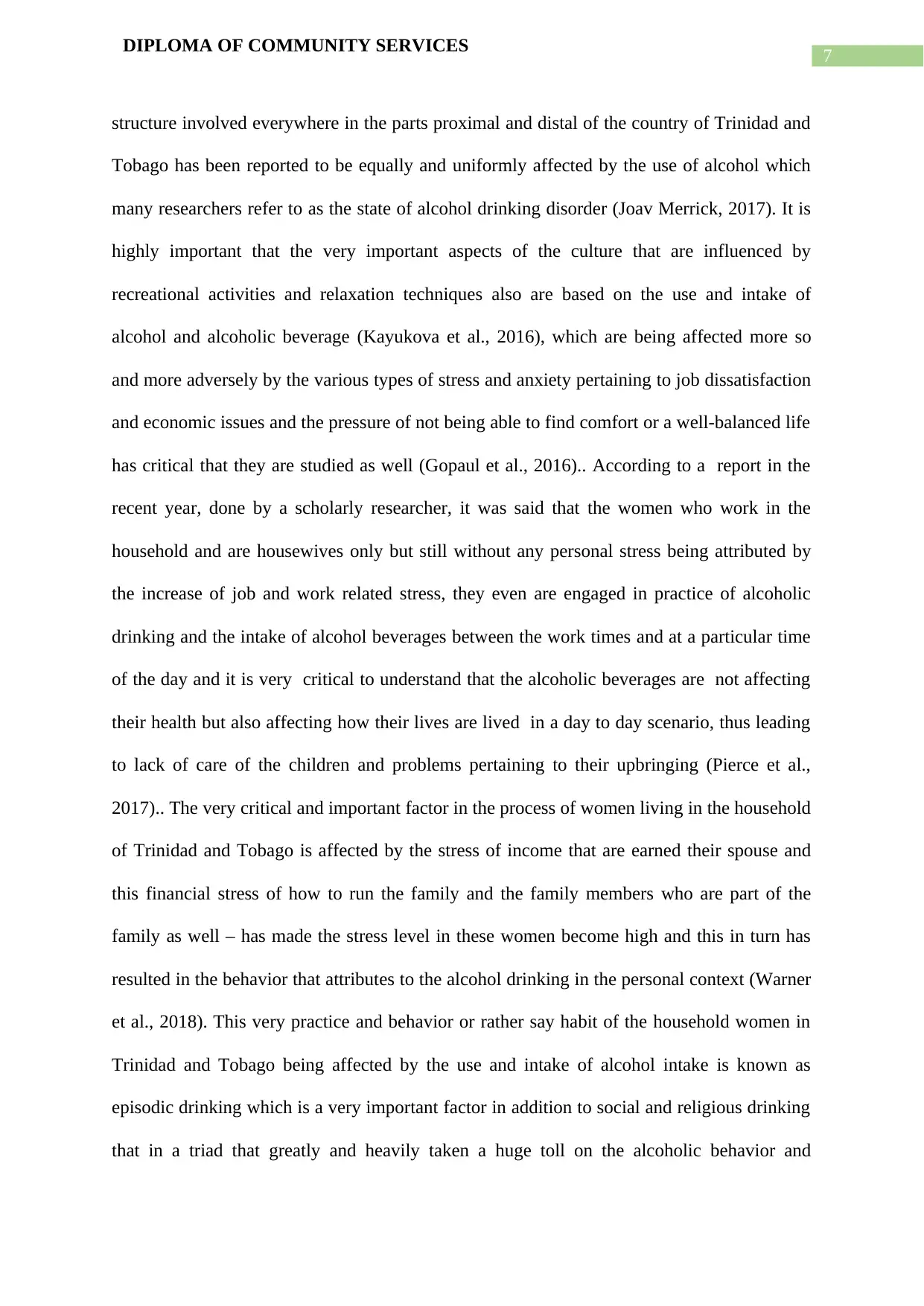
7
DIPLOMA OF COMMUNITY SERVICES
structure involved everywhere in the parts proximal and distal of the country of Trinidad and
Tobago has been reported to be equally and uniformly affected by the use of alcohol which
many researchers refer to as the state of alcohol drinking disorder (Joav Merrick, 2017). It is
highly important that the very important aspects of the culture that are influenced by
recreational activities and relaxation techniques also are based on the use and intake of
alcohol and alcoholic beverage (Kayukova et al., 2016), which are being affected more so
and more adversely by the various types of stress and anxiety pertaining to job dissatisfaction
and economic issues and the pressure of not being able to find comfort or a well-balanced life
has critical that they are studied as well (Gopaul et al., 2016).. According to a report in the
recent year, done by a scholarly researcher, it was said that the women who work in the
household and are housewives only but still without any personal stress being attributed by
the increase of job and work related stress, they even are engaged in practice of alcoholic
drinking and the intake of alcohol beverages between the work times and at a particular time
of the day and it is very critical to understand that the alcoholic beverages are not affecting
their health but also affecting how their lives are lived in a day to day scenario, thus leading
to lack of care of the children and problems pertaining to their upbringing (Pierce et al.,
2017).. The very critical and important factor in the process of women living in the household
of Trinidad and Tobago is affected by the stress of income that are earned their spouse and
this financial stress of how to run the family and the family members who are part of the
family as well – has made the stress level in these women become high and this in turn has
resulted in the behavior that attributes to the alcohol drinking in the personal context (Warner
et al., 2018). This very practice and behavior or rather say habit of the household women in
Trinidad and Tobago being affected by the use and intake of alcohol intake is known as
episodic drinking which is a very important factor in addition to social and religious drinking
that in a triad that greatly and heavily taken a huge toll on the alcoholic behavior and
DIPLOMA OF COMMUNITY SERVICES
structure involved everywhere in the parts proximal and distal of the country of Trinidad and
Tobago has been reported to be equally and uniformly affected by the use of alcohol which
many researchers refer to as the state of alcohol drinking disorder (Joav Merrick, 2017). It is
highly important that the very important aspects of the culture that are influenced by
recreational activities and relaxation techniques also are based on the use and intake of
alcohol and alcoholic beverage (Kayukova et al., 2016), which are being affected more so
and more adversely by the various types of stress and anxiety pertaining to job dissatisfaction
and economic issues and the pressure of not being able to find comfort or a well-balanced life
has critical that they are studied as well (Gopaul et al., 2016).. According to a report in the
recent year, done by a scholarly researcher, it was said that the women who work in the
household and are housewives only but still without any personal stress being attributed by
the increase of job and work related stress, they even are engaged in practice of alcoholic
drinking and the intake of alcohol beverages between the work times and at a particular time
of the day and it is very critical to understand that the alcoholic beverages are not affecting
their health but also affecting how their lives are lived in a day to day scenario, thus leading
to lack of care of the children and problems pertaining to their upbringing (Pierce et al.,
2017).. The very critical and important factor in the process of women living in the household
of Trinidad and Tobago is affected by the stress of income that are earned their spouse and
this financial stress of how to run the family and the family members who are part of the
family as well – has made the stress level in these women become high and this in turn has
resulted in the behavior that attributes to the alcohol drinking in the personal context (Warner
et al., 2018). This very practice and behavior or rather say habit of the household women in
Trinidad and Tobago being affected by the use and intake of alcohol intake is known as
episodic drinking which is a very important factor in addition to social and religious drinking
that in a triad that greatly and heavily taken a huge toll on the alcoholic behavior and
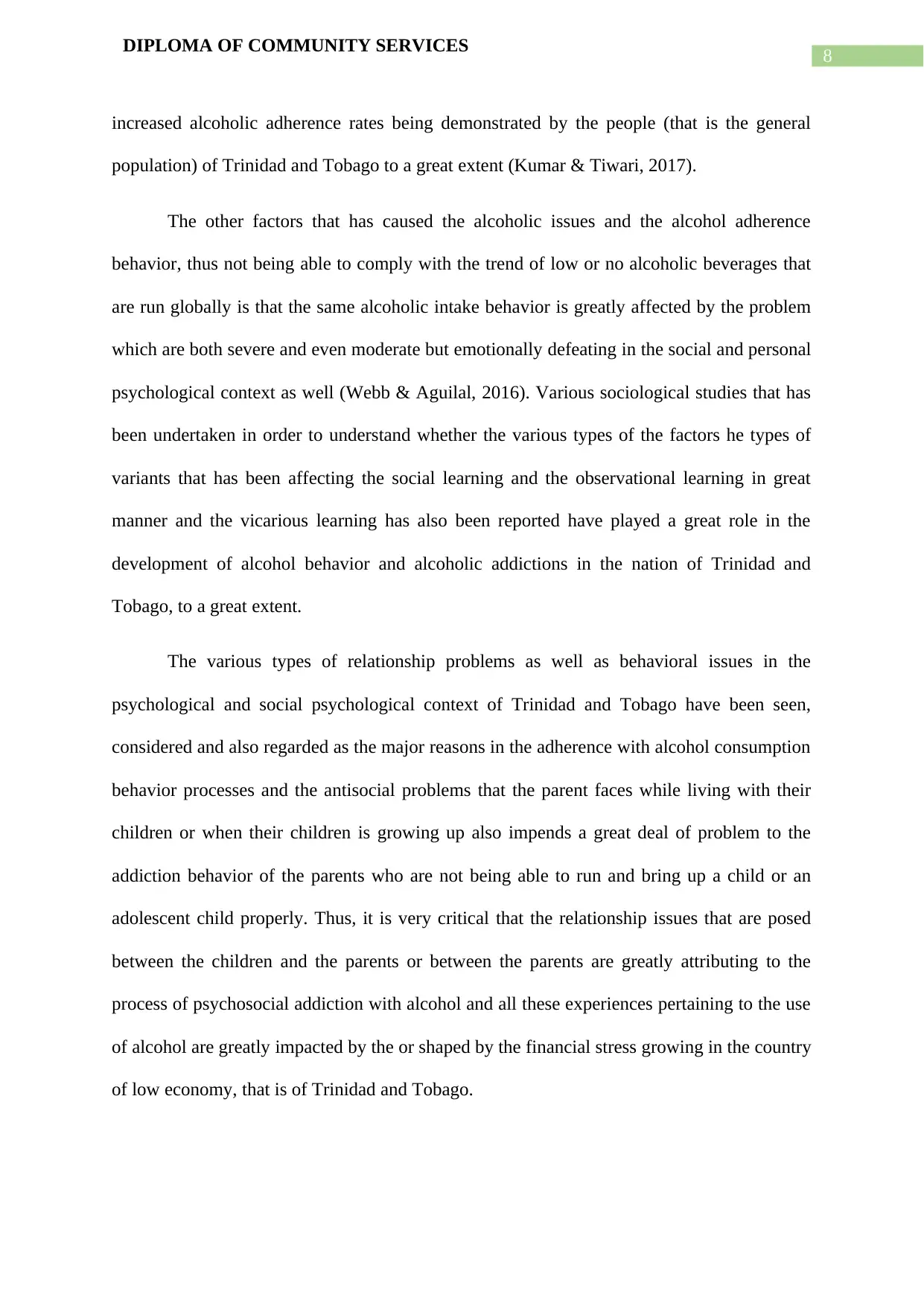
8
DIPLOMA OF COMMUNITY SERVICES
increased alcoholic adherence rates being demonstrated by the people (that is the general
population) of Trinidad and Tobago to a great extent (Kumar & Tiwari, 2017).
The other factors that has caused the alcoholic issues and the alcohol adherence
behavior, thus not being able to comply with the trend of low or no alcoholic beverages that
are run globally is that the same alcoholic intake behavior is greatly affected by the problem
which are both severe and even moderate but emotionally defeating in the social and personal
psychological context as well (Webb & Aguilal, 2016). Various sociological studies that has
been undertaken in order to understand whether the various types of the factors he types of
variants that has been affecting the social learning and the observational learning in great
manner and the vicarious learning has also been reported have played a great role in the
development of alcohol behavior and alcoholic addictions in the nation of Trinidad and
Tobago, to a great extent.
The various types of relationship problems as well as behavioral issues in the
psychological and social psychological context of Trinidad and Tobago have been seen,
considered and also regarded as the major reasons in the adherence with alcohol consumption
behavior processes and the antisocial problems that the parent faces while living with their
children or when their children is growing up also impends a great deal of problem to the
addiction behavior of the parents who are not being able to run and bring up a child or an
adolescent child properly. Thus, it is very critical that the relationship issues that are posed
between the children and the parents or between the parents are greatly attributing to the
process of psychosocial addiction with alcohol and all these experiences pertaining to the use
of alcohol are greatly impacted by the or shaped by the financial stress growing in the country
of low economy, that is of Trinidad and Tobago.
DIPLOMA OF COMMUNITY SERVICES
increased alcoholic adherence rates being demonstrated by the people (that is the general
population) of Trinidad and Tobago to a great extent (Kumar & Tiwari, 2017).
The other factors that has caused the alcoholic issues and the alcohol adherence
behavior, thus not being able to comply with the trend of low or no alcoholic beverages that
are run globally is that the same alcoholic intake behavior is greatly affected by the problem
which are both severe and even moderate but emotionally defeating in the social and personal
psychological context as well (Webb & Aguilal, 2016). Various sociological studies that has
been undertaken in order to understand whether the various types of the factors he types of
variants that has been affecting the social learning and the observational learning in great
manner and the vicarious learning has also been reported have played a great role in the
development of alcohol behavior and alcoholic addictions in the nation of Trinidad and
Tobago, to a great extent.
The various types of relationship problems as well as behavioral issues in the
psychological and social psychological context of Trinidad and Tobago have been seen,
considered and also regarded as the major reasons in the adherence with alcohol consumption
behavior processes and the antisocial problems that the parent faces while living with their
children or when their children is growing up also impends a great deal of problem to the
addiction behavior of the parents who are not being able to run and bring up a child or an
adolescent child properly. Thus, it is very critical that the relationship issues that are posed
between the children and the parents or between the parents are greatly attributing to the
process of psychosocial addiction with alcohol and all these experiences pertaining to the use
of alcohol are greatly impacted by the or shaped by the financial stress growing in the country
of low economy, that is of Trinidad and Tobago.
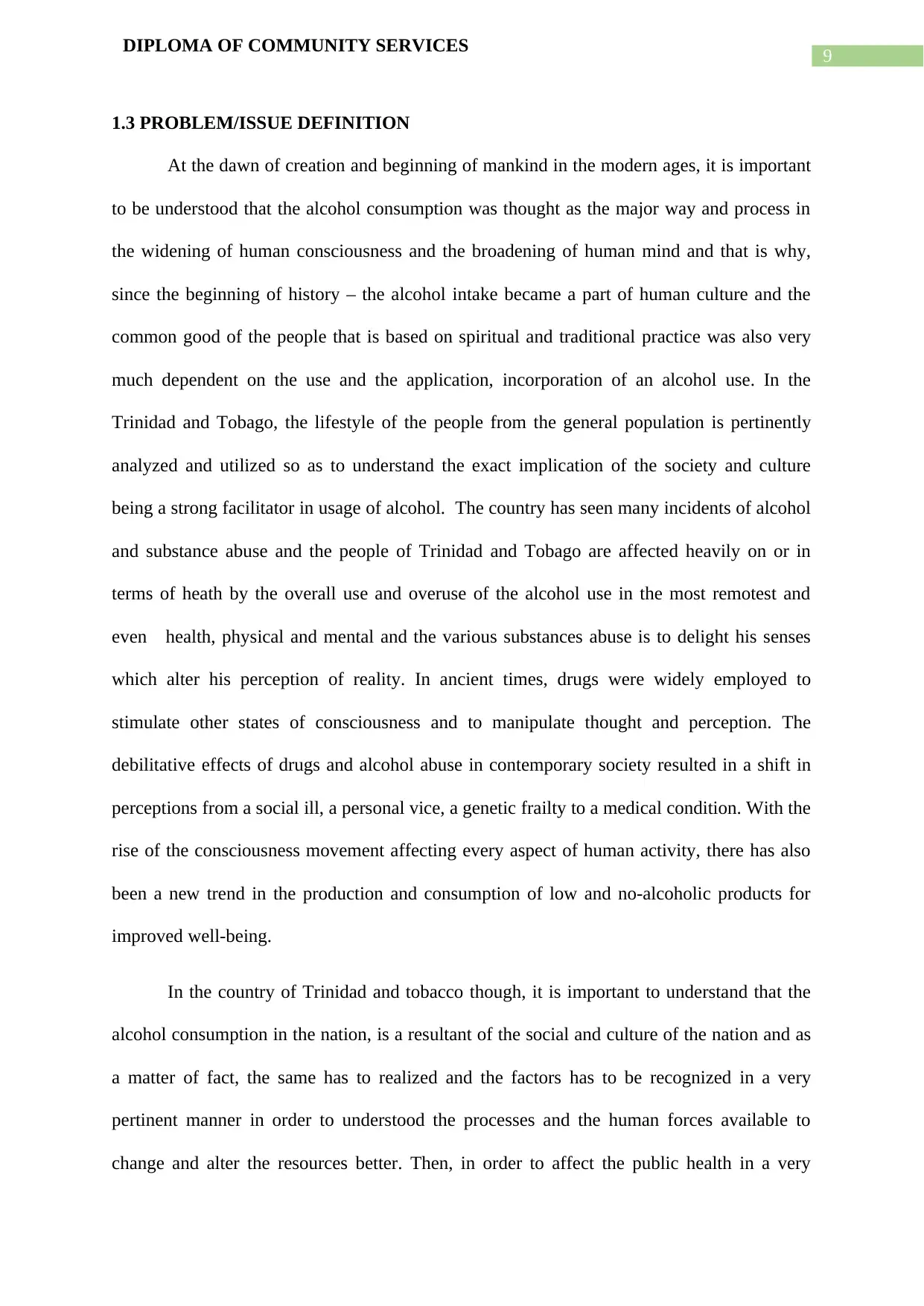
9
DIPLOMA OF COMMUNITY SERVICES
1.3 PROBLEM/ISSUE DEFINITION
At the dawn of creation and beginning of mankind in the modern ages, it is important
to be understood that the alcohol consumption was thought as the major way and process in
the widening of human consciousness and the broadening of human mind and that is why,
since the beginning of history – the alcohol intake became a part of human culture and the
common good of the people that is based on spiritual and traditional practice was also very
much dependent on the use and the application, incorporation of an alcohol use. In the
Trinidad and Tobago, the lifestyle of the people from the general population is pertinently
analyzed and utilized so as to understand the exact implication of the society and culture
being a strong facilitator in usage of alcohol. The country has seen many incidents of alcohol
and substance abuse and the people of Trinidad and Tobago are affected heavily on or in
terms of heath by the overall use and overuse of the alcohol use in the most remotest and
even health, physical and mental and the various substances abuse is to delight his senses
which alter his perception of reality. In ancient times, drugs were widely employed to
stimulate other states of consciousness and to manipulate thought and perception. The
debilitative effects of drugs and alcohol abuse in contemporary society resulted in a shift in
perceptions from a social ill, a personal vice, a genetic frailty to a medical condition. With the
rise of the consciousness movement affecting every aspect of human activity, there has also
been a new trend in the production and consumption of low and no-alcoholic products for
improved well-being.
In the country of Trinidad and tobacco though, it is important to understand that the
alcohol consumption in the nation, is a resultant of the social and culture of the nation and as
a matter of fact, the same has to realized and the factors has to be recognized in a very
pertinent manner in order to understood the processes and the human forces available to
change and alter the resources better. Then, in order to affect the public health in a very
DIPLOMA OF COMMUNITY SERVICES
1.3 PROBLEM/ISSUE DEFINITION
At the dawn of creation and beginning of mankind in the modern ages, it is important
to be understood that the alcohol consumption was thought as the major way and process in
the widening of human consciousness and the broadening of human mind and that is why,
since the beginning of history – the alcohol intake became a part of human culture and the
common good of the people that is based on spiritual and traditional practice was also very
much dependent on the use and the application, incorporation of an alcohol use. In the
Trinidad and Tobago, the lifestyle of the people from the general population is pertinently
analyzed and utilized so as to understand the exact implication of the society and culture
being a strong facilitator in usage of alcohol. The country has seen many incidents of alcohol
and substance abuse and the people of Trinidad and Tobago are affected heavily on or in
terms of heath by the overall use and overuse of the alcohol use in the most remotest and
even health, physical and mental and the various substances abuse is to delight his senses
which alter his perception of reality. In ancient times, drugs were widely employed to
stimulate other states of consciousness and to manipulate thought and perception. The
debilitative effects of drugs and alcohol abuse in contemporary society resulted in a shift in
perceptions from a social ill, a personal vice, a genetic frailty to a medical condition. With the
rise of the consciousness movement affecting every aspect of human activity, there has also
been a new trend in the production and consumption of low and no-alcoholic products for
improved well-being.
In the country of Trinidad and tobacco though, it is important to understand that the
alcohol consumption in the nation, is a resultant of the social and culture of the nation and as
a matter of fact, the same has to realized and the factors has to be recognized in a very
pertinent manner in order to understood the processes and the human forces available to
change and alter the resources better. Then, in order to affect the public health in a very
Secure Best Marks with AI Grader
Need help grading? Try our AI Grader for instant feedback on your assignments.
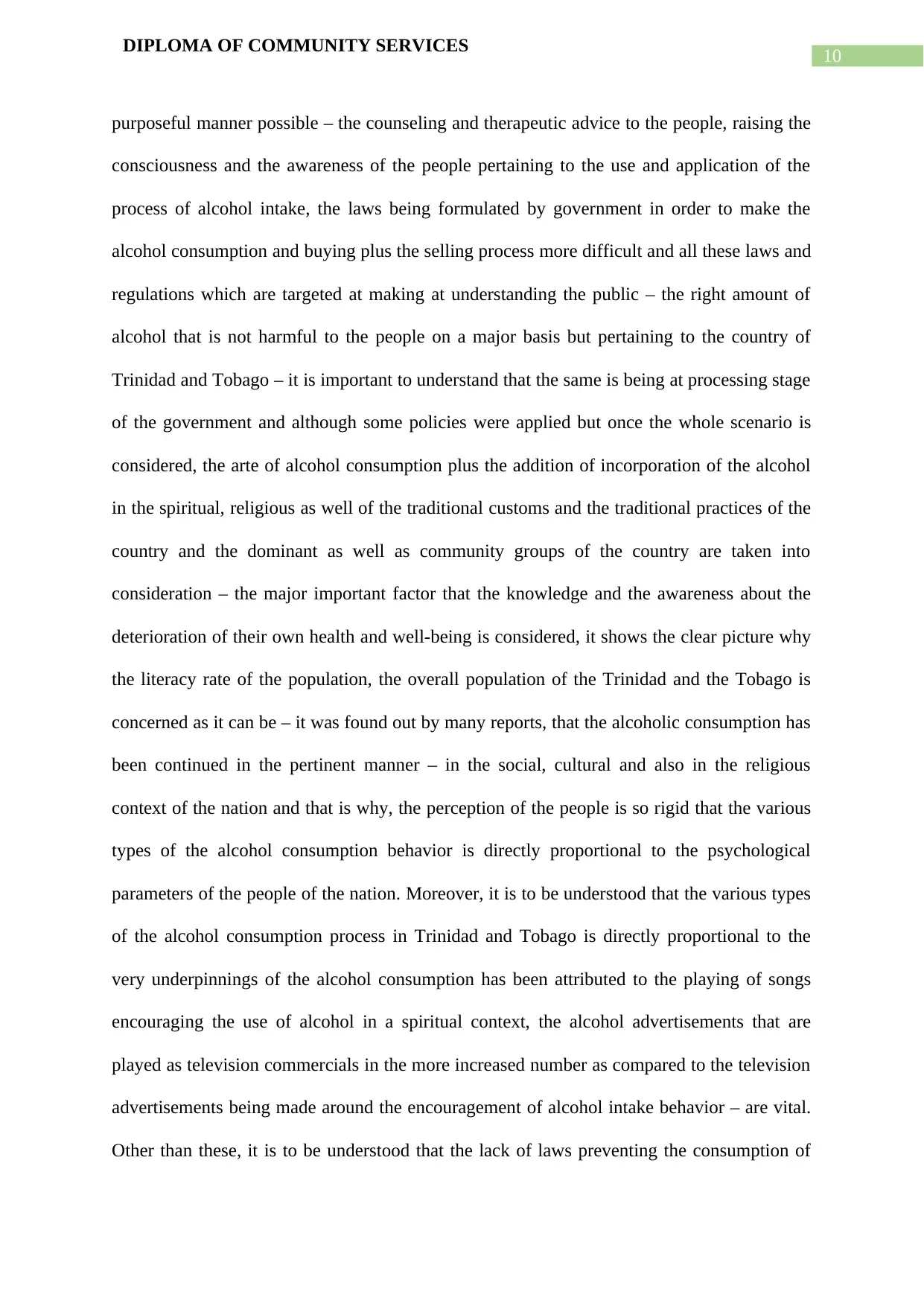
10
DIPLOMA OF COMMUNITY SERVICES
purposeful manner possible – the counseling and therapeutic advice to the people, raising the
consciousness and the awareness of the people pertaining to the use and application of the
process of alcohol intake, the laws being formulated by government in order to make the
alcohol consumption and buying plus the selling process more difficult and all these laws and
regulations which are targeted at making at understanding the public – the right amount of
alcohol that is not harmful to the people on a major basis but pertaining to the country of
Trinidad and Tobago – it is important to understand that the same is being at processing stage
of the government and although some policies were applied but once the whole scenario is
considered, the arte of alcohol consumption plus the addition of incorporation of the alcohol
in the spiritual, religious as well of the traditional customs and the traditional practices of the
country and the dominant as well as community groups of the country are taken into
consideration – the major important factor that the knowledge and the awareness about the
deterioration of their own health and well-being is considered, it shows the clear picture why
the literacy rate of the population, the overall population of the Trinidad and the Tobago is
concerned as it can be – it was found out by many reports, that the alcoholic consumption has
been continued in the pertinent manner – in the social, cultural and also in the religious
context of the nation and that is why, the perception of the people is so rigid that the various
types of the alcohol consumption behavior is directly proportional to the psychological
parameters of the people of the nation. Moreover, it is to be understood that the various types
of the alcohol consumption process in Trinidad and Tobago is directly proportional to the
very underpinnings of the alcohol consumption has been attributed to the playing of songs
encouraging the use of alcohol in a spiritual context, the alcohol advertisements that are
played as television commercials in the more increased number as compared to the television
advertisements being made around the encouragement of alcohol intake behavior – are vital.
Other than these, it is to be understood that the lack of laws preventing the consumption of
DIPLOMA OF COMMUNITY SERVICES
purposeful manner possible – the counseling and therapeutic advice to the people, raising the
consciousness and the awareness of the people pertaining to the use and application of the
process of alcohol intake, the laws being formulated by government in order to make the
alcohol consumption and buying plus the selling process more difficult and all these laws and
regulations which are targeted at making at understanding the public – the right amount of
alcohol that is not harmful to the people on a major basis but pertaining to the country of
Trinidad and Tobago – it is important to understand that the same is being at processing stage
of the government and although some policies were applied but once the whole scenario is
considered, the arte of alcohol consumption plus the addition of incorporation of the alcohol
in the spiritual, religious as well of the traditional customs and the traditional practices of the
country and the dominant as well as community groups of the country are taken into
consideration – the major important factor that the knowledge and the awareness about the
deterioration of their own health and well-being is considered, it shows the clear picture why
the literacy rate of the population, the overall population of the Trinidad and the Tobago is
concerned as it can be – it was found out by many reports, that the alcoholic consumption has
been continued in the pertinent manner – in the social, cultural and also in the religious
context of the nation and that is why, the perception of the people is so rigid that the various
types of the alcohol consumption behavior is directly proportional to the psychological
parameters of the people of the nation. Moreover, it is to be understood that the various types
of the alcohol consumption process in Trinidad and Tobago is directly proportional to the
very underpinnings of the alcohol consumption has been attributed to the playing of songs
encouraging the use of alcohol in a spiritual context, the alcohol advertisements that are
played as television commercials in the more increased number as compared to the television
advertisements being made around the encouragement of alcohol intake behavior – are vital.
Other than these, it is to be understood that the lack of laws preventing the consumption of
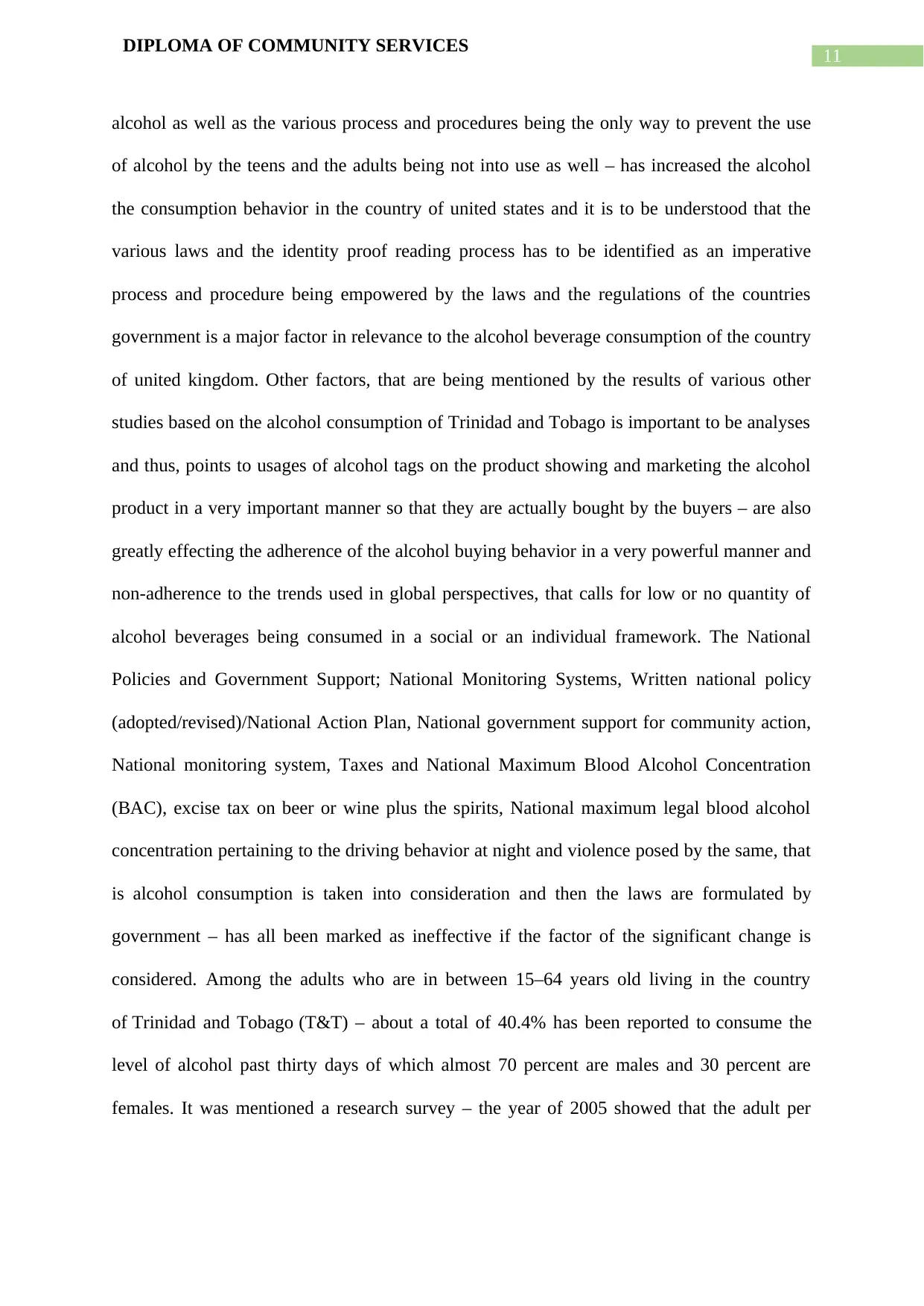
11
DIPLOMA OF COMMUNITY SERVICES
alcohol as well as the various process and procedures being the only way to prevent the use
of alcohol by the teens and the adults being not into use as well – has increased the alcohol
the consumption behavior in the country of united states and it is to be understood that the
various laws and the identity proof reading process has to be identified as an imperative
process and procedure being empowered by the laws and the regulations of the countries
government is a major factor in relevance to the alcohol beverage consumption of the country
of united kingdom. Other factors, that are being mentioned by the results of various other
studies based on the alcohol consumption of Trinidad and Tobago is important to be analyses
and thus, points to usages of alcohol tags on the product showing and marketing the alcohol
product in a very important manner so that they are actually bought by the buyers – are also
greatly effecting the adherence of the alcohol buying behavior in a very powerful manner and
non-adherence to the trends used in global perspectives, that calls for low or no quantity of
alcohol beverages being consumed in a social or an individual framework. The National
Policies and Government Support; National Monitoring Systems, Written national policy
(adopted/revised)/National Action Plan, National government support for community action,
National monitoring system, Taxes and National Maximum Blood Alcohol Concentration
(BAC), excise tax on beer or wine plus the spirits, National maximum legal blood alcohol
concentration pertaining to the driving behavior at night and violence posed by the same, that
is alcohol consumption is taken into consideration and then the laws are formulated by
government – has all been marked as ineffective if the factor of the significant change is
considered. Among the adults who are in between 15–64 years old living in the country
of Trinidad and Tobago (T&T) – about a total of 40.4% has been reported to consume the
level of alcohol past thirty days of which almost 70 percent are males and 30 percent are
females. It was mentioned a research survey – the year of 2005 showed that the adult per
DIPLOMA OF COMMUNITY SERVICES
alcohol as well as the various process and procedures being the only way to prevent the use
of alcohol by the teens and the adults being not into use as well – has increased the alcohol
the consumption behavior in the country of united states and it is to be understood that the
various laws and the identity proof reading process has to be identified as an imperative
process and procedure being empowered by the laws and the regulations of the countries
government is a major factor in relevance to the alcohol beverage consumption of the country
of united kingdom. Other factors, that are being mentioned by the results of various other
studies based on the alcohol consumption of Trinidad and Tobago is important to be analyses
and thus, points to usages of alcohol tags on the product showing and marketing the alcohol
product in a very important manner so that they are actually bought by the buyers – are also
greatly effecting the adherence of the alcohol buying behavior in a very powerful manner and
non-adherence to the trends used in global perspectives, that calls for low or no quantity of
alcohol beverages being consumed in a social or an individual framework. The National
Policies and Government Support; National Monitoring Systems, Written national policy
(adopted/revised)/National Action Plan, National government support for community action,
National monitoring system, Taxes and National Maximum Blood Alcohol Concentration
(BAC), excise tax on beer or wine plus the spirits, National maximum legal blood alcohol
concentration pertaining to the driving behavior at night and violence posed by the same, that
is alcohol consumption is taken into consideration and then the laws are formulated by
government – has all been marked as ineffective if the factor of the significant change is
considered. Among the adults who are in between 15–64 years old living in the country
of Trinidad and Tobago (T&T) – about a total of 40.4% has been reported to consume the
level of alcohol past thirty days of which almost 70 percent are males and 30 percent are
females. It was mentioned a research survey – the year of 2005 showed that the adult per
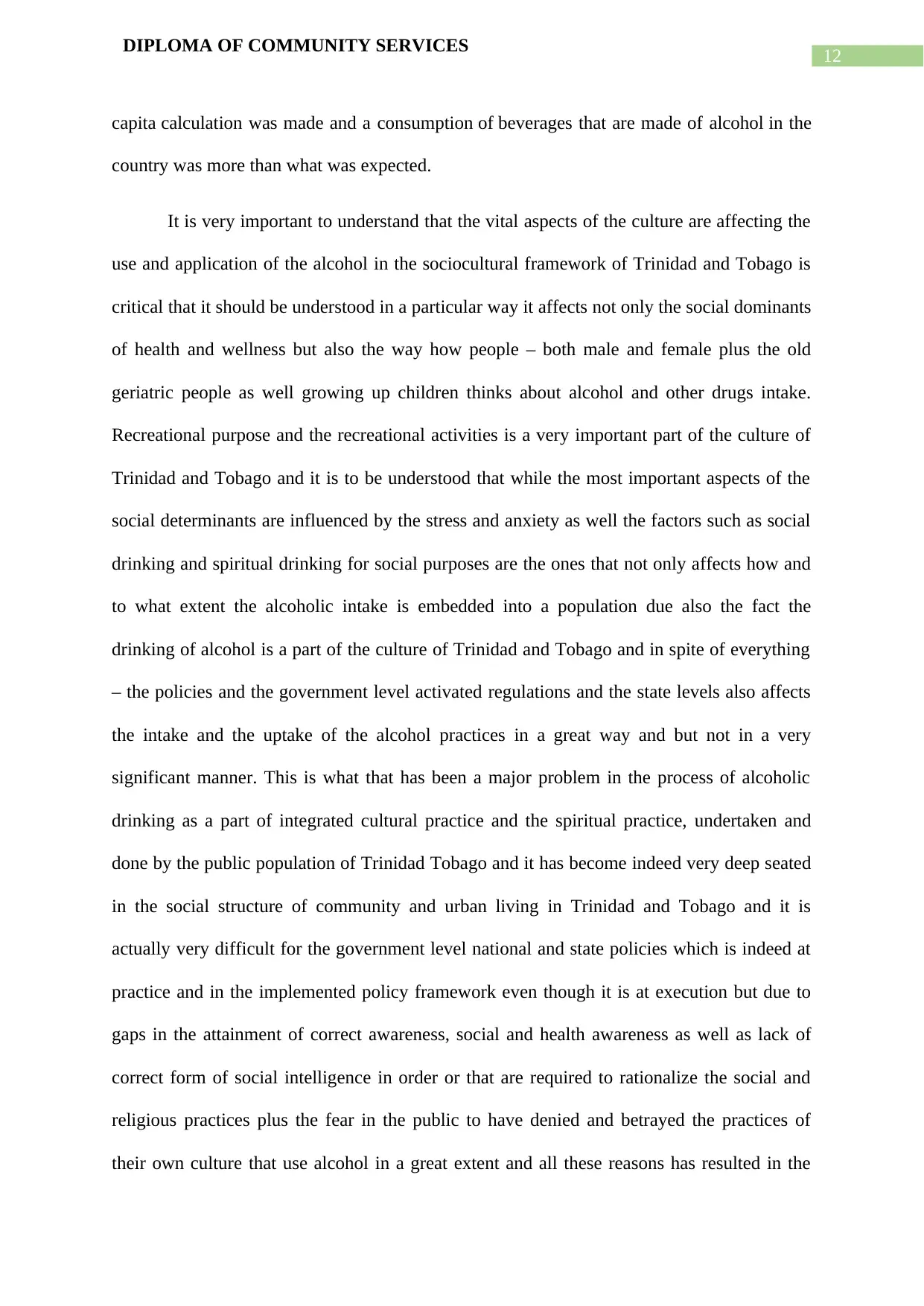
12
DIPLOMA OF COMMUNITY SERVICES
capita calculation was made and a consumption of beverages that are made of alcohol in the
country was more than what was expected.
It is very important to understand that the vital aspects of the culture are affecting the
use and application of the alcohol in the sociocultural framework of Trinidad and Tobago is
critical that it should be understood in a particular way it affects not only the social dominants
of health and wellness but also the way how people – both male and female plus the old
geriatric people as well growing up children thinks about alcohol and other drugs intake.
Recreational purpose and the recreational activities is a very important part of the culture of
Trinidad and Tobago and it is to be understood that while the most important aspects of the
social determinants are influenced by the stress and anxiety as well the factors such as social
drinking and spiritual drinking for social purposes are the ones that not only affects how and
to what extent the alcoholic intake is embedded into a population due also the fact the
drinking of alcohol is a part of the culture of Trinidad and Tobago and in spite of everything
– the policies and the government level activated regulations and the state levels also affects
the intake and the uptake of the alcohol practices in a great way and but not in a very
significant manner. This is what that has been a major problem in the process of alcoholic
drinking as a part of integrated cultural practice and the spiritual practice, undertaken and
done by the public population of Trinidad Tobago and it has become indeed very deep seated
in the social structure of community and urban living in Trinidad and Tobago and it is
actually very difficult for the government level national and state policies which is indeed at
practice and in the implemented policy framework even though it is at execution but due to
gaps in the attainment of correct awareness, social and health awareness as well as lack of
correct form of social intelligence in order or that are required to rationalize the social and
religious practices plus the fear in the public to have denied and betrayed the practices of
their own culture that use alcohol in a great extent and all these reasons has resulted in the
DIPLOMA OF COMMUNITY SERVICES
capita calculation was made and a consumption of beverages that are made of alcohol in the
country was more than what was expected.
It is very important to understand that the vital aspects of the culture are affecting the
use and application of the alcohol in the sociocultural framework of Trinidad and Tobago is
critical that it should be understood in a particular way it affects not only the social dominants
of health and wellness but also the way how people – both male and female plus the old
geriatric people as well growing up children thinks about alcohol and other drugs intake.
Recreational purpose and the recreational activities is a very important part of the culture of
Trinidad and Tobago and it is to be understood that while the most important aspects of the
social determinants are influenced by the stress and anxiety as well the factors such as social
drinking and spiritual drinking for social purposes are the ones that not only affects how and
to what extent the alcoholic intake is embedded into a population due also the fact the
drinking of alcohol is a part of the culture of Trinidad and Tobago and in spite of everything
– the policies and the government level activated regulations and the state levels also affects
the intake and the uptake of the alcohol practices in a great way and but not in a very
significant manner. This is what that has been a major problem in the process of alcoholic
drinking as a part of integrated cultural practice and the spiritual practice, undertaken and
done by the public population of Trinidad Tobago and it has become indeed very deep seated
in the social structure of community and urban living in Trinidad and Tobago and it is
actually very difficult for the government level national and state policies which is indeed at
practice and in the implemented policy framework even though it is at execution but due to
gaps in the attainment of correct awareness, social and health awareness as well as lack of
correct form of social intelligence in order or that are required to rationalize the social and
religious practices plus the fear in the public to have denied and betrayed the practices of
their own culture that use alcohol in a great extent and all these reasons has resulted in the
Paraphrase This Document
Need a fresh take? Get an instant paraphrase of this document with our AI Paraphraser
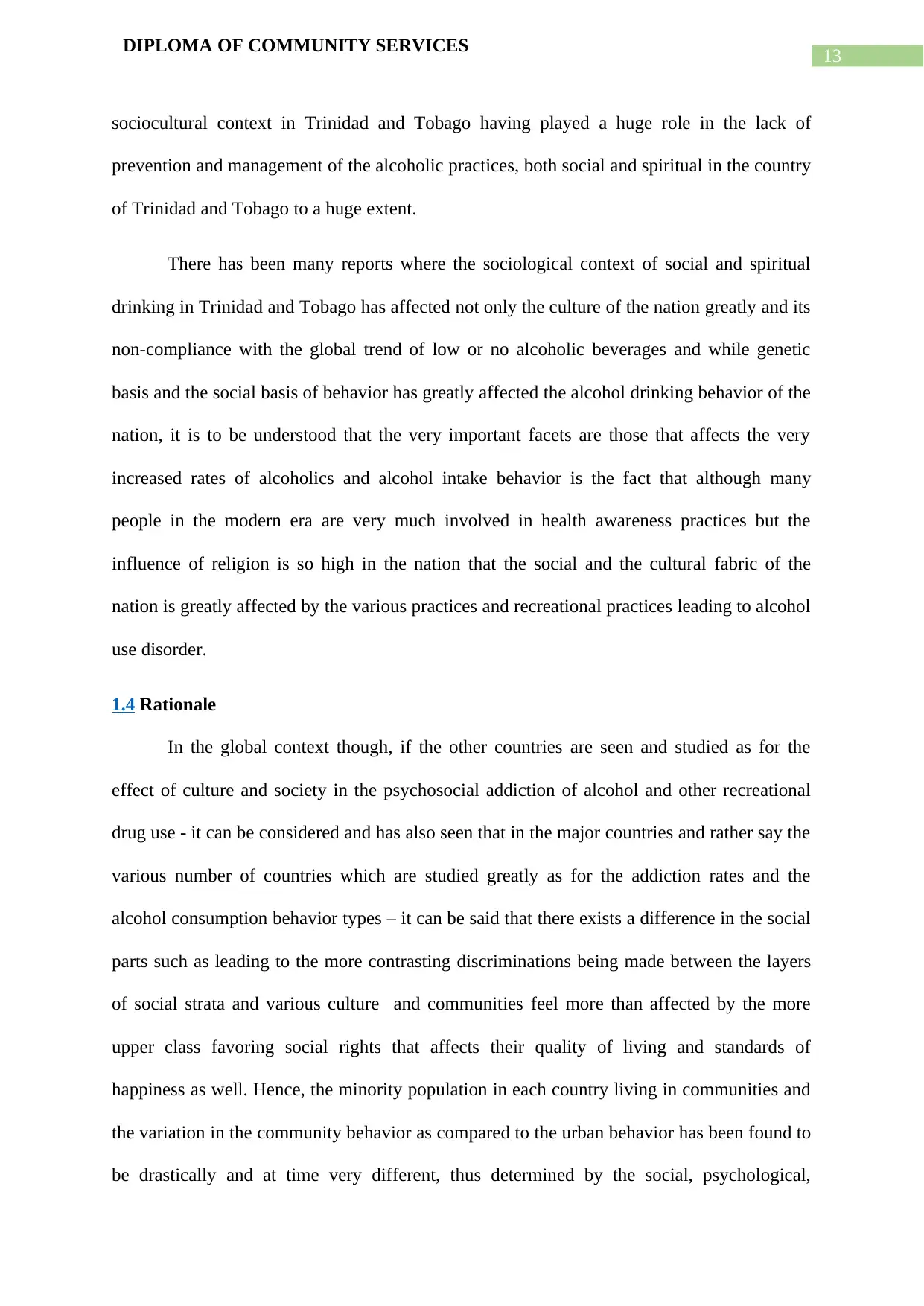
13
DIPLOMA OF COMMUNITY SERVICES
sociocultural context in Trinidad and Tobago having played a huge role in the lack of
prevention and management of the alcoholic practices, both social and spiritual in the country
of Trinidad and Tobago to a huge extent.
There has been many reports where the sociological context of social and spiritual
drinking in Trinidad and Tobago has affected not only the culture of the nation greatly and its
non-compliance with the global trend of low or no alcoholic beverages and while genetic
basis and the social basis of behavior has greatly affected the alcohol drinking behavior of the
nation, it is to be understood that the very important facets are those that affects the very
increased rates of alcoholics and alcohol intake behavior is the fact that although many
people in the modern era are very much involved in health awareness practices but the
influence of religion is so high in the nation that the social and the cultural fabric of the
nation is greatly affected by the various practices and recreational practices leading to alcohol
use disorder.
1.4 Rationale
In the global context though, if the other countries are seen and studied as for the
effect of culture and society in the psychosocial addiction of alcohol and other recreational
drug use - it can be considered and has also seen that in the major countries and rather say the
various number of countries which are studied greatly as for the addiction rates and the
alcohol consumption behavior types – it can be said that there exists a difference in the social
parts such as leading to the more contrasting discriminations being made between the layers
of social strata and various culture and communities feel more than affected by the more
upper class favoring social rights that affects their quality of living and standards of
happiness as well. Hence, the minority population in each country living in communities and
the variation in the community behavior as compared to the urban behavior has been found to
be drastically and at time very different, thus determined by the social, psychological,
DIPLOMA OF COMMUNITY SERVICES
sociocultural context in Trinidad and Tobago having played a huge role in the lack of
prevention and management of the alcoholic practices, both social and spiritual in the country
of Trinidad and Tobago to a huge extent.
There has been many reports where the sociological context of social and spiritual
drinking in Trinidad and Tobago has affected not only the culture of the nation greatly and its
non-compliance with the global trend of low or no alcoholic beverages and while genetic
basis and the social basis of behavior has greatly affected the alcohol drinking behavior of the
nation, it is to be understood that the very important facets are those that affects the very
increased rates of alcoholics and alcohol intake behavior is the fact that although many
people in the modern era are very much involved in health awareness practices but the
influence of religion is so high in the nation that the social and the cultural fabric of the
nation is greatly affected by the various practices and recreational practices leading to alcohol
use disorder.
1.4 Rationale
In the global context though, if the other countries are seen and studied as for the
effect of culture and society in the psychosocial addiction of alcohol and other recreational
drug use - it can be considered and has also seen that in the major countries and rather say the
various number of countries which are studied greatly as for the addiction rates and the
alcohol consumption behavior types – it can be said that there exists a difference in the social
parts such as leading to the more contrasting discriminations being made between the layers
of social strata and various culture and communities feel more than affected by the more
upper class favoring social rights that affects their quality of living and standards of
happiness as well. Hence, the minority population in each country living in communities and
the variation in the community behavior as compared to the urban behavior has been found to
be drastically and at time very different, thus determined by the social, psychological,
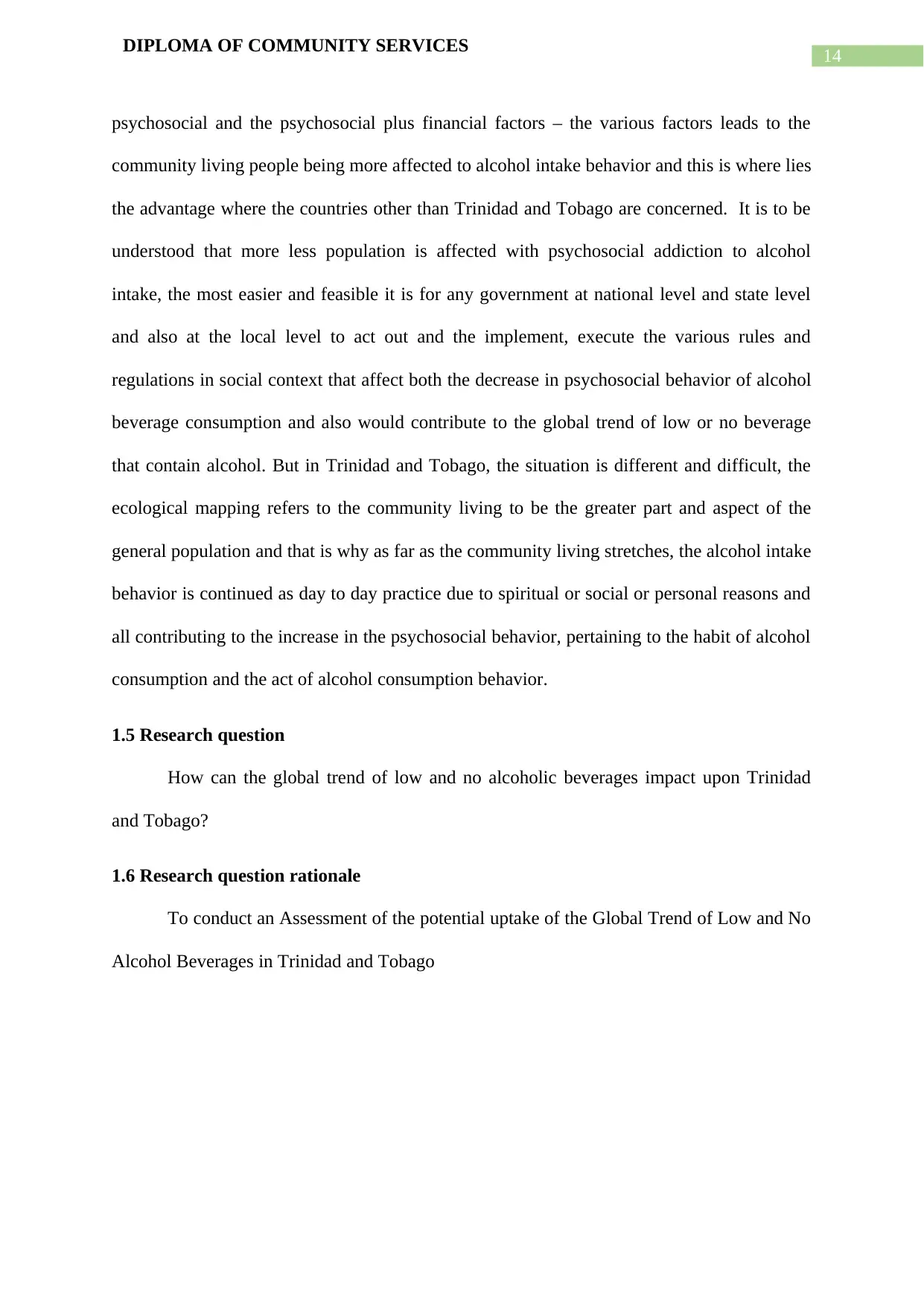
14
DIPLOMA OF COMMUNITY SERVICES
psychosocial and the psychosocial plus financial factors – the various factors leads to the
community living people being more affected to alcohol intake behavior and this is where lies
the advantage where the countries other than Trinidad and Tobago are concerned. It is to be
understood that more less population is affected with psychosocial addiction to alcohol
intake, the most easier and feasible it is for any government at national level and state level
and also at the local level to act out and the implement, execute the various rules and
regulations in social context that affect both the decrease in psychosocial behavior of alcohol
beverage consumption and also would contribute to the global trend of low or no beverage
that contain alcohol. But in Trinidad and Tobago, the situation is different and difficult, the
ecological mapping refers to the community living to be the greater part and aspect of the
general population and that is why as far as the community living stretches, the alcohol intake
behavior is continued as day to day practice due to spiritual or social or personal reasons and
all contributing to the increase in the psychosocial behavior, pertaining to the habit of alcohol
consumption and the act of alcohol consumption behavior.
1.5 Research question
How can the global trend of low and no alcoholic beverages impact upon Trinidad
and Tobago?
1.6 Research question rationale
To conduct an Assessment of the potential uptake of the Global Trend of Low and No
Alcohol Beverages in Trinidad and Tobago
DIPLOMA OF COMMUNITY SERVICES
psychosocial and the psychosocial plus financial factors – the various factors leads to the
community living people being more affected to alcohol intake behavior and this is where lies
the advantage where the countries other than Trinidad and Tobago are concerned. It is to be
understood that more less population is affected with psychosocial addiction to alcohol
intake, the most easier and feasible it is for any government at national level and state level
and also at the local level to act out and the implement, execute the various rules and
regulations in social context that affect both the decrease in psychosocial behavior of alcohol
beverage consumption and also would contribute to the global trend of low or no beverage
that contain alcohol. But in Trinidad and Tobago, the situation is different and difficult, the
ecological mapping refers to the community living to be the greater part and aspect of the
general population and that is why as far as the community living stretches, the alcohol intake
behavior is continued as day to day practice due to spiritual or social or personal reasons and
all contributing to the increase in the psychosocial behavior, pertaining to the habit of alcohol
consumption and the act of alcohol consumption behavior.
1.5 Research question
How can the global trend of low and no alcoholic beverages impact upon Trinidad
and Tobago?
1.6 Research question rationale
To conduct an Assessment of the potential uptake of the Global Trend of Low and No
Alcohol Beverages in Trinidad and Tobago
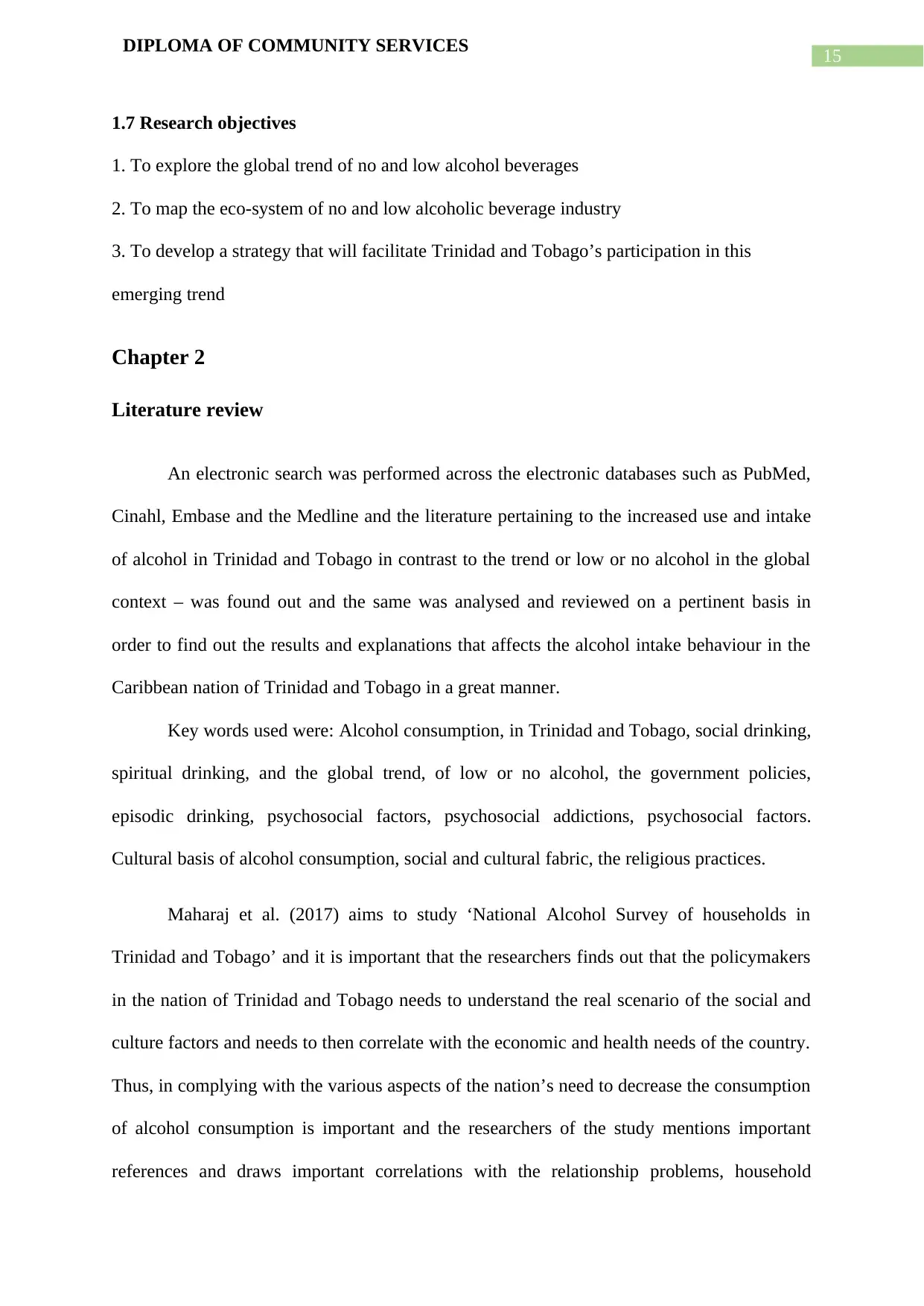
15
DIPLOMA OF COMMUNITY SERVICES
1.7 Research objectives
1. To explore the global trend of no and low alcohol beverages
2. To map the eco-system of no and low alcoholic beverage industry
3. To develop a strategy that will facilitate Trinidad and Tobago’s participation in this
emerging trend
Chapter 2
Literature review
An electronic search was performed across the electronic databases such as PubMed,
Cinahl, Embase and the Medline and the literature pertaining to the increased use and intake
of alcohol in Trinidad and Tobago in contrast to the trend or low or no alcohol in the global
context – was found out and the same was analysed and reviewed on a pertinent basis in
order to find out the results and explanations that affects the alcohol intake behaviour in the
Caribbean nation of Trinidad and Tobago in a great manner.
Key words used were: Alcohol consumption, in Trinidad and Tobago, social drinking,
spiritual drinking, and the global trend, of low or no alcohol, the government policies,
episodic drinking, psychosocial factors, psychosocial addictions, psychosocial factors.
Cultural basis of alcohol consumption, social and cultural fabric, the religious practices.
Maharaj et al. (2017) aims to study ‘National Alcohol Survey of households in
Trinidad and Tobago’ and it is important that the researchers finds out that the policymakers
in the nation of Trinidad and Tobago needs to understand the real scenario of the social and
culture factors and needs to then correlate with the economic and health needs of the country.
Thus, in complying with the various aspects of the nation’s need to decrease the consumption
of alcohol consumption is important and the researchers of the study mentions important
references and draws important correlations with the relationship problems, household
DIPLOMA OF COMMUNITY SERVICES
1.7 Research objectives
1. To explore the global trend of no and low alcohol beverages
2. To map the eco-system of no and low alcoholic beverage industry
3. To develop a strategy that will facilitate Trinidad and Tobago’s participation in this
emerging trend
Chapter 2
Literature review
An electronic search was performed across the electronic databases such as PubMed,
Cinahl, Embase and the Medline and the literature pertaining to the increased use and intake
of alcohol in Trinidad and Tobago in contrast to the trend or low or no alcohol in the global
context – was found out and the same was analysed and reviewed on a pertinent basis in
order to find out the results and explanations that affects the alcohol intake behaviour in the
Caribbean nation of Trinidad and Tobago in a great manner.
Key words used were: Alcohol consumption, in Trinidad and Tobago, social drinking,
spiritual drinking, and the global trend, of low or no alcohol, the government policies,
episodic drinking, psychosocial factors, psychosocial addictions, psychosocial factors.
Cultural basis of alcohol consumption, social and cultural fabric, the religious practices.
Maharaj et al. (2017) aims to study ‘National Alcohol Survey of households in
Trinidad and Tobago’ and it is important that the researchers finds out that the policymakers
in the nation of Trinidad and Tobago needs to understand the real scenario of the social and
culture factors and needs to then correlate with the economic and health needs of the country.
Thus, in complying with the various aspects of the nation’s need to decrease the consumption
of alcohol consumption is important and the researchers of the study mentions important
references and draws important correlations with the relationship problems, household
Secure Best Marks with AI Grader
Need help grading? Try our AI Grader for instant feedback on your assignments.
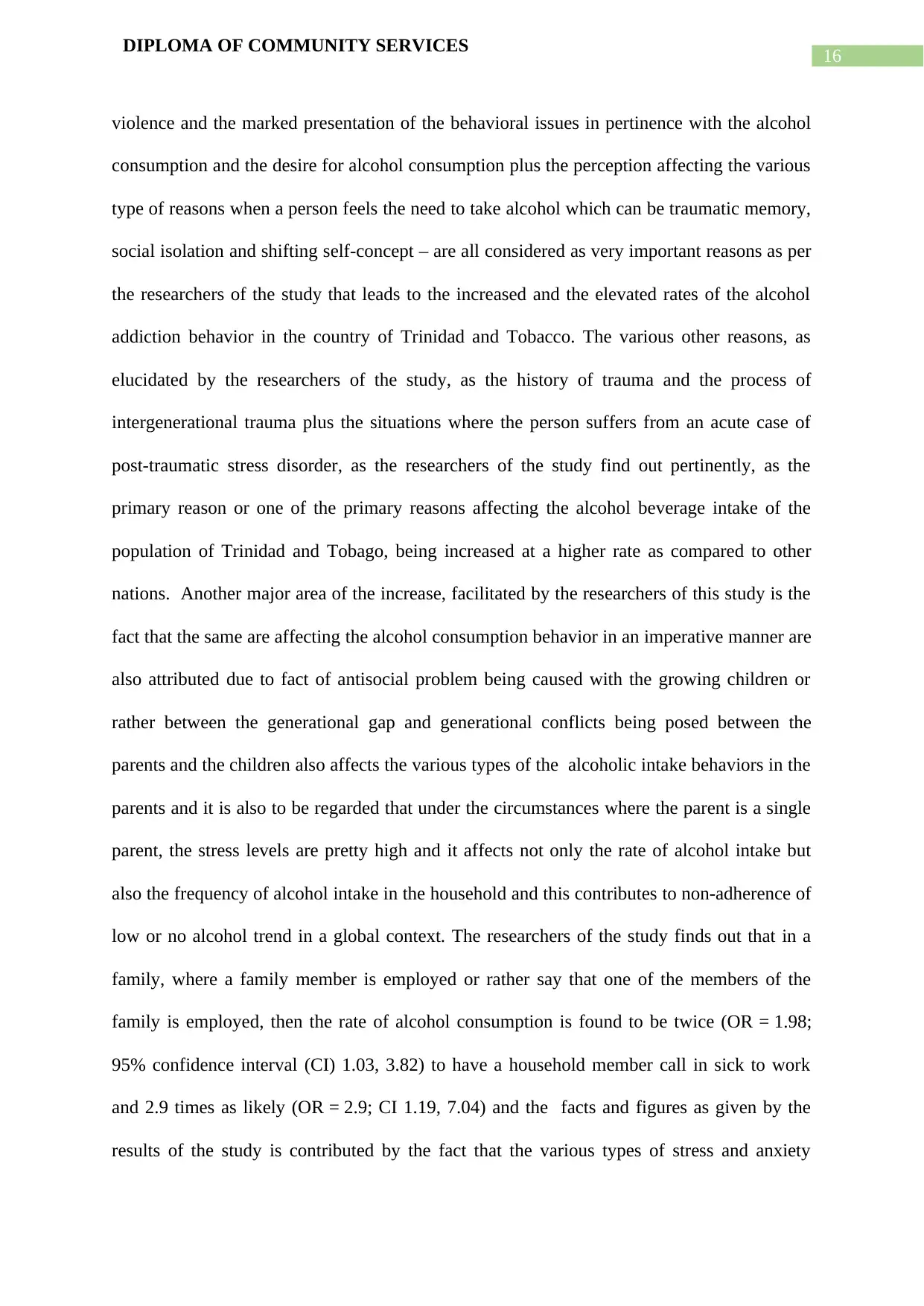
16
DIPLOMA OF COMMUNITY SERVICES
violence and the marked presentation of the behavioral issues in pertinence with the alcohol
consumption and the desire for alcohol consumption plus the perception affecting the various
type of reasons when a person feels the need to take alcohol which can be traumatic memory,
social isolation and shifting self-concept – are all considered as very important reasons as per
the researchers of the study that leads to the increased and the elevated rates of the alcohol
addiction behavior in the country of Trinidad and Tobacco. The various other reasons, as
elucidated by the researchers of the study, as the history of trauma and the process of
intergenerational trauma plus the situations where the person suffers from an acute case of
post-traumatic stress disorder, as the researchers of the study find out pertinently, as the
primary reason or one of the primary reasons affecting the alcohol beverage intake of the
population of Trinidad and Tobago, being increased at a higher rate as compared to other
nations. Another major area of the increase, facilitated by the researchers of this study is the
fact that the same are affecting the alcohol consumption behavior in an imperative manner are
also attributed due to fact of antisocial problem being caused with the growing children or
rather between the generational gap and generational conflicts being posed between the
parents and the children also affects the various types of the alcoholic intake behaviors in the
parents and it is also to be regarded that under the circumstances where the parent is a single
parent, the stress levels are pretty high and it affects not only the rate of alcohol intake but
also the frequency of alcohol intake in the household and this contributes to non-adherence of
low or no alcohol trend in a global context. The researchers of the study finds out that in a
family, where a family member is employed or rather say that one of the members of the
family is employed, then the rate of alcohol consumption is found to be twice (OR = 1.98;
95% confidence interval (CI) 1.03, 3.82) to have a household member call in sick to work
and 2.9 times as likely (OR = 2.9; CI 1.19, 7.04) and the facts and figures as given by the
results of the study is contributed by the fact that the various types of stress and anxiety
DIPLOMA OF COMMUNITY SERVICES
violence and the marked presentation of the behavioral issues in pertinence with the alcohol
consumption and the desire for alcohol consumption plus the perception affecting the various
type of reasons when a person feels the need to take alcohol which can be traumatic memory,
social isolation and shifting self-concept – are all considered as very important reasons as per
the researchers of the study that leads to the increased and the elevated rates of the alcohol
addiction behavior in the country of Trinidad and Tobacco. The various other reasons, as
elucidated by the researchers of the study, as the history of trauma and the process of
intergenerational trauma plus the situations where the person suffers from an acute case of
post-traumatic stress disorder, as the researchers of the study find out pertinently, as the
primary reason or one of the primary reasons affecting the alcohol beverage intake of the
population of Trinidad and Tobago, being increased at a higher rate as compared to other
nations. Another major area of the increase, facilitated by the researchers of this study is the
fact that the same are affecting the alcohol consumption behavior in an imperative manner are
also attributed due to fact of antisocial problem being caused with the growing children or
rather between the generational gap and generational conflicts being posed between the
parents and the children also affects the various types of the alcoholic intake behaviors in the
parents and it is also to be regarded that under the circumstances where the parent is a single
parent, the stress levels are pretty high and it affects not only the rate of alcohol intake but
also the frequency of alcohol intake in the household and this contributes to non-adherence of
low or no alcohol trend in a global context. The researchers of the study finds out that in a
family, where a family member is employed or rather say that one of the members of the
family is employed, then the rate of alcohol consumption is found to be twice (OR = 1.98;
95% confidence interval (CI) 1.03, 3.82) to have a household member call in sick to work
and 2.9 times as likely (OR = 2.9; CI 1.19, 7.04) and the facts and figures as given by the
results of the study is contributed by the fact that the various types of stress and anxiety
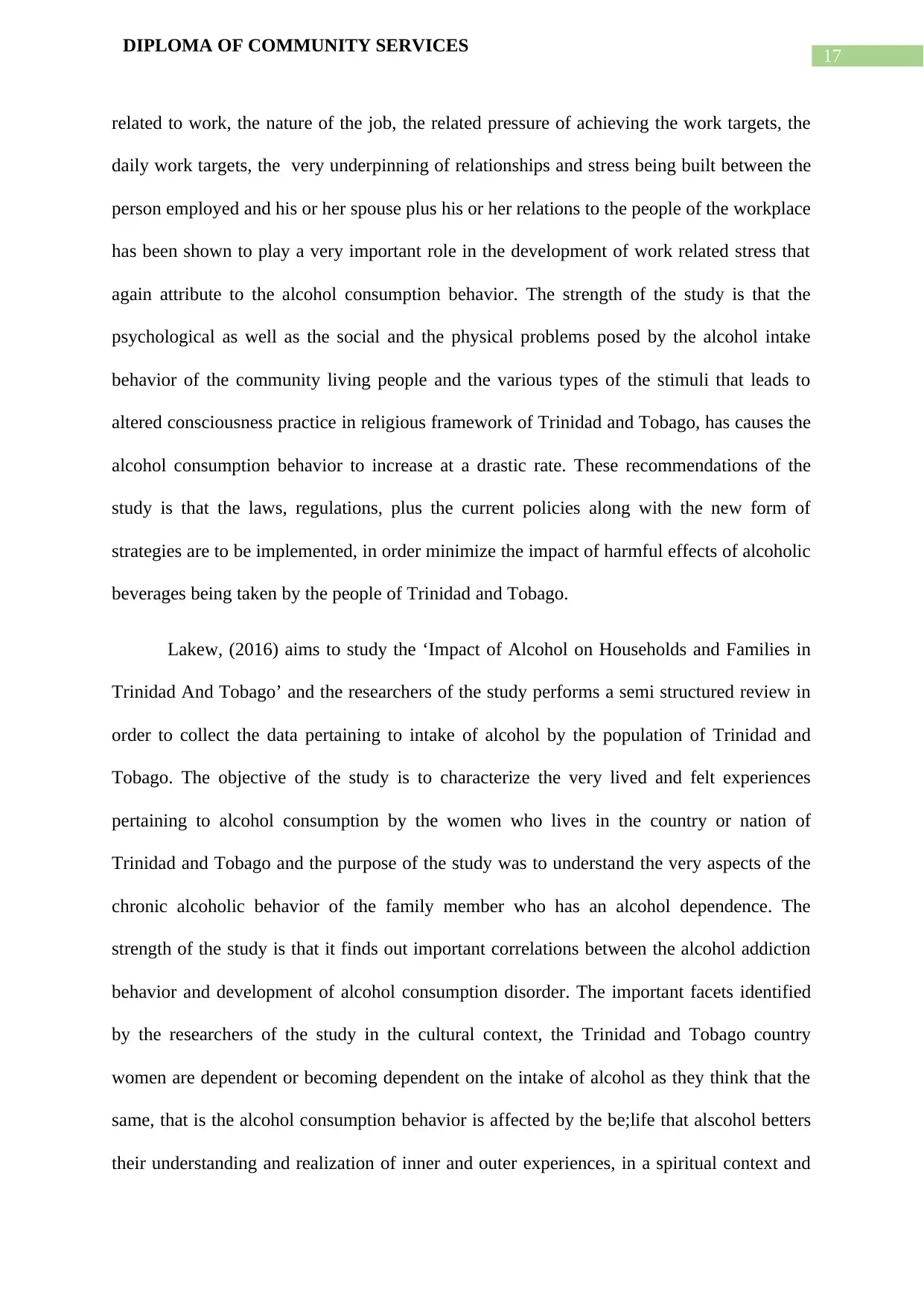
17
DIPLOMA OF COMMUNITY SERVICES
related to work, the nature of the job, the related pressure of achieving the work targets, the
daily work targets, the very underpinning of relationships and stress being built between the
person employed and his or her spouse plus his or her relations to the people of the workplace
has been shown to play a very important role in the development of work related stress that
again attribute to the alcohol consumption behavior. The strength of the study is that the
psychological as well as the social and the physical problems posed by the alcohol intake
behavior of the community living people and the various types of the stimuli that leads to
altered consciousness practice in religious framework of Trinidad and Tobago, has causes the
alcohol consumption behavior to increase at a drastic rate. These recommendations of the
study is that the laws, regulations, plus the current policies along with the new form of
strategies are to be implemented, in order minimize the impact of harmful effects of alcoholic
beverages being taken by the people of Trinidad and Tobago.
Lakew, (2016) aims to study the ‘Impact of Alcohol on Households and Families in
Trinidad And Tobago’ and the researchers of the study performs a semi structured review in
order to collect the data pertaining to intake of alcohol by the population of Trinidad and
Tobago. The objective of the study is to characterize the very lived and felt experiences
pertaining to alcohol consumption by the women who lives in the country or nation of
Trinidad and Tobago and the purpose of the study was to understand the very aspects of the
chronic alcoholic behavior of the family member who has an alcohol dependence. The
strength of the study is that it finds out important correlations between the alcohol addiction
behavior and development of alcohol consumption disorder. The important facets identified
by the researchers of the study in the cultural context, the Trinidad and Tobago country
women are dependent or becoming dependent on the intake of alcohol as they think that the
same, that is the alcohol consumption behavior is affected by the be;life that alscohol betters
their understanding and realization of inner and outer experiences, in a spiritual context and
DIPLOMA OF COMMUNITY SERVICES
related to work, the nature of the job, the related pressure of achieving the work targets, the
daily work targets, the very underpinning of relationships and stress being built between the
person employed and his or her spouse plus his or her relations to the people of the workplace
has been shown to play a very important role in the development of work related stress that
again attribute to the alcohol consumption behavior. The strength of the study is that the
psychological as well as the social and the physical problems posed by the alcohol intake
behavior of the community living people and the various types of the stimuli that leads to
altered consciousness practice in religious framework of Trinidad and Tobago, has causes the
alcohol consumption behavior to increase at a drastic rate. These recommendations of the
study is that the laws, regulations, plus the current policies along with the new form of
strategies are to be implemented, in order minimize the impact of harmful effects of alcoholic
beverages being taken by the people of Trinidad and Tobago.
Lakew, (2016) aims to study the ‘Impact of Alcohol on Households and Families in
Trinidad And Tobago’ and the researchers of the study performs a semi structured review in
order to collect the data pertaining to intake of alcohol by the population of Trinidad and
Tobago. The objective of the study is to characterize the very lived and felt experiences
pertaining to alcohol consumption by the women who lives in the country or nation of
Trinidad and Tobago and the purpose of the study was to understand the very aspects of the
chronic alcoholic behavior of the family member who has an alcohol dependence. The
strength of the study is that it finds out important correlations between the alcohol addiction
behavior and development of alcohol consumption disorder. The important facets identified
by the researchers of the study in the cultural context, the Trinidad and Tobago country
women are dependent or becoming dependent on the intake of alcohol as they think that the
same, that is the alcohol consumption behavior is affected by the be;life that alscohol betters
their understanding and realization of inner and outer experiences, in a spiritual context and
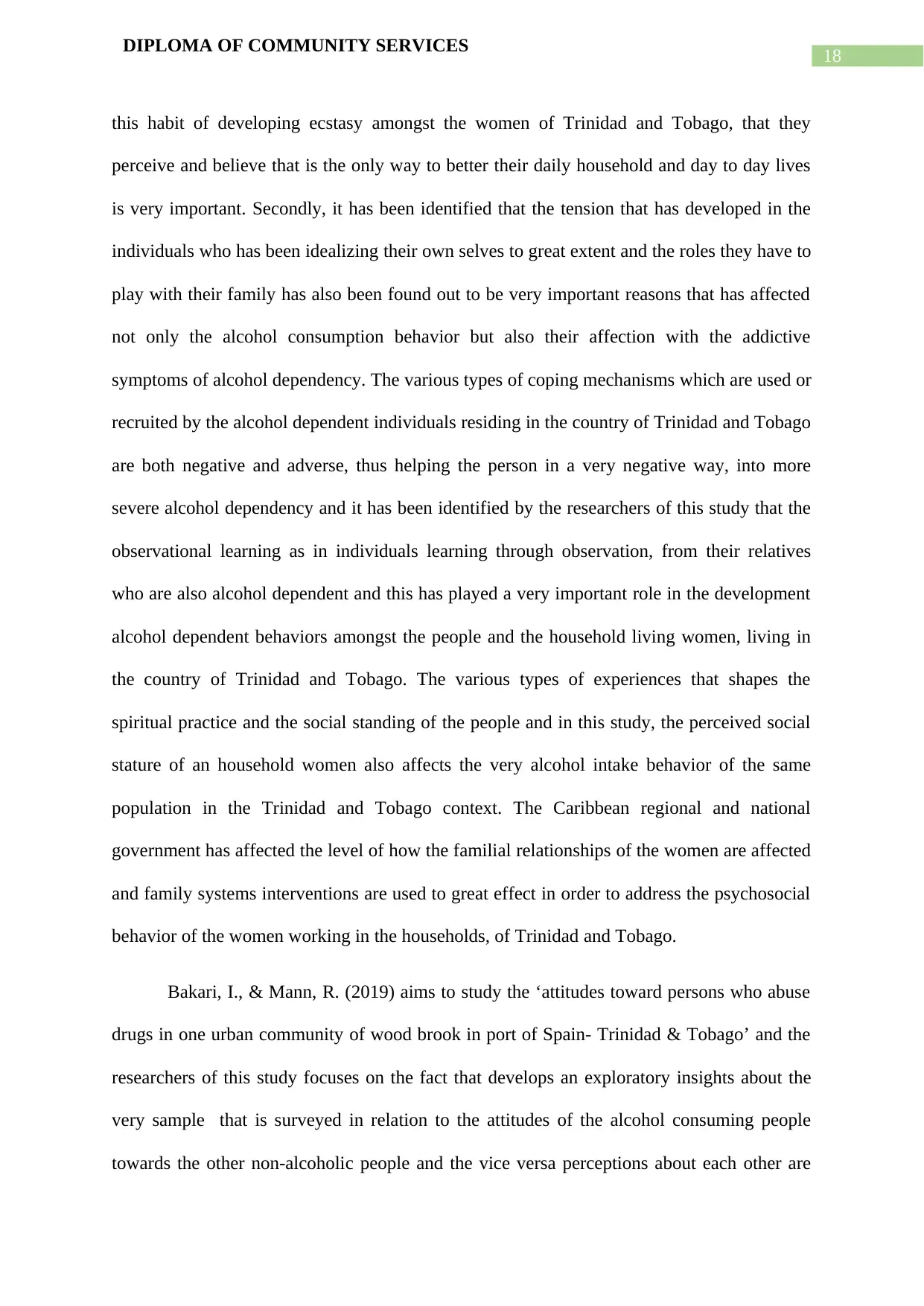
18
DIPLOMA OF COMMUNITY SERVICES
this habit of developing ecstasy amongst the women of Trinidad and Tobago, that they
perceive and believe that is the only way to better their daily household and day to day lives
is very important. Secondly, it has been identified that the tension that has developed in the
individuals who has been idealizing their own selves to great extent and the roles they have to
play with their family has also been found out to be very important reasons that has affected
not only the alcohol consumption behavior but also their affection with the addictive
symptoms of alcohol dependency. The various types of coping mechanisms which are used or
recruited by the alcohol dependent individuals residing in the country of Trinidad and Tobago
are both negative and adverse, thus helping the person in a very negative way, into more
severe alcohol dependency and it has been identified by the researchers of this study that the
observational learning as in individuals learning through observation, from their relatives
who are also alcohol dependent and this has played a very important role in the development
alcohol dependent behaviors amongst the people and the household living women, living in
the country of Trinidad and Tobago. The various types of experiences that shapes the
spiritual practice and the social standing of the people and in this study, the perceived social
stature of an household women also affects the very alcohol intake behavior of the same
population in the Trinidad and Tobago context. The Caribbean regional and national
government has affected the level of how the familial relationships of the women are affected
and family systems interventions are used to great effect in order to address the psychosocial
behavior of the women working in the households, of Trinidad and Tobago.
Bakari, I., & Mann, R. (2019) aims to study the ‘attitudes toward persons who abuse
drugs in one urban community of wood brook in port of Spain- Trinidad & Tobago’ and the
researchers of this study focuses on the fact that develops an exploratory insights about the
very sample that is surveyed in relation to the attitudes of the alcohol consuming people
towards the other non-alcoholic people and the vice versa perceptions about each other are
DIPLOMA OF COMMUNITY SERVICES
this habit of developing ecstasy amongst the women of Trinidad and Tobago, that they
perceive and believe that is the only way to better their daily household and day to day lives
is very important. Secondly, it has been identified that the tension that has developed in the
individuals who has been idealizing their own selves to great extent and the roles they have to
play with their family has also been found out to be very important reasons that has affected
not only the alcohol consumption behavior but also their affection with the addictive
symptoms of alcohol dependency. The various types of coping mechanisms which are used or
recruited by the alcohol dependent individuals residing in the country of Trinidad and Tobago
are both negative and adverse, thus helping the person in a very negative way, into more
severe alcohol dependency and it has been identified by the researchers of this study that the
observational learning as in individuals learning through observation, from their relatives
who are also alcohol dependent and this has played a very important role in the development
alcohol dependent behaviors amongst the people and the household living women, living in
the country of Trinidad and Tobago. The various types of experiences that shapes the
spiritual practice and the social standing of the people and in this study, the perceived social
stature of an household women also affects the very alcohol intake behavior of the same
population in the Trinidad and Tobago context. The Caribbean regional and national
government has affected the level of how the familial relationships of the women are affected
and family systems interventions are used to great effect in order to address the psychosocial
behavior of the women working in the households, of Trinidad and Tobago.
Bakari, I., & Mann, R. (2019) aims to study the ‘attitudes toward persons who abuse
drugs in one urban community of wood brook in port of Spain- Trinidad & Tobago’ and the
researchers of this study focuses on the fact that develops an exploratory insights about the
very sample that is surveyed in relation to the attitudes of the alcohol consuming people
towards the other non-alcoholic people and the vice versa perceptions about each other are
Paraphrase This Document
Need a fresh take? Get an instant paraphrase of this document with our AI Paraphraser
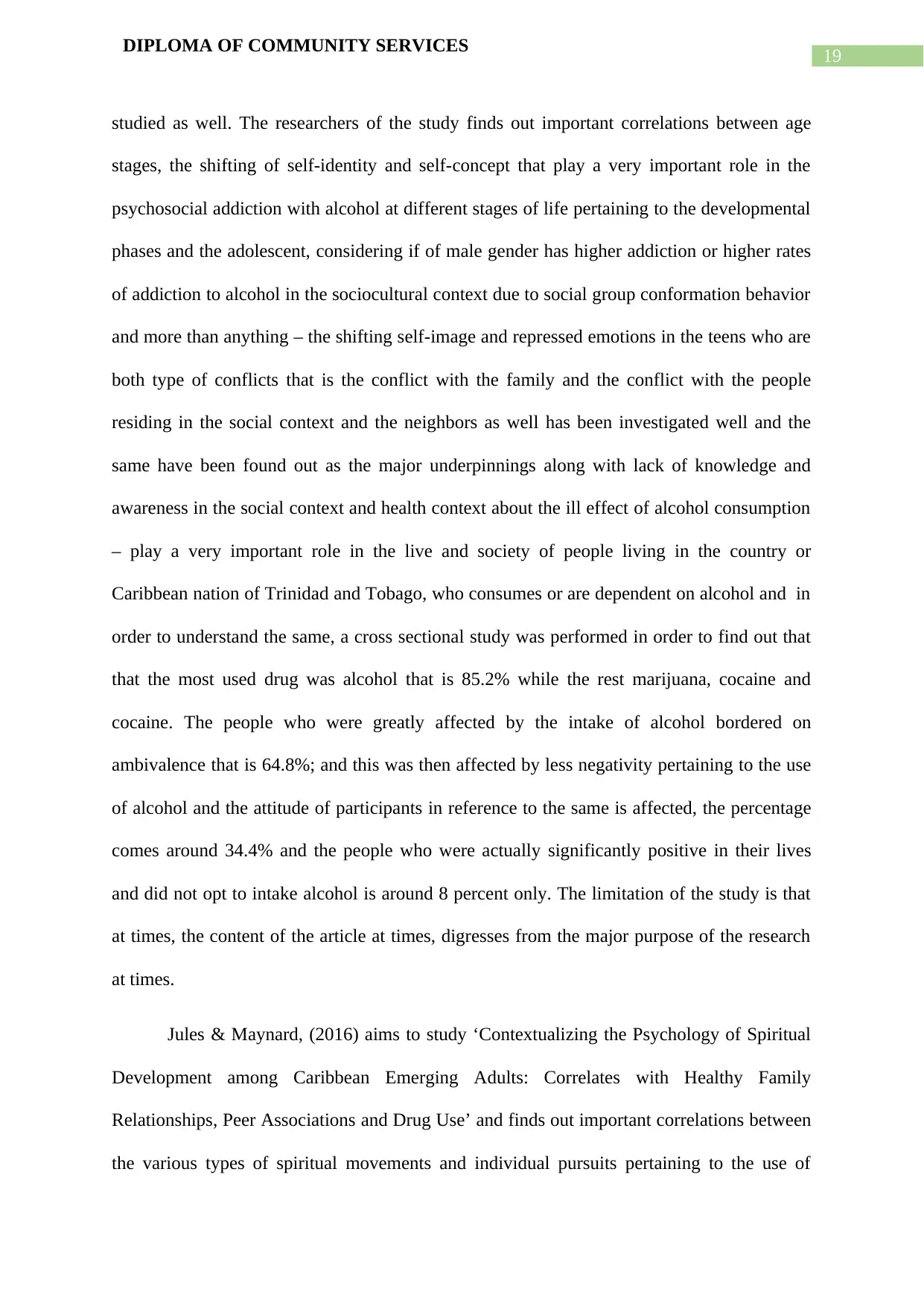
19
DIPLOMA OF COMMUNITY SERVICES
studied as well. The researchers of the study finds out important correlations between age
stages, the shifting of self-identity and self-concept that play a very important role in the
psychosocial addiction with alcohol at different stages of life pertaining to the developmental
phases and the adolescent, considering if of male gender has higher addiction or higher rates
of addiction to alcohol in the sociocultural context due to social group conformation behavior
and more than anything – the shifting self-image and repressed emotions in the teens who are
both type of conflicts that is the conflict with the family and the conflict with the people
residing in the social context and the neighbors as well has been investigated well and the
same have been found out as the major underpinnings along with lack of knowledge and
awareness in the social context and health context about the ill effect of alcohol consumption
– play a very important role in the live and society of people living in the country or
Caribbean nation of Trinidad and Tobago, who consumes or are dependent on alcohol and in
order to understand the same, a cross sectional study was performed in order to find out that
that the most used drug was alcohol that is 85.2% while the rest marijuana, cocaine and
cocaine. The people who were greatly affected by the intake of alcohol bordered on
ambivalence that is 64.8%; and this was then affected by less negativity pertaining to the use
of alcohol and the attitude of participants in reference to the same is affected, the percentage
comes around 34.4% and the people who were actually significantly positive in their lives
and did not opt to intake alcohol is around 8 percent only. The limitation of the study is that
at times, the content of the article at times, digresses from the major purpose of the research
at times.
Jules & Maynard, (2016) aims to study ‘Contextualizing the Psychology of Spiritual
Development among Caribbean Emerging Adults: Correlates with Healthy Family
Relationships, Peer Associations and Drug Use’ and finds out important correlations between
the various types of spiritual movements and individual pursuits pertaining to the use of
DIPLOMA OF COMMUNITY SERVICES
studied as well. The researchers of the study finds out important correlations between age
stages, the shifting of self-identity and self-concept that play a very important role in the
psychosocial addiction with alcohol at different stages of life pertaining to the developmental
phases and the adolescent, considering if of male gender has higher addiction or higher rates
of addiction to alcohol in the sociocultural context due to social group conformation behavior
and more than anything – the shifting self-image and repressed emotions in the teens who are
both type of conflicts that is the conflict with the family and the conflict with the people
residing in the social context and the neighbors as well has been investigated well and the
same have been found out as the major underpinnings along with lack of knowledge and
awareness in the social context and health context about the ill effect of alcohol consumption
– play a very important role in the live and society of people living in the country or
Caribbean nation of Trinidad and Tobago, who consumes or are dependent on alcohol and in
order to understand the same, a cross sectional study was performed in order to find out that
that the most used drug was alcohol that is 85.2% while the rest marijuana, cocaine and
cocaine. The people who were greatly affected by the intake of alcohol bordered on
ambivalence that is 64.8%; and this was then affected by less negativity pertaining to the use
of alcohol and the attitude of participants in reference to the same is affected, the percentage
comes around 34.4% and the people who were actually significantly positive in their lives
and did not opt to intake alcohol is around 8 percent only. The limitation of the study is that
at times, the content of the article at times, digresses from the major purpose of the research
at times.
Jules & Maynard, (2016) aims to study ‘Contextualizing the Psychology of Spiritual
Development among Caribbean Emerging Adults: Correlates with Healthy Family
Relationships, Peer Associations and Drug Use’ and finds out important correlations between
the various types of spiritual movements and individual pursuits pertaining to the use of
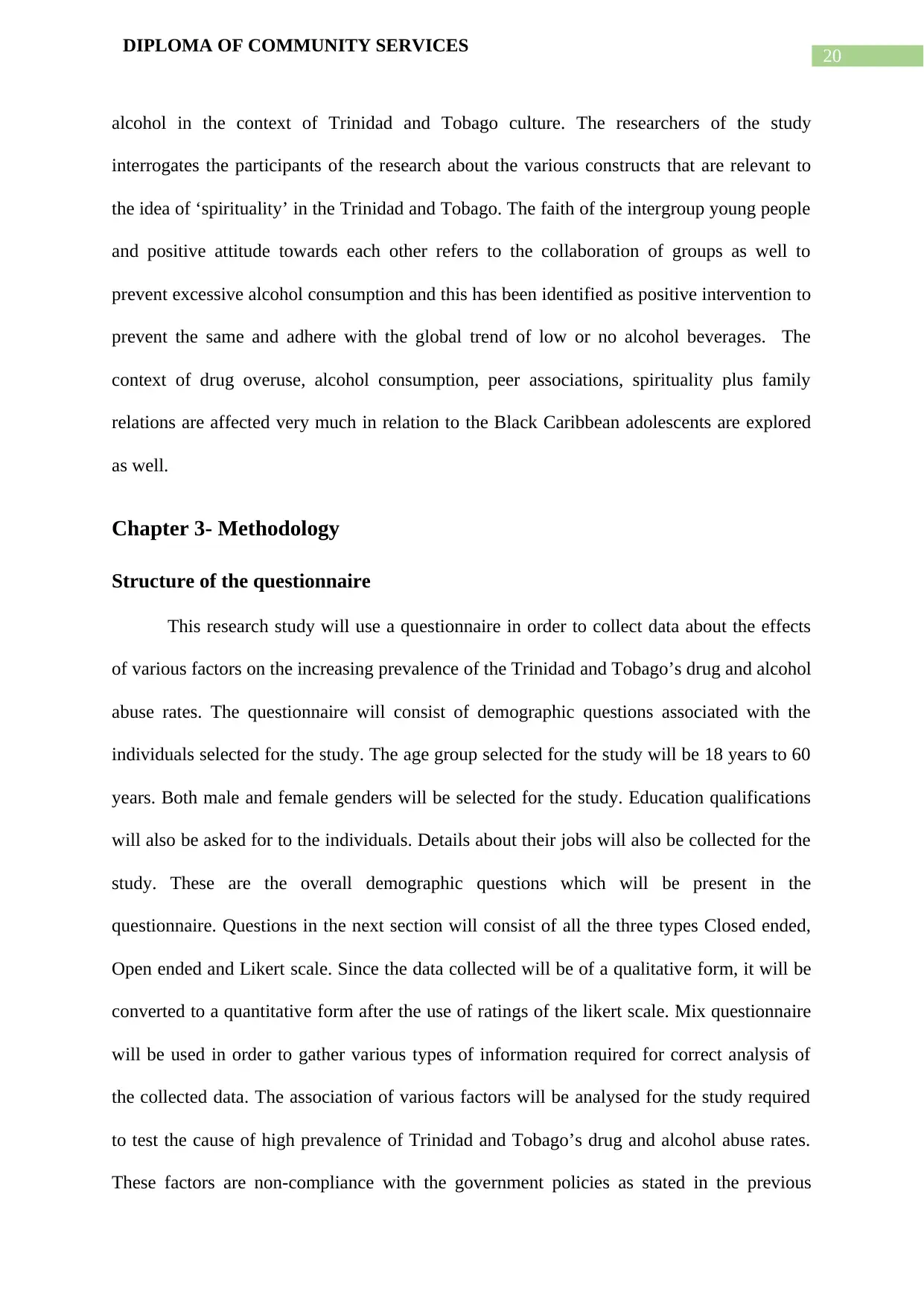
20
DIPLOMA OF COMMUNITY SERVICES
alcohol in the context of Trinidad and Tobago culture. The researchers of the study
interrogates the participants of the research about the various constructs that are relevant to
the idea of ‘spirituality’ in the Trinidad and Tobago. The faith of the intergroup young people
and positive attitude towards each other refers to the collaboration of groups as well to
prevent excessive alcohol consumption and this has been identified as positive intervention to
prevent the same and adhere with the global trend of low or no alcohol beverages. The
context of drug overuse, alcohol consumption, peer associations, spirituality plus family
relations are affected very much in relation to the Black Caribbean adolescents are explored
as well.
Chapter 3- Methodology
Structure of the questionnaire
This research study will use a questionnaire in order to collect data about the effects
of various factors on the increasing prevalence of the Trinidad and Tobago’s drug and alcohol
abuse rates. The questionnaire will consist of demographic questions associated with the
individuals selected for the study. The age group selected for the study will be 18 years to 60
years. Both male and female genders will be selected for the study. Education qualifications
will also be asked for to the individuals. Details about their jobs will also be collected for the
study. These are the overall demographic questions which will be present in the
questionnaire. Questions in the next section will consist of all the three types Closed ended,
Open ended and Likert scale. Since the data collected will be of a qualitative form, it will be
converted to a quantitative form after the use of ratings of the likert scale. Mix questionnaire
will be used in order to gather various types of information required for correct analysis of
the collected data. The association of various factors will be analysed for the study required
to test the cause of high prevalence of Trinidad and Tobago’s drug and alcohol abuse rates.
These factors are non-compliance with the government policies as stated in the previous
DIPLOMA OF COMMUNITY SERVICES
alcohol in the context of Trinidad and Tobago culture. The researchers of the study
interrogates the participants of the research about the various constructs that are relevant to
the idea of ‘spirituality’ in the Trinidad and Tobago. The faith of the intergroup young people
and positive attitude towards each other refers to the collaboration of groups as well to
prevent excessive alcohol consumption and this has been identified as positive intervention to
prevent the same and adhere with the global trend of low or no alcohol beverages. The
context of drug overuse, alcohol consumption, peer associations, spirituality plus family
relations are affected very much in relation to the Black Caribbean adolescents are explored
as well.
Chapter 3- Methodology
Structure of the questionnaire
This research study will use a questionnaire in order to collect data about the effects
of various factors on the increasing prevalence of the Trinidad and Tobago’s drug and alcohol
abuse rates. The questionnaire will consist of demographic questions associated with the
individuals selected for the study. The age group selected for the study will be 18 years to 60
years. Both male and female genders will be selected for the study. Education qualifications
will also be asked for to the individuals. Details about their jobs will also be collected for the
study. These are the overall demographic questions which will be present in the
questionnaire. Questions in the next section will consist of all the three types Closed ended,
Open ended and Likert scale. Since the data collected will be of a qualitative form, it will be
converted to a quantitative form after the use of ratings of the likert scale. Mix questionnaire
will be used in order to gather various types of information required for correct analysis of
the collected data. The association of various factors will be analysed for the study required
to test the cause of high prevalence of Trinidad and Tobago’s drug and alcohol abuse rates.
These factors are non-compliance with the government policies as stated in the previous
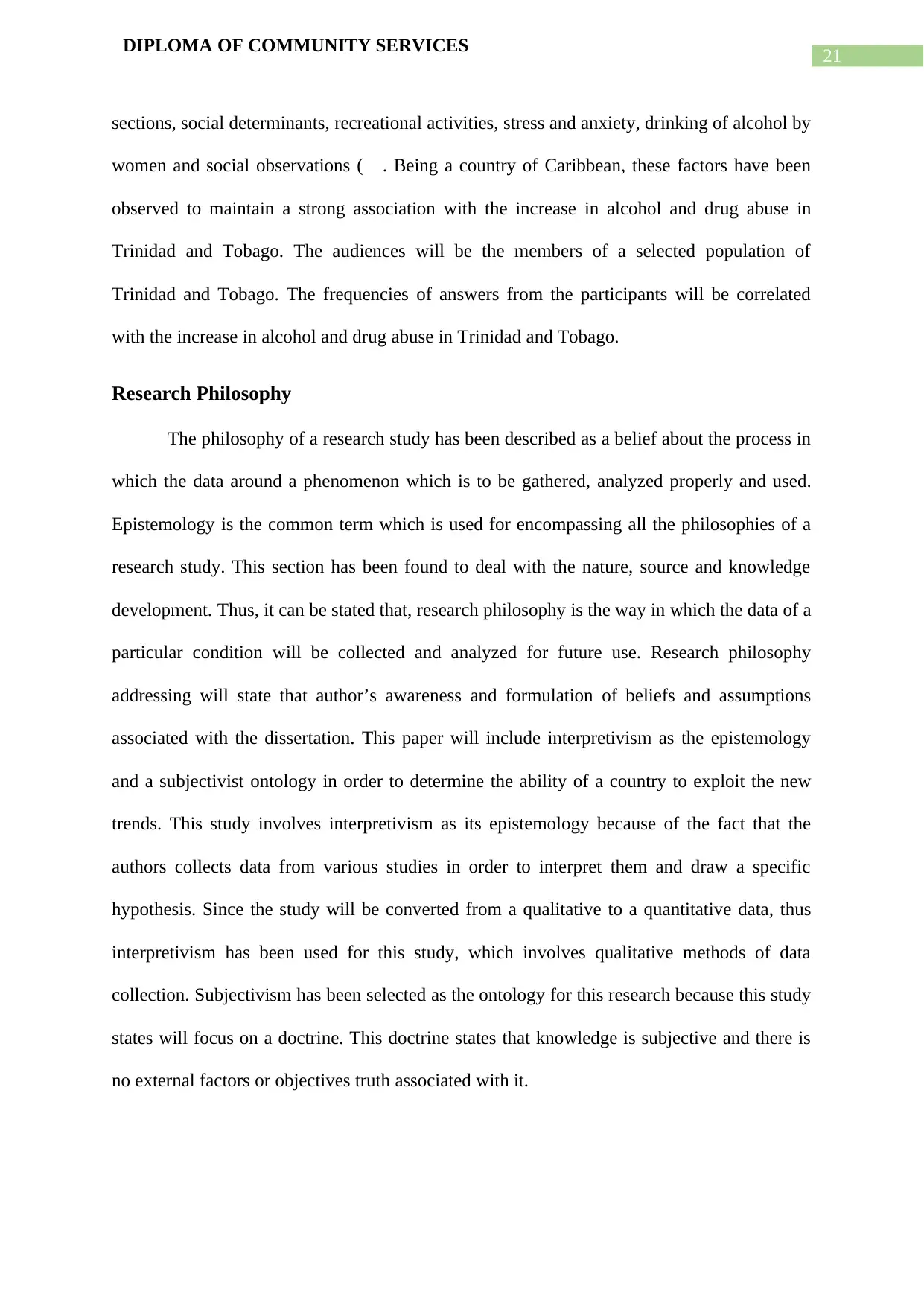
21
DIPLOMA OF COMMUNITY SERVICES
sections, social determinants, recreational activities, stress and anxiety, drinking of alcohol by
women and social observations ( . Being a country of Caribbean, these factors have been
observed to maintain a strong association with the increase in alcohol and drug abuse in
Trinidad and Tobago. The audiences will be the members of a selected population of
Trinidad and Tobago. The frequencies of answers from the participants will be correlated
with the increase in alcohol and drug abuse in Trinidad and Tobago.
Research Philosophy
The philosophy of a research study has been described as a belief about the process in
which the data around a phenomenon which is to be gathered, analyzed properly and used.
Epistemology is the common term which is used for encompassing all the philosophies of a
research study. This section has been found to deal with the nature, source and knowledge
development. Thus, it can be stated that, research philosophy is the way in which the data of a
particular condition will be collected and analyzed for future use. Research philosophy
addressing will state that author’s awareness and formulation of beliefs and assumptions
associated with the dissertation. This paper will include interpretivism as the epistemology
and a subjectivist ontology in order to determine the ability of a country to exploit the new
trends. This study involves interpretivism as its epistemology because of the fact that the
authors collects data from various studies in order to interpret them and draw a specific
hypothesis. Since the study will be converted from a qualitative to a quantitative data, thus
interpretivism has been used for this study, which involves qualitative methods of data
collection. Subjectivism has been selected as the ontology for this research because this study
states will focus on a doctrine. This doctrine states that knowledge is subjective and there is
no external factors or objectives truth associated with it.
DIPLOMA OF COMMUNITY SERVICES
sections, social determinants, recreational activities, stress and anxiety, drinking of alcohol by
women and social observations ( . Being a country of Caribbean, these factors have been
observed to maintain a strong association with the increase in alcohol and drug abuse in
Trinidad and Tobago. The audiences will be the members of a selected population of
Trinidad and Tobago. The frequencies of answers from the participants will be correlated
with the increase in alcohol and drug abuse in Trinidad and Tobago.
Research Philosophy
The philosophy of a research study has been described as a belief about the process in
which the data around a phenomenon which is to be gathered, analyzed properly and used.
Epistemology is the common term which is used for encompassing all the philosophies of a
research study. This section has been found to deal with the nature, source and knowledge
development. Thus, it can be stated that, research philosophy is the way in which the data of a
particular condition will be collected and analyzed for future use. Research philosophy
addressing will state that author’s awareness and formulation of beliefs and assumptions
associated with the dissertation. This paper will include interpretivism as the epistemology
and a subjectivist ontology in order to determine the ability of a country to exploit the new
trends. This study involves interpretivism as its epistemology because of the fact that the
authors collects data from various studies in order to interpret them and draw a specific
hypothesis. Since the study will be converted from a qualitative to a quantitative data, thus
interpretivism has been used for this study, which involves qualitative methods of data
collection. Subjectivism has been selected as the ontology for this research because this study
states will focus on a doctrine. This doctrine states that knowledge is subjective and there is
no external factors or objectives truth associated with it.
Secure Best Marks with AI Grader
Need help grading? Try our AI Grader for instant feedback on your assignments.
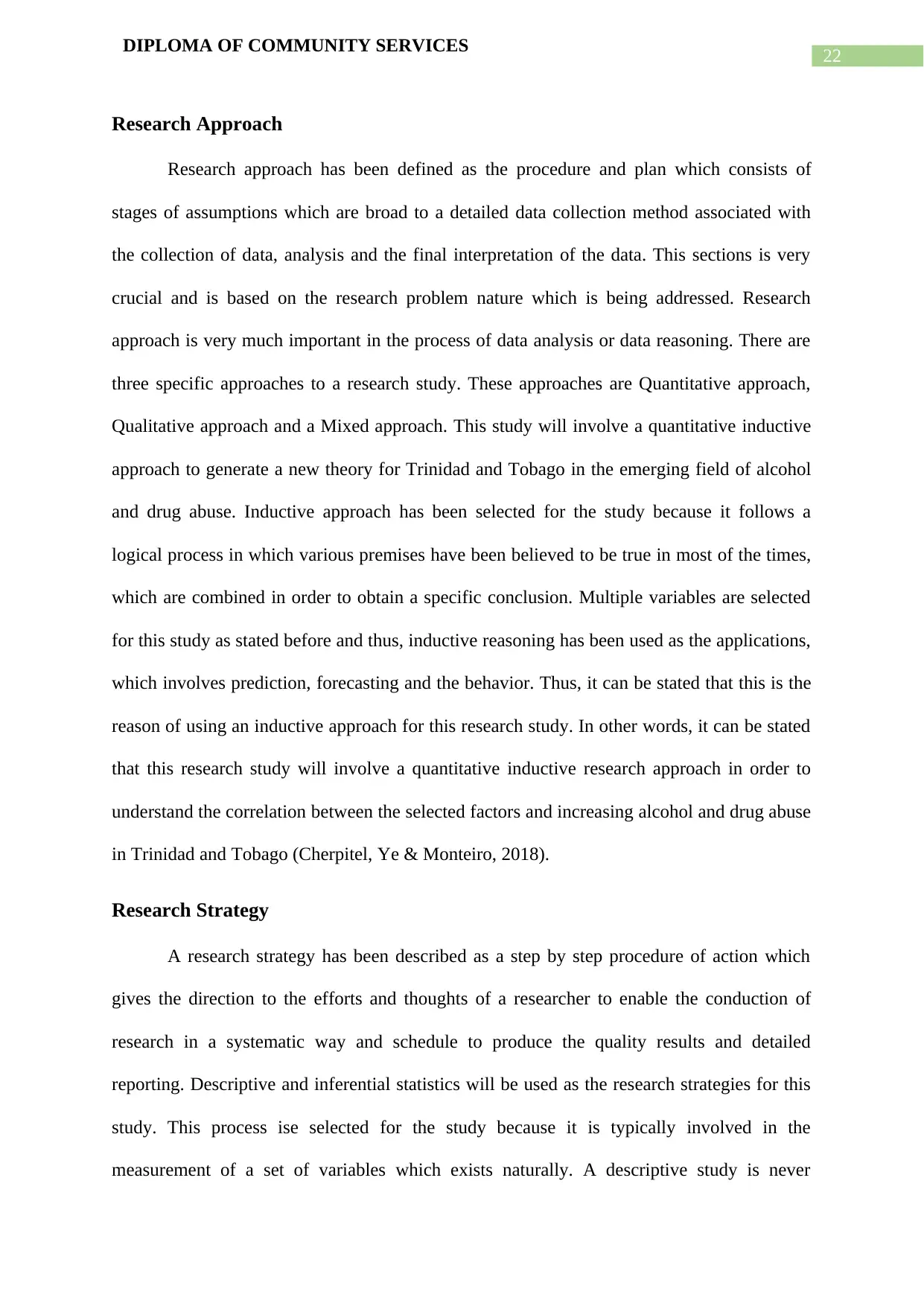
22
DIPLOMA OF COMMUNITY SERVICES
Research Approach
Research approach has been defined as the procedure and plan which consists of
stages of assumptions which are broad to a detailed data collection method associated with
the collection of data, analysis and the final interpretation of the data. This sections is very
crucial and is based on the research problem nature which is being addressed. Research
approach is very much important in the process of data analysis or data reasoning. There are
three specific approaches to a research study. These approaches are Quantitative approach,
Qualitative approach and a Mixed approach. This study will involve a quantitative inductive
approach to generate a new theory for Trinidad and Tobago in the emerging field of alcohol
and drug abuse. Inductive approach has been selected for the study because it follows a
logical process in which various premises have been believed to be true in most of the times,
which are combined in order to obtain a specific conclusion. Multiple variables are selected
for this study as stated before and thus, inductive reasoning has been used as the applications,
which involves prediction, forecasting and the behavior. Thus, it can be stated that this is the
reason of using an inductive approach for this research study. In other words, it can be stated
that this research study will involve a quantitative inductive research approach in order to
understand the correlation between the selected factors and increasing alcohol and drug abuse
in Trinidad and Tobago (Cherpitel, Ye & Monteiro, 2018).
Research Strategy
A research strategy has been described as a step by step procedure of action which
gives the direction to the efforts and thoughts of a researcher to enable the conduction of
research in a systematic way and schedule to produce the quality results and detailed
reporting. Descriptive and inferential statistics will be used as the research strategies for this
study. This process ise selected for the study because it is typically involved in the
measurement of a set of variables which exists naturally. A descriptive study is never
DIPLOMA OF COMMUNITY SERVICES
Research Approach
Research approach has been defined as the procedure and plan which consists of
stages of assumptions which are broad to a detailed data collection method associated with
the collection of data, analysis and the final interpretation of the data. This sections is very
crucial and is based on the research problem nature which is being addressed. Research
approach is very much important in the process of data analysis or data reasoning. There are
three specific approaches to a research study. These approaches are Quantitative approach,
Qualitative approach and a Mixed approach. This study will involve a quantitative inductive
approach to generate a new theory for Trinidad and Tobago in the emerging field of alcohol
and drug abuse. Inductive approach has been selected for the study because it follows a
logical process in which various premises have been believed to be true in most of the times,
which are combined in order to obtain a specific conclusion. Multiple variables are selected
for this study as stated before and thus, inductive reasoning has been used as the applications,
which involves prediction, forecasting and the behavior. Thus, it can be stated that this is the
reason of using an inductive approach for this research study. In other words, it can be stated
that this research study will involve a quantitative inductive research approach in order to
understand the correlation between the selected factors and increasing alcohol and drug abuse
in Trinidad and Tobago (Cherpitel, Ye & Monteiro, 2018).
Research Strategy
A research strategy has been described as a step by step procedure of action which
gives the direction to the efforts and thoughts of a researcher to enable the conduction of
research in a systematic way and schedule to produce the quality results and detailed
reporting. Descriptive and inferential statistics will be used as the research strategies for this
study. This process ise selected for the study because it is typically involved in the
measurement of a set of variables which exists naturally. A descriptive study is never
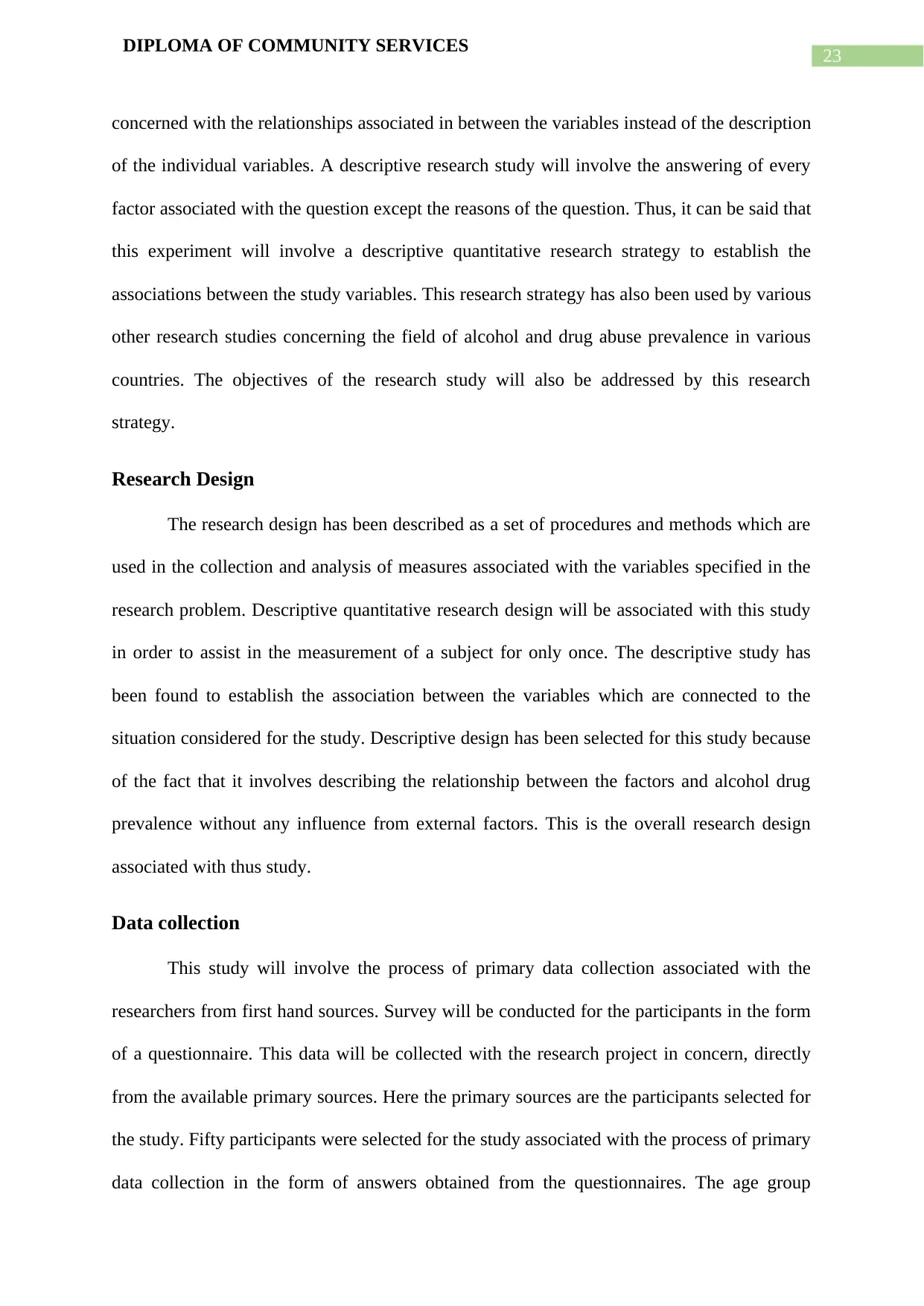
23
DIPLOMA OF COMMUNITY SERVICES
concerned with the relationships associated in between the variables instead of the description
of the individual variables. A descriptive research study will involve the answering of every
factor associated with the question except the reasons of the question. Thus, it can be said that
this experiment will involve a descriptive quantitative research strategy to establish the
associations between the study variables. This research strategy has also been used by various
other research studies concerning the field of alcohol and drug abuse prevalence in various
countries. The objectives of the research study will also be addressed by this research
strategy.
Research Design
The research design has been described as a set of procedures and methods which are
used in the collection and analysis of measures associated with the variables specified in the
research problem. Descriptive quantitative research design will be associated with this study
in order to assist in the measurement of a subject for only once. The descriptive study has
been found to establish the association between the variables which are connected to the
situation considered for the study. Descriptive design has been selected for this study because
of the fact that it involves describing the relationship between the factors and alcohol drug
prevalence without any influence from external factors. This is the overall research design
associated with thus study.
Data collection
This study will involve the process of primary data collection associated with the
researchers from first hand sources. Survey will be conducted for the participants in the form
of a questionnaire. This data will be collected with the research project in concern, directly
from the available primary sources. Here the primary sources are the participants selected for
the study. Fifty participants were selected for the study associated with the process of primary
data collection in the form of answers obtained from the questionnaires. The age group
DIPLOMA OF COMMUNITY SERVICES
concerned with the relationships associated in between the variables instead of the description
of the individual variables. A descriptive research study will involve the answering of every
factor associated with the question except the reasons of the question. Thus, it can be said that
this experiment will involve a descriptive quantitative research strategy to establish the
associations between the study variables. This research strategy has also been used by various
other research studies concerning the field of alcohol and drug abuse prevalence in various
countries. The objectives of the research study will also be addressed by this research
strategy.
Research Design
The research design has been described as a set of procedures and methods which are
used in the collection and analysis of measures associated with the variables specified in the
research problem. Descriptive quantitative research design will be associated with this study
in order to assist in the measurement of a subject for only once. The descriptive study has
been found to establish the association between the variables which are connected to the
situation considered for the study. Descriptive design has been selected for this study because
of the fact that it involves describing the relationship between the factors and alcohol drug
prevalence without any influence from external factors. This is the overall research design
associated with thus study.
Data collection
This study will involve the process of primary data collection associated with the
researchers from first hand sources. Survey will be conducted for the participants in the form
of a questionnaire. This data will be collected with the research project in concern, directly
from the available primary sources. Here the primary sources are the participants selected for
the study. Fifty participants were selected for the study associated with the process of primary
data collection in the form of answers obtained from the questionnaires. The age group
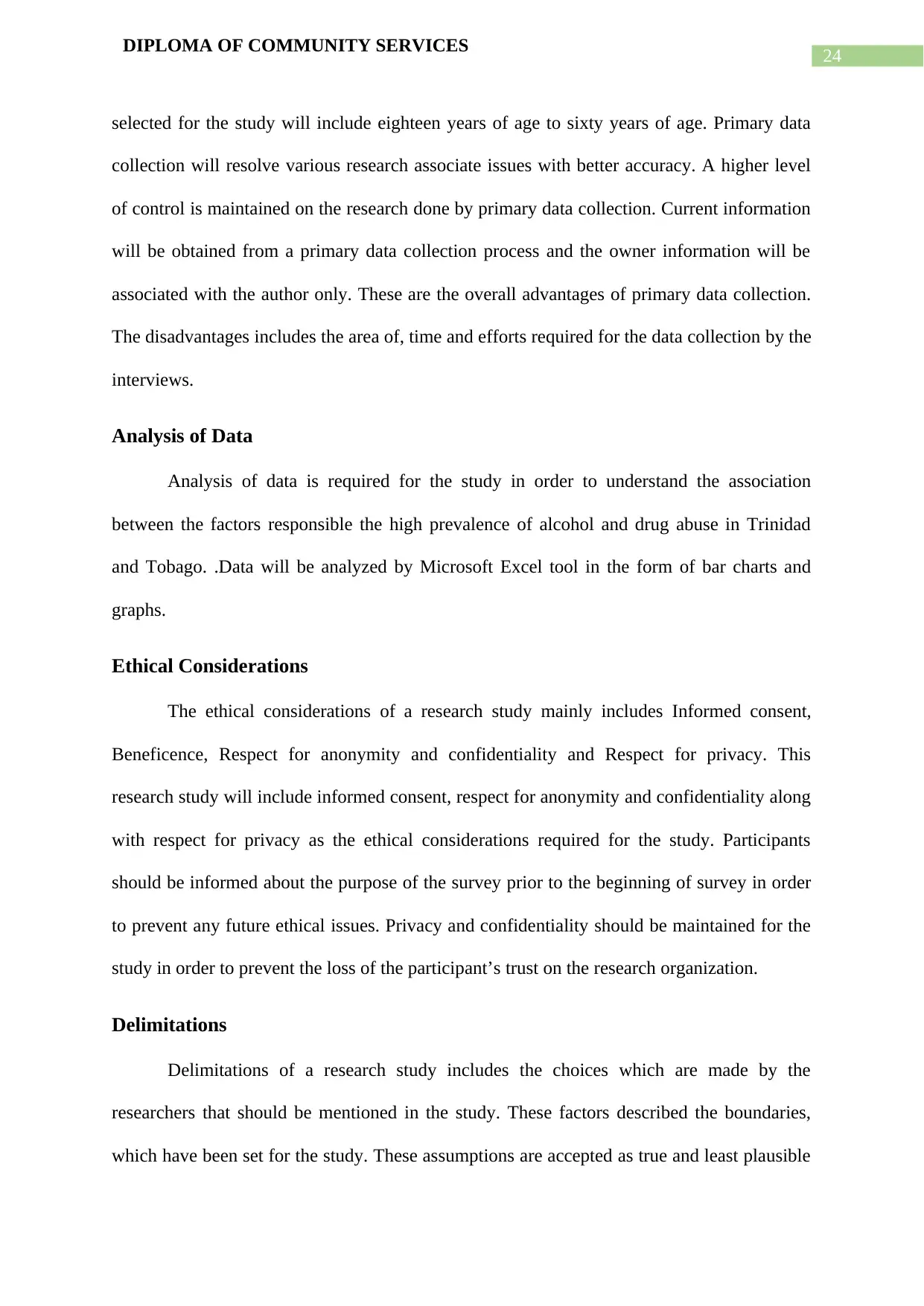
24
DIPLOMA OF COMMUNITY SERVICES
selected for the study will include eighteen years of age to sixty years of age. Primary data
collection will resolve various research associate issues with better accuracy. A higher level
of control is maintained on the research done by primary data collection. Current information
will be obtained from a primary data collection process and the owner information will be
associated with the author only. These are the overall advantages of primary data collection.
The disadvantages includes the area of, time and efforts required for the data collection by the
interviews.
Analysis of Data
Analysis of data is required for the study in order to understand the association
between the factors responsible the high prevalence of alcohol and drug abuse in Trinidad
and Tobago. .Data will be analyzed by Microsoft Excel tool in the form of bar charts and
graphs.
Ethical Considerations
The ethical considerations of a research study mainly includes Informed consent,
Beneficence, Respect for anonymity and confidentiality and Respect for privacy. This
research study will include informed consent, respect for anonymity and confidentiality along
with respect for privacy as the ethical considerations required for the study. Participants
should be informed about the purpose of the survey prior to the beginning of survey in order
to prevent any future ethical issues. Privacy and confidentiality should be maintained for the
study in order to prevent the loss of the participant’s trust on the research organization.
Delimitations
Delimitations of a research study includes the choices which are made by the
researchers that should be mentioned in the study. These factors described the boundaries,
which have been set for the study. These assumptions are accepted as true and least plausible
DIPLOMA OF COMMUNITY SERVICES
selected for the study will include eighteen years of age to sixty years of age. Primary data
collection will resolve various research associate issues with better accuracy. A higher level
of control is maintained on the research done by primary data collection. Current information
will be obtained from a primary data collection process and the owner information will be
associated with the author only. These are the overall advantages of primary data collection.
The disadvantages includes the area of, time and efforts required for the data collection by the
interviews.
Analysis of Data
Analysis of data is required for the study in order to understand the association
between the factors responsible the high prevalence of alcohol and drug abuse in Trinidad
and Tobago. .Data will be analyzed by Microsoft Excel tool in the form of bar charts and
graphs.
Ethical Considerations
The ethical considerations of a research study mainly includes Informed consent,
Beneficence, Respect for anonymity and confidentiality and Respect for privacy. This
research study will include informed consent, respect for anonymity and confidentiality along
with respect for privacy as the ethical considerations required for the study. Participants
should be informed about the purpose of the survey prior to the beginning of survey in order
to prevent any future ethical issues. Privacy and confidentiality should be maintained for the
study in order to prevent the loss of the participant’s trust on the research organization.
Delimitations
Delimitations of a research study includes the choices which are made by the
researchers that should be mentioned in the study. These factors described the boundaries,
which have been set for the study. These assumptions are accepted as true and least plausible
Paraphrase This Document
Need a fresh take? Get an instant paraphrase of this document with our AI Paraphraser
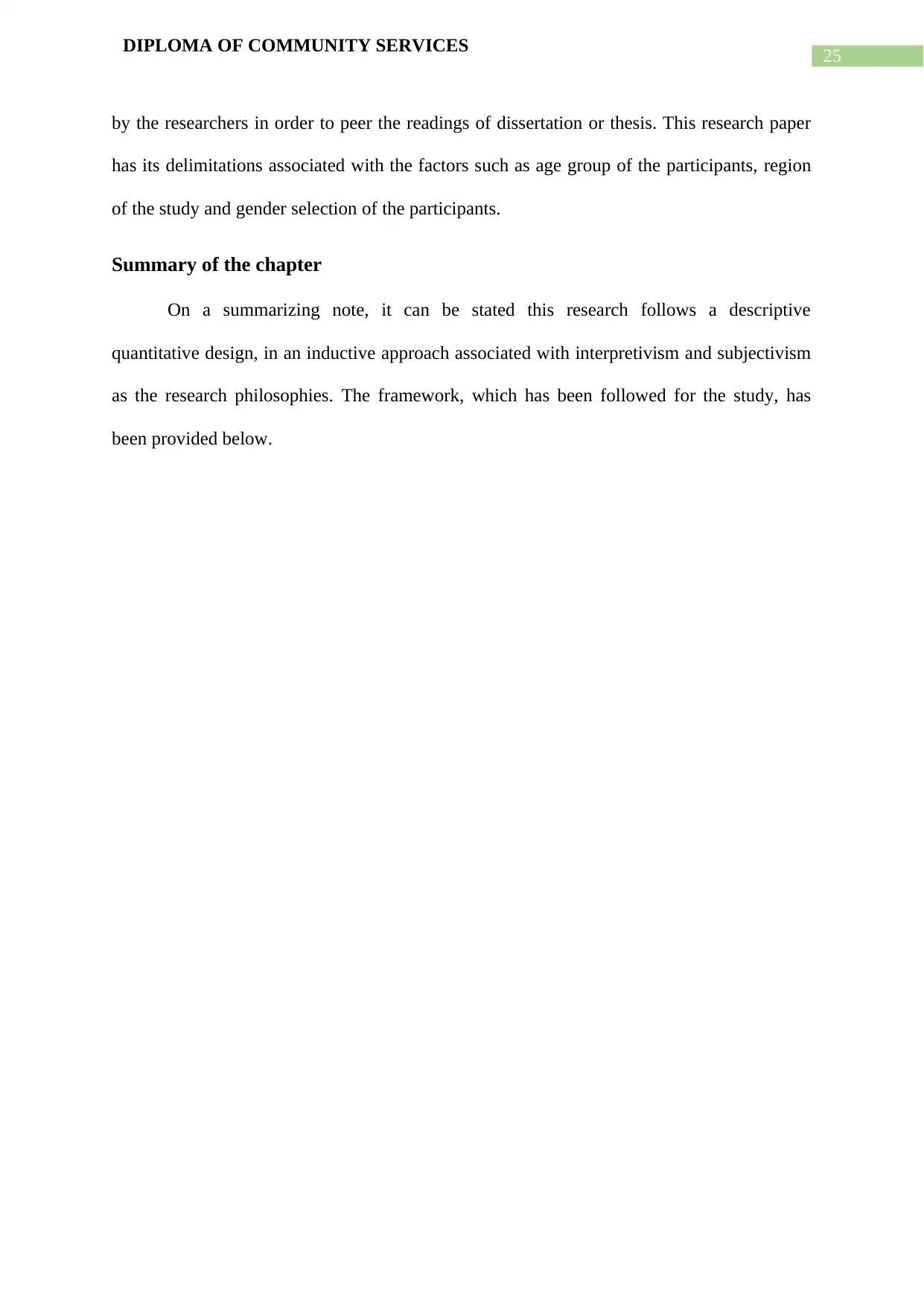
25
DIPLOMA OF COMMUNITY SERVICES
by the researchers in order to peer the readings of dissertation or thesis. This research paper
has its delimitations associated with the factors such as age group of the participants, region
of the study and gender selection of the participants.
Summary of the chapter
On a summarizing note, it can be stated this research follows a descriptive
quantitative design, in an inductive approach associated with interpretivism and subjectivism
as the research philosophies. The framework, which has been followed for the study, has
been provided below.
DIPLOMA OF COMMUNITY SERVICES
by the researchers in order to peer the readings of dissertation or thesis. This research paper
has its delimitations associated with the factors such as age group of the participants, region
of the study and gender selection of the participants.
Summary of the chapter
On a summarizing note, it can be stated this research follows a descriptive
quantitative design, in an inductive approach associated with interpretivism and subjectivism
as the research philosophies. The framework, which has been followed for the study, has
been provided below.
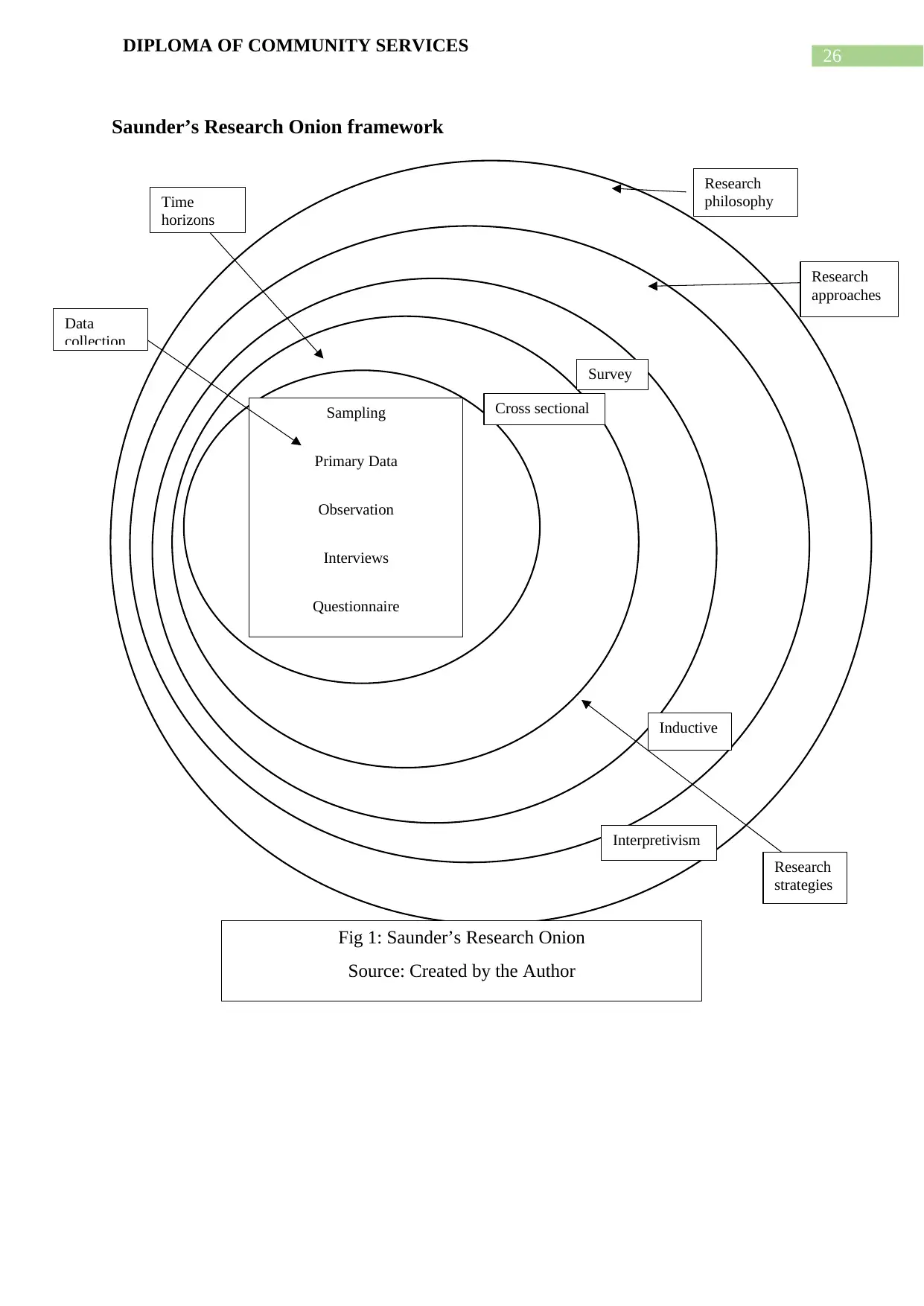
26
DIPLOMA OF COMMUNITY SERVICES
Saunder’s Research Onion framework
Fig 1: Saunder’s Research Onion
Source: Created by the Author
Interpretivism
Inductive
Survey
Cross sectionalSampling
Primary Data
Observation
Interviews
Questionnaire
Research
philosophy
Research
approaches
Research
strategies
Time
horizons
Data
collection
DIPLOMA OF COMMUNITY SERVICES
Saunder’s Research Onion framework
Fig 1: Saunder’s Research Onion
Source: Created by the Author
Interpretivism
Inductive
Survey
Cross sectionalSampling
Primary Data
Observation
Interviews
Questionnaire
Research
philosophy
Research
approaches
Research
strategies
Time
horizons
Data
collection
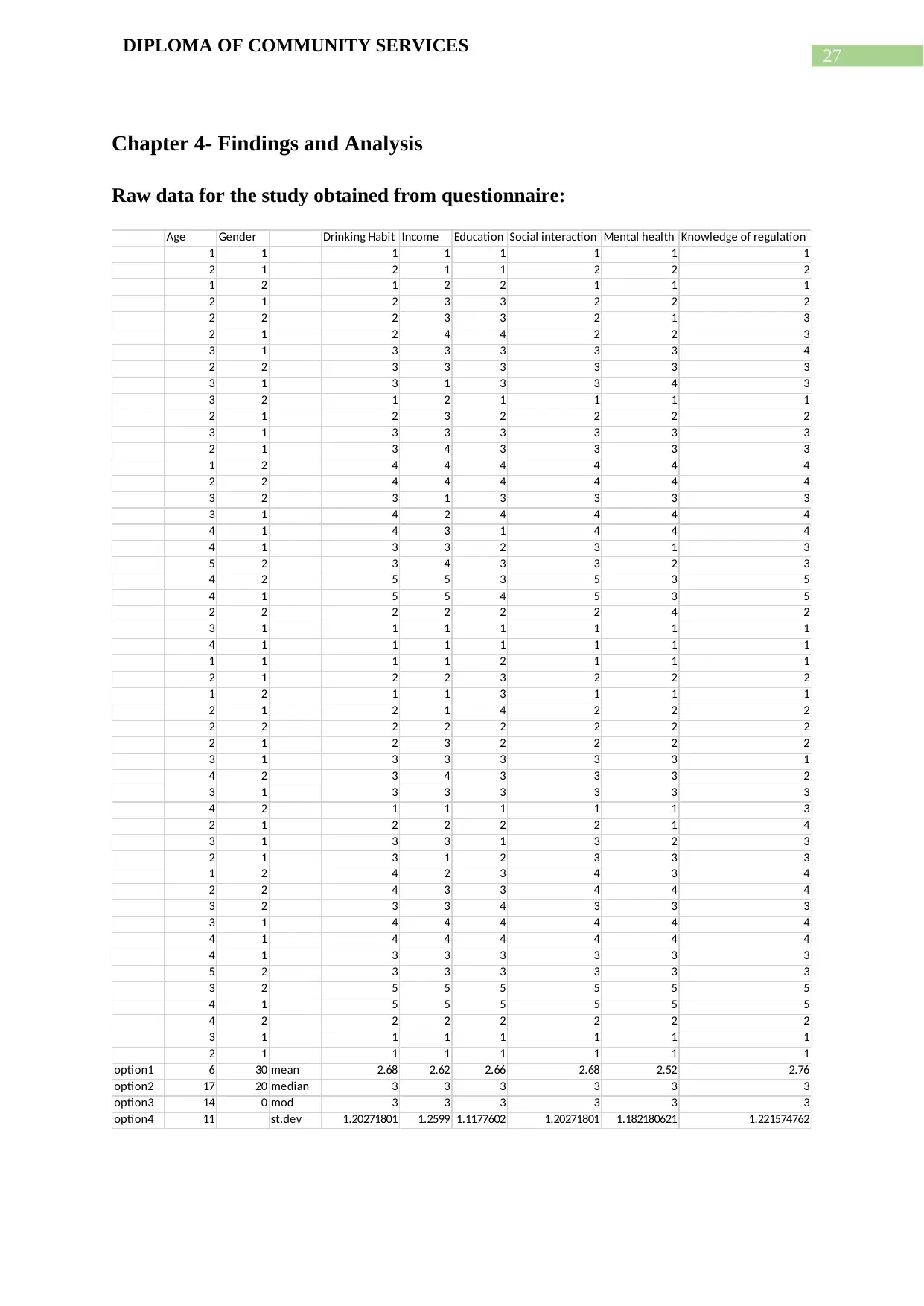
27
DIPLOMA OF COMMUNITY SERVICES
Chapter 4- Findings and Analysis
Raw data for the study obtained from questionnaire:
Age Gender Drinking Habit Income Education Social interaction Mental health Knowledge of regulation
1 1 1 1 1 1 1 1
2 1 2 1 1 2 2 2
1 2 1 2 2 1 1 1
2 1 2 3 3 2 2 2
2 2 2 3 3 2 1 3
2 1 2 4 4 2 2 3
3 1 3 3 3 3 3 4
2 2 3 3 3 3 3 3
3 1 3 1 3 3 4 3
3 2 1 2 1 1 1 1
2 1 2 3 2 2 2 2
3 1 3 3 3 3 3 3
2 1 3 4 3 3 3 3
1 2 4 4 4 4 4 4
2 2 4 4 4 4 4 4
3 2 3 1 3 3 3 3
3 1 4 2 4 4 4 4
4 1 4 3 1 4 4 4
4 1 3 3 2 3 1 3
5 2 3 4 3 3 2 3
4 2 5 5 3 5 3 5
4 1 5 5 4 5 3 5
2 2 2 2 2 2 4 2
3 1 1 1 1 1 1 1
4 1 1 1 1 1 1 1
1 1 1 1 2 1 1 1
2 1 2 2 3 2 2 2
1 2 1 1 3 1 1 1
2 1 2 1 4 2 2 2
2 2 2 2 2 2 2 2
2 1 2 3 2 2 2 2
3 1 3 3 3 3 3 1
4 2 3 4 3 3 3 2
3 1 3 3 3 3 3 3
4 2 1 1 1 1 1 3
2 1 2 2 2 2 1 4
3 1 3 3 1 3 2 3
2 1 3 1 2 3 3 3
1 2 4 2 3 4 3 4
2 2 4 3 3 4 4 4
3 2 3 3 4 3 3 3
3 1 4 4 4 4 4 4
4 1 4 4 4 4 4 4
4 1 3 3 3 3 3 3
5 2 3 3 3 3 3 3
3 2 5 5 5 5 5 5
4 1 5 5 5 5 5 5
4 2 2 2 2 2 2 2
3 1 1 1 1 1 1 1
2 1 1 1 1 1 1 1
option1 6 30 mean 2.68 2.62 2.66 2.68 2.52 2.76
option2 17 20 median 3 3 3 3 3 3
option3 14 0 mod 3 3 3 3 3 3
option4 11 st.dev 1.20271801 1.2599 1.1177602 1.20271801 1.182180621 1.221574762
DIPLOMA OF COMMUNITY SERVICES
Chapter 4- Findings and Analysis
Raw data for the study obtained from questionnaire:
Age Gender Drinking Habit Income Education Social interaction Mental health Knowledge of regulation
1 1 1 1 1 1 1 1
2 1 2 1 1 2 2 2
1 2 1 2 2 1 1 1
2 1 2 3 3 2 2 2
2 2 2 3 3 2 1 3
2 1 2 4 4 2 2 3
3 1 3 3 3 3 3 4
2 2 3 3 3 3 3 3
3 1 3 1 3 3 4 3
3 2 1 2 1 1 1 1
2 1 2 3 2 2 2 2
3 1 3 3 3 3 3 3
2 1 3 4 3 3 3 3
1 2 4 4 4 4 4 4
2 2 4 4 4 4 4 4
3 2 3 1 3 3 3 3
3 1 4 2 4 4 4 4
4 1 4 3 1 4 4 4
4 1 3 3 2 3 1 3
5 2 3 4 3 3 2 3
4 2 5 5 3 5 3 5
4 1 5 5 4 5 3 5
2 2 2 2 2 2 4 2
3 1 1 1 1 1 1 1
4 1 1 1 1 1 1 1
1 1 1 1 2 1 1 1
2 1 2 2 3 2 2 2
1 2 1 1 3 1 1 1
2 1 2 1 4 2 2 2
2 2 2 2 2 2 2 2
2 1 2 3 2 2 2 2
3 1 3 3 3 3 3 1
4 2 3 4 3 3 3 2
3 1 3 3 3 3 3 3
4 2 1 1 1 1 1 3
2 1 2 2 2 2 1 4
3 1 3 3 1 3 2 3
2 1 3 1 2 3 3 3
1 2 4 2 3 4 3 4
2 2 4 3 3 4 4 4
3 2 3 3 4 3 3 3
3 1 4 4 4 4 4 4
4 1 4 4 4 4 4 4
4 1 3 3 3 3 3 3
5 2 3 3 3 3 3 3
3 2 5 5 5 5 5 5
4 1 5 5 5 5 5 5
4 2 2 2 2 2 2 2
3 1 1 1 1 1 1 1
2 1 1 1 1 1 1 1
option1 6 30 mean 2.68 2.62 2.66 2.68 2.52 2.76
option2 17 20 median 3 3 3 3 3 3
option3 14 0 mod 3 3 3 3 3 3
option4 11 st.dev 1.20271801 1.2599 1.1177602 1.20271801 1.182180621 1.221574762
Secure Best Marks with AI Grader
Need help grading? Try our AI Grader for instant feedback on your assignments.
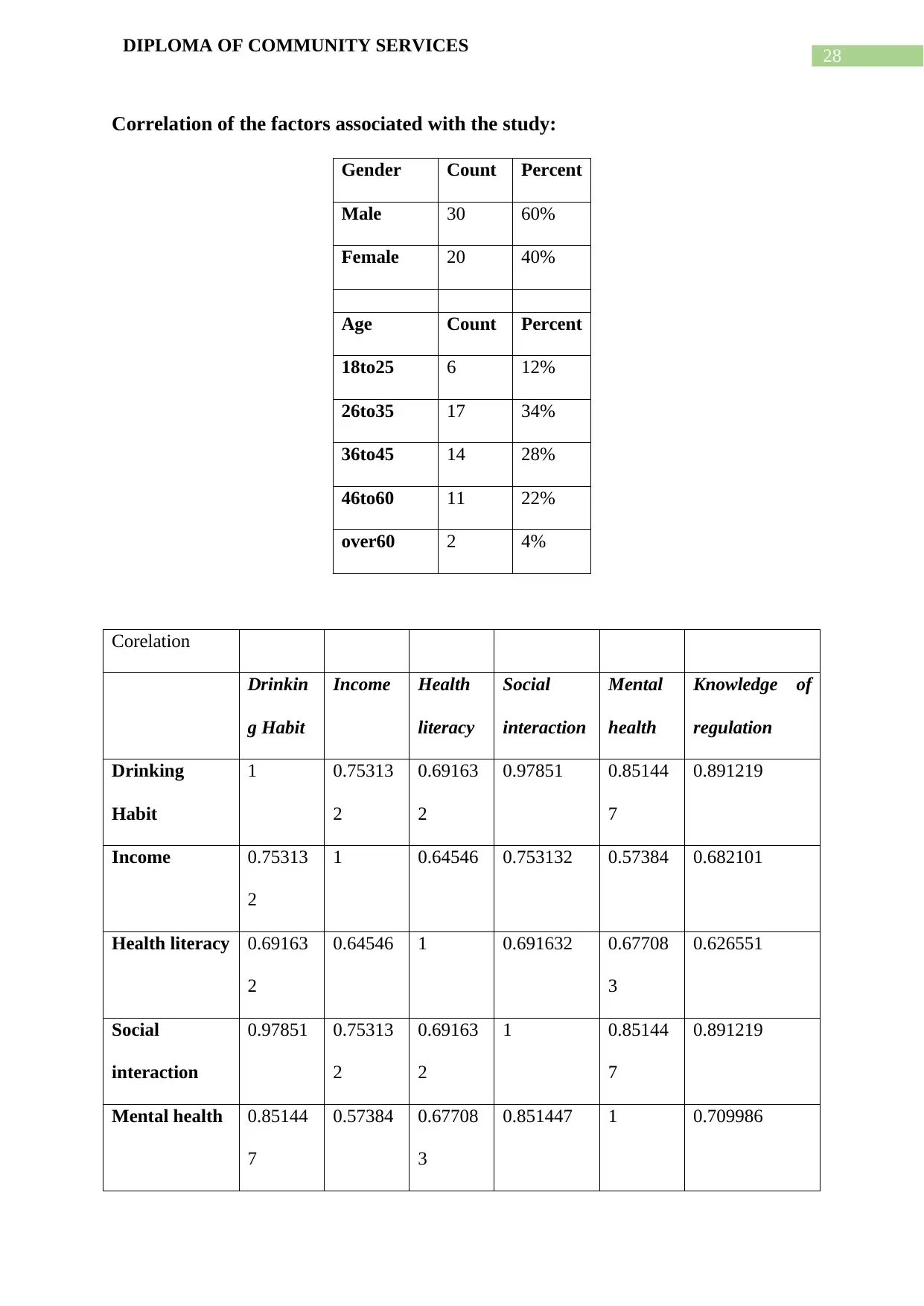
28
DIPLOMA OF COMMUNITY SERVICES
Correlation of the factors associated with the study:
Gender Count Percent
Male 30 60%
Female 20 40%
Age Count Percent
18to25 6 12%
26to35 17 34%
36to45 14 28%
46to60 11 22%
over60 2 4%
Corelation
Drinkin
g Habit
Income Health
literacy
Social
interaction
Mental
health
Knowledge of
regulation
Drinking
Habit
1 0.75313
2
0.69163
2
0.97851 0.85144
7
0.891219
Income 0.75313
2
1 0.64546 0.753132 0.57384 0.682101
Health literacy 0.69163
2
0.64546 1 0.691632 0.67708
3
0.626551
Social
interaction
0.97851 0.75313
2
0.69163
2
1 0.85144
7
0.891219
Mental health 0.85144
7
0.57384 0.67708
3
0.851447 1 0.709986
DIPLOMA OF COMMUNITY SERVICES
Correlation of the factors associated with the study:
Gender Count Percent
Male 30 60%
Female 20 40%
Age Count Percent
18to25 6 12%
26to35 17 34%
36to45 14 28%
46to60 11 22%
over60 2 4%
Corelation
Drinkin
g Habit
Income Health
literacy
Social
interaction
Mental
health
Knowledge of
regulation
Drinking
Habit
1 0.75313
2
0.69163
2
0.97851 0.85144
7
0.891219
Income 0.75313
2
1 0.64546 0.753132 0.57384 0.682101
Health literacy 0.69163
2
0.64546 1 0.691632 0.67708
3
0.626551
Social
interaction
0.97851 0.75313
2
0.69163
2
1 0.85144
7
0.891219
Mental health 0.85144
7
0.57384 0.67708
3
0.851447 1 0.709986
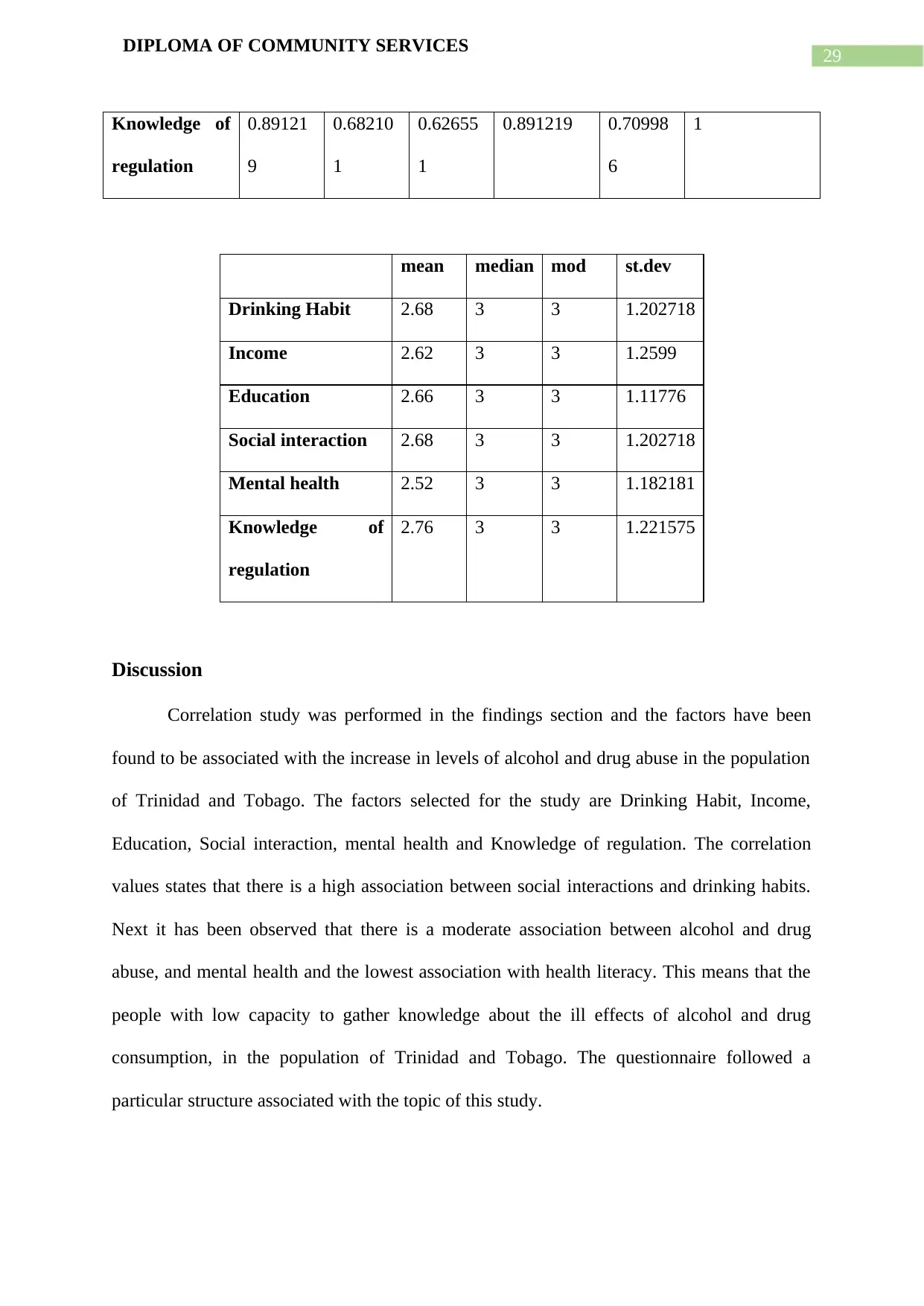
29
DIPLOMA OF COMMUNITY SERVICES
Knowledge of
regulation
0.89121
9
0.68210
1
0.62655
1
0.891219 0.70998
6
1
mean median mod st.dev
Drinking Habit 2.68 3 3 1.202718
Income 2.62 3 3 1.2599
Education 2.66 3 3 1.11776
Social interaction 2.68 3 3 1.202718
Mental health 2.52 3 3 1.182181
Knowledge of
regulation
2.76 3 3 1.221575
Discussion
Correlation study was performed in the findings section and the factors have been
found to be associated with the increase in levels of alcohol and drug abuse in the population
of Trinidad and Tobago. The factors selected for the study are Drinking Habit, Income,
Education, Social interaction, mental health and Knowledge of regulation. The correlation
values states that there is a high association between social interactions and drinking habits.
Next it has been observed that there is a moderate association between alcohol and drug
abuse, and mental health and the lowest association with health literacy. This means that the
people with low capacity to gather knowledge about the ill effects of alcohol and drug
consumption, in the population of Trinidad and Tobago. The questionnaire followed a
particular structure associated with the topic of this study.
DIPLOMA OF COMMUNITY SERVICES
Knowledge of
regulation
0.89121
9
0.68210
1
0.62655
1
0.891219 0.70998
6
1
mean median mod st.dev
Drinking Habit 2.68 3 3 1.202718
Income 2.62 3 3 1.2599
Education 2.66 3 3 1.11776
Social interaction 2.68 3 3 1.202718
Mental health 2.52 3 3 1.182181
Knowledge of
regulation
2.76 3 3 1.221575
Discussion
Correlation study was performed in the findings section and the factors have been
found to be associated with the increase in levels of alcohol and drug abuse in the population
of Trinidad and Tobago. The factors selected for the study are Drinking Habit, Income,
Education, Social interaction, mental health and Knowledge of regulation. The correlation
values states that there is a high association between social interactions and drinking habits.
Next it has been observed that there is a moderate association between alcohol and drug
abuse, and mental health and the lowest association with health literacy. This means that the
people with low capacity to gather knowledge about the ill effects of alcohol and drug
consumption, in the population of Trinidad and Tobago. The questionnaire followed a
particular structure associated with the topic of this study.
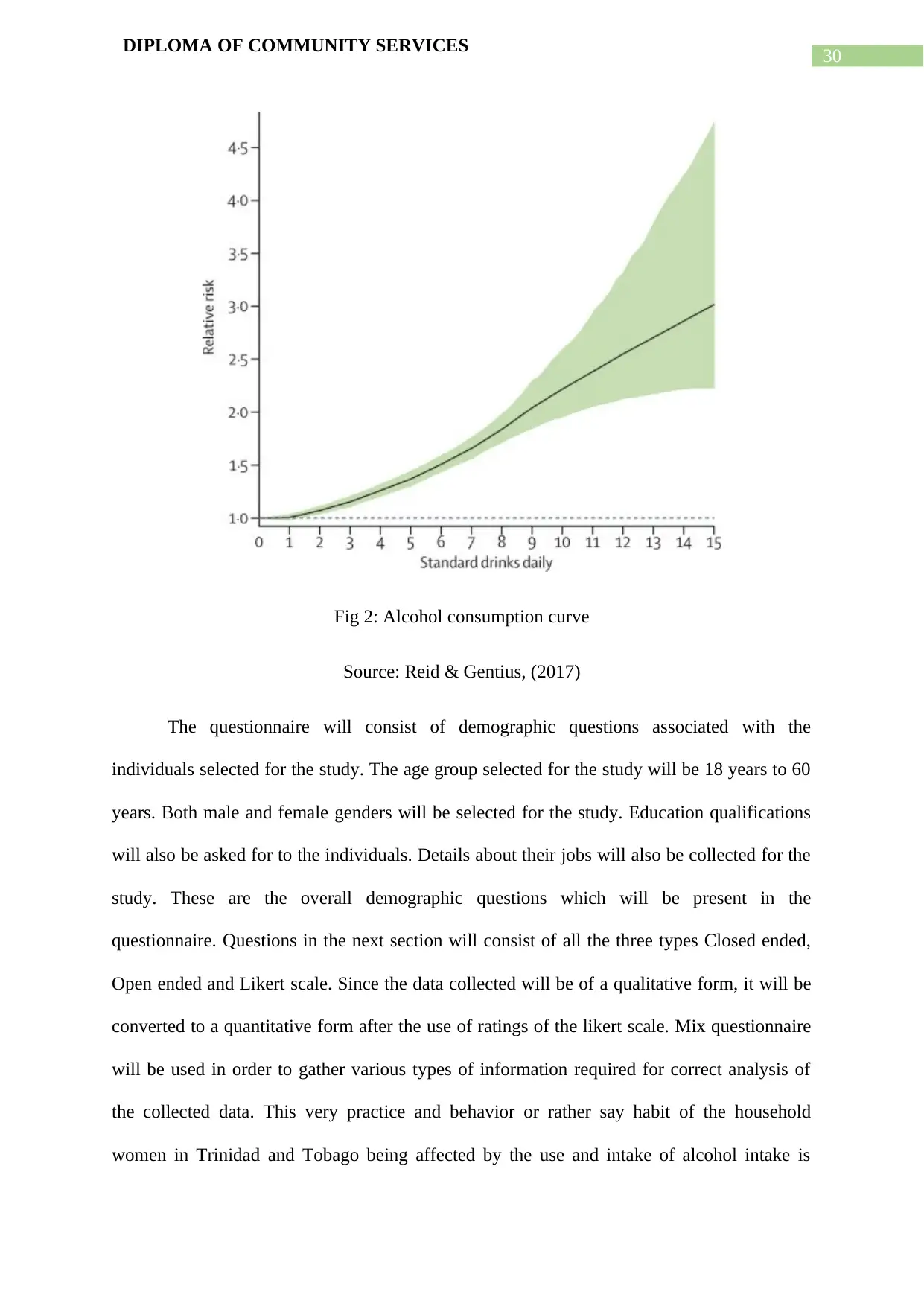
30
DIPLOMA OF COMMUNITY SERVICES
Fig 2: Alcohol consumption curve
Source: Reid & Gentius, (2017)
The questionnaire will consist of demographic questions associated with the
individuals selected for the study. The age group selected for the study will be 18 years to 60
years. Both male and female genders will be selected for the study. Education qualifications
will also be asked for to the individuals. Details about their jobs will also be collected for the
study. These are the overall demographic questions which will be present in the
questionnaire. Questions in the next section will consist of all the three types Closed ended,
Open ended and Likert scale. Since the data collected will be of a qualitative form, it will be
converted to a quantitative form after the use of ratings of the likert scale. Mix questionnaire
will be used in order to gather various types of information required for correct analysis of
the collected data. This very practice and behavior or rather say habit of the household
women in Trinidad and Tobago being affected by the use and intake of alcohol intake is
DIPLOMA OF COMMUNITY SERVICES
Fig 2: Alcohol consumption curve
Source: Reid & Gentius, (2017)
The questionnaire will consist of demographic questions associated with the
individuals selected for the study. The age group selected for the study will be 18 years to 60
years. Both male and female genders will be selected for the study. Education qualifications
will also be asked for to the individuals. Details about their jobs will also be collected for the
study. These are the overall demographic questions which will be present in the
questionnaire. Questions in the next section will consist of all the three types Closed ended,
Open ended and Likert scale. Since the data collected will be of a qualitative form, it will be
converted to a quantitative form after the use of ratings of the likert scale. Mix questionnaire
will be used in order to gather various types of information required for correct analysis of
the collected data. This very practice and behavior or rather say habit of the household
women in Trinidad and Tobago being affected by the use and intake of alcohol intake is
Paraphrase This Document
Need a fresh take? Get an instant paraphrase of this document with our AI Paraphraser
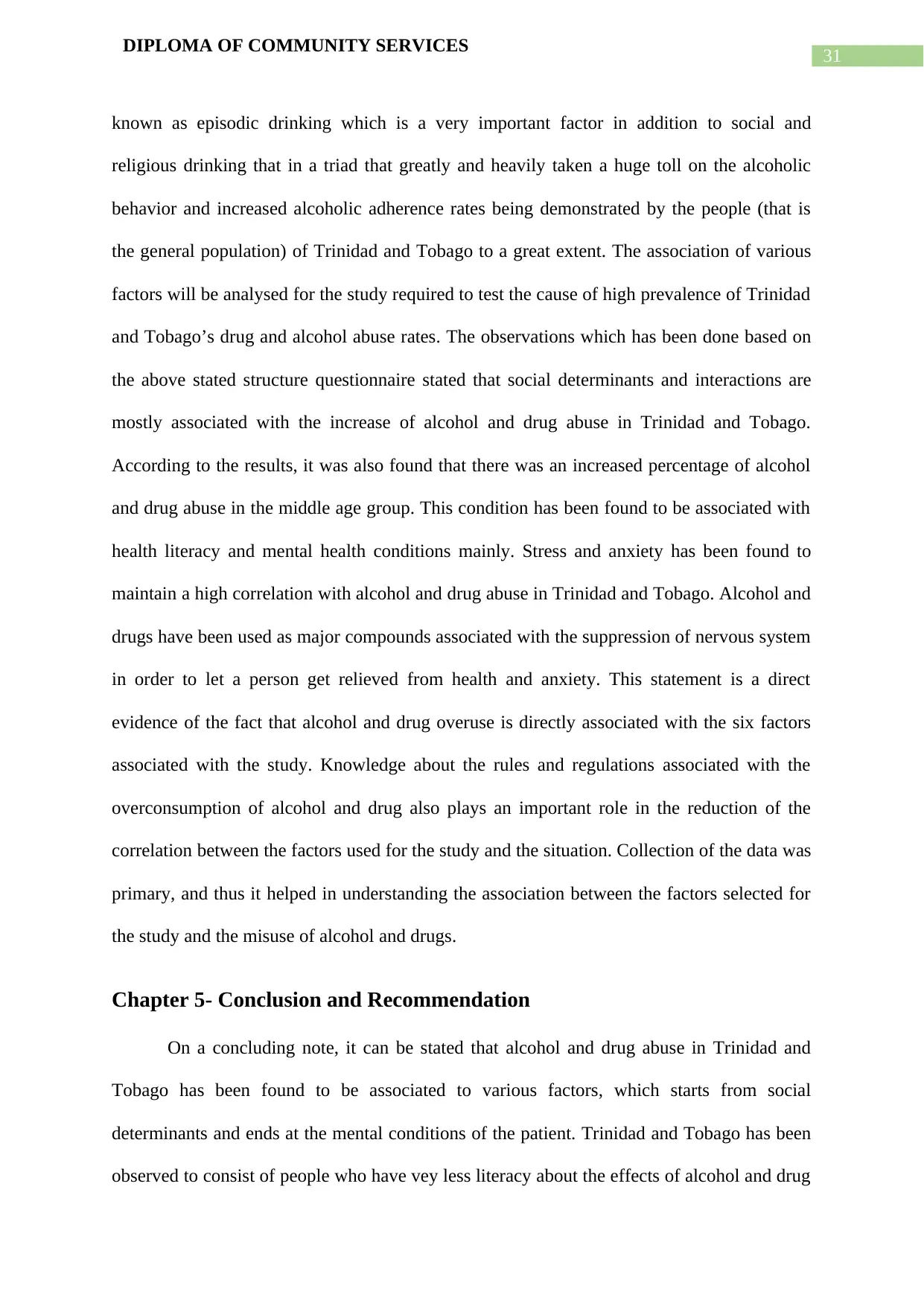
31
DIPLOMA OF COMMUNITY SERVICES
known as episodic drinking which is a very important factor in addition to social and
religious drinking that in a triad that greatly and heavily taken a huge toll on the alcoholic
behavior and increased alcoholic adherence rates being demonstrated by the people (that is
the general population) of Trinidad and Tobago to a great extent. The association of various
factors will be analysed for the study required to test the cause of high prevalence of Trinidad
and Tobago’s drug and alcohol abuse rates. The observations which has been done based on
the above stated structure questionnaire stated that social determinants and interactions are
mostly associated with the increase of alcohol and drug abuse in Trinidad and Tobago.
According to the results, it was also found that there was an increased percentage of alcohol
and drug abuse in the middle age group. This condition has been found to be associated with
health literacy and mental health conditions mainly. Stress and anxiety has been found to
maintain a high correlation with alcohol and drug abuse in Trinidad and Tobago. Alcohol and
drugs have been used as major compounds associated with the suppression of nervous system
in order to let a person get relieved from health and anxiety. This statement is a direct
evidence of the fact that alcohol and drug overuse is directly associated with the six factors
associated with the study. Knowledge about the rules and regulations associated with the
overconsumption of alcohol and drug also plays an important role in the reduction of the
correlation between the factors used for the study and the situation. Collection of the data was
primary, and thus it helped in understanding the association between the factors selected for
the study and the misuse of alcohol and drugs.
Chapter 5- Conclusion and Recommendation
On a concluding note, it can be stated that alcohol and drug abuse in Trinidad and
Tobago has been found to be associated to various factors, which starts from social
determinants and ends at the mental conditions of the patient. Trinidad and Tobago has been
observed to consist of people who have vey less literacy about the effects of alcohol and drug
DIPLOMA OF COMMUNITY SERVICES
known as episodic drinking which is a very important factor in addition to social and
religious drinking that in a triad that greatly and heavily taken a huge toll on the alcoholic
behavior and increased alcoholic adherence rates being demonstrated by the people (that is
the general population) of Trinidad and Tobago to a great extent. The association of various
factors will be analysed for the study required to test the cause of high prevalence of Trinidad
and Tobago’s drug and alcohol abuse rates. The observations which has been done based on
the above stated structure questionnaire stated that social determinants and interactions are
mostly associated with the increase of alcohol and drug abuse in Trinidad and Tobago.
According to the results, it was also found that there was an increased percentage of alcohol
and drug abuse in the middle age group. This condition has been found to be associated with
health literacy and mental health conditions mainly. Stress and anxiety has been found to
maintain a high correlation with alcohol and drug abuse in Trinidad and Tobago. Alcohol and
drugs have been used as major compounds associated with the suppression of nervous system
in order to let a person get relieved from health and anxiety. This statement is a direct
evidence of the fact that alcohol and drug overuse is directly associated with the six factors
associated with the study. Knowledge about the rules and regulations associated with the
overconsumption of alcohol and drug also plays an important role in the reduction of the
correlation between the factors used for the study and the situation. Collection of the data was
primary, and thus it helped in understanding the association between the factors selected for
the study and the misuse of alcohol and drugs.
Chapter 5- Conclusion and Recommendation
On a concluding note, it can be stated that alcohol and drug abuse in Trinidad and
Tobago has been found to be associated to various factors, which starts from social
determinants and ends at the mental conditions of the patient. Trinidad and Tobago has been
observed to consist of people who have vey less literacy about the effects of alcohol and drug
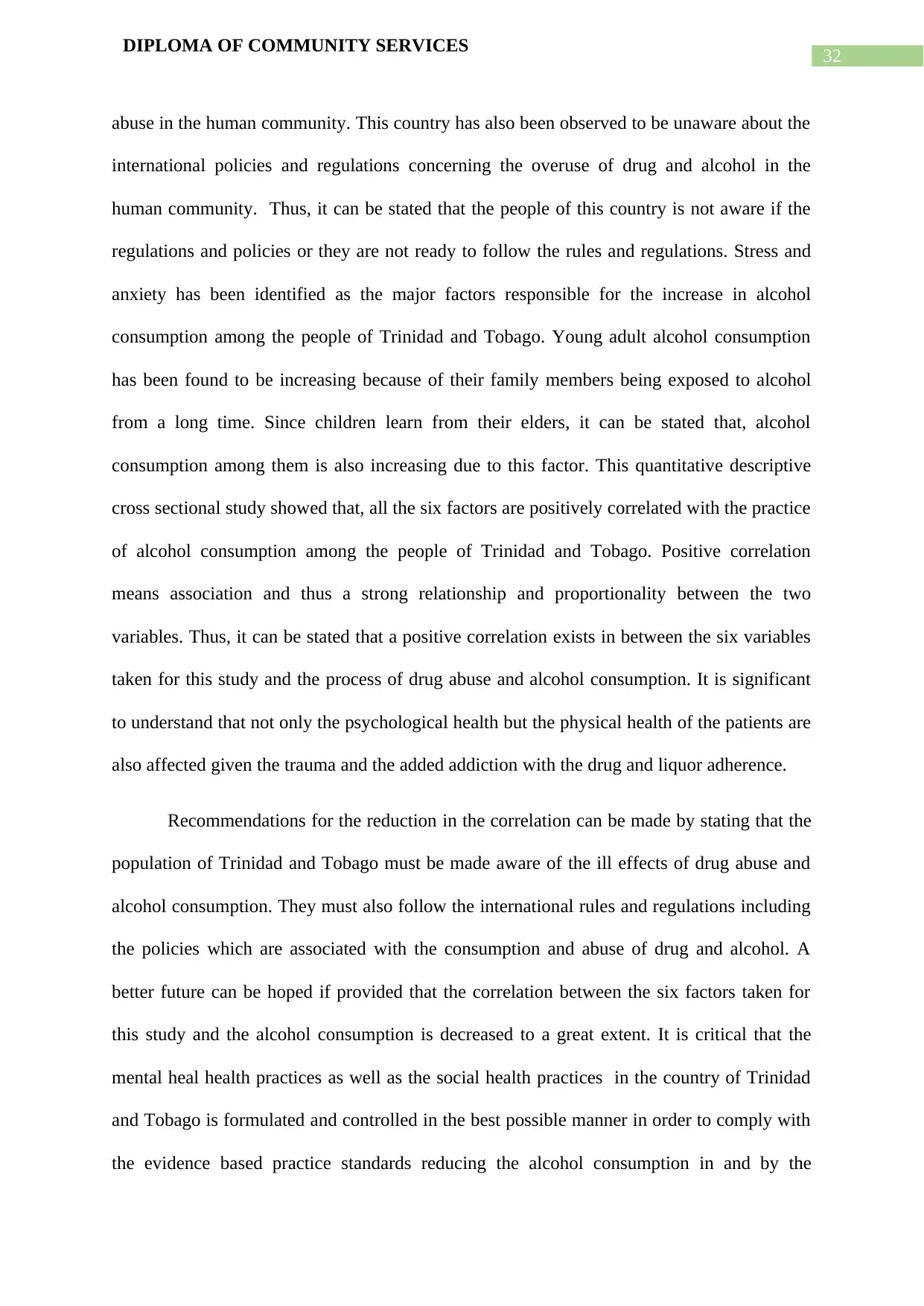
32
DIPLOMA OF COMMUNITY SERVICES
abuse in the human community. This country has also been observed to be unaware about the
international policies and regulations concerning the overuse of drug and alcohol in the
human community. Thus, it can be stated that the people of this country is not aware if the
regulations and policies or they are not ready to follow the rules and regulations. Stress and
anxiety has been identified as the major factors responsible for the increase in alcohol
consumption among the people of Trinidad and Tobago. Young adult alcohol consumption
has been found to be increasing because of their family members being exposed to alcohol
from a long time. Since children learn from their elders, it can be stated that, alcohol
consumption among them is also increasing due to this factor. This quantitative descriptive
cross sectional study showed that, all the six factors are positively correlated with the practice
of alcohol consumption among the people of Trinidad and Tobago. Positive correlation
means association and thus a strong relationship and proportionality between the two
variables. Thus, it can be stated that a positive correlation exists in between the six variables
taken for this study and the process of drug abuse and alcohol consumption. It is significant
to understand that not only the psychological health but the physical health of the patients are
also affected given the trauma and the added addiction with the drug and liquor adherence.
Recommendations for the reduction in the correlation can be made by stating that the
population of Trinidad and Tobago must be made aware of the ill effects of drug abuse and
alcohol consumption. They must also follow the international rules and regulations including
the policies which are associated with the consumption and abuse of drug and alcohol. A
better future can be hoped if provided that the correlation between the six factors taken for
this study and the alcohol consumption is decreased to a great extent. It is critical that the
mental heal health practices as well as the social health practices in the country of Trinidad
and Tobago is formulated and controlled in the best possible manner in order to comply with
the evidence based practice standards reducing the alcohol consumption in and by the
DIPLOMA OF COMMUNITY SERVICES
abuse in the human community. This country has also been observed to be unaware about the
international policies and regulations concerning the overuse of drug and alcohol in the
human community. Thus, it can be stated that the people of this country is not aware if the
regulations and policies or they are not ready to follow the rules and regulations. Stress and
anxiety has been identified as the major factors responsible for the increase in alcohol
consumption among the people of Trinidad and Tobago. Young adult alcohol consumption
has been found to be increasing because of their family members being exposed to alcohol
from a long time. Since children learn from their elders, it can be stated that, alcohol
consumption among them is also increasing due to this factor. This quantitative descriptive
cross sectional study showed that, all the six factors are positively correlated with the practice
of alcohol consumption among the people of Trinidad and Tobago. Positive correlation
means association and thus a strong relationship and proportionality between the two
variables. Thus, it can be stated that a positive correlation exists in between the six variables
taken for this study and the process of drug abuse and alcohol consumption. It is significant
to understand that not only the psychological health but the physical health of the patients are
also affected given the trauma and the added addiction with the drug and liquor adherence.
Recommendations for the reduction in the correlation can be made by stating that the
population of Trinidad and Tobago must be made aware of the ill effects of drug abuse and
alcohol consumption. They must also follow the international rules and regulations including
the policies which are associated with the consumption and abuse of drug and alcohol. A
better future can be hoped if provided that the correlation between the six factors taken for
this study and the alcohol consumption is decreased to a great extent. It is critical that the
mental heal health practices as well as the social health practices in the country of Trinidad
and Tobago is formulated and controlled in the best possible manner in order to comply with
the evidence based practice standards reducing the alcohol consumption in and by the
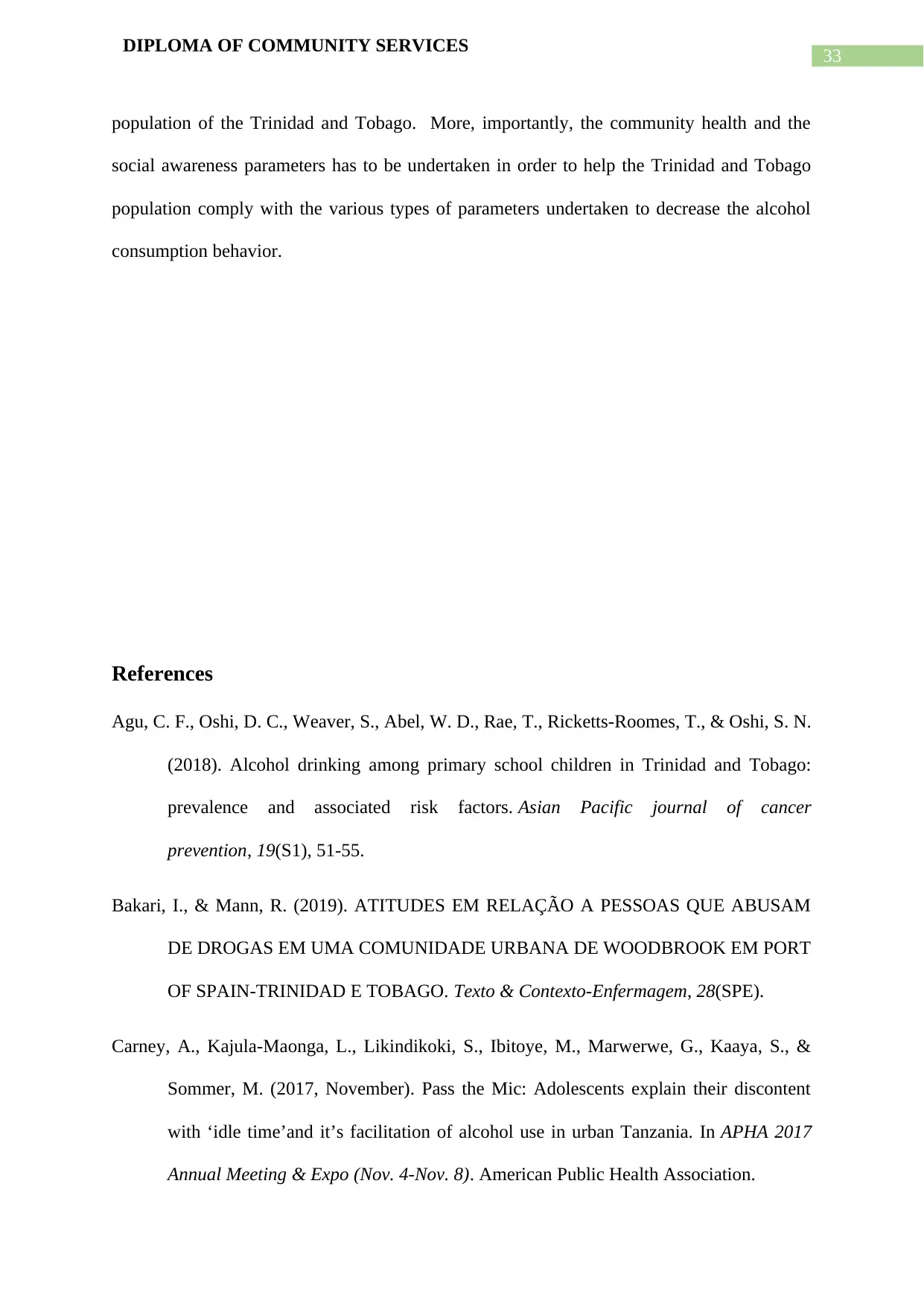
33
DIPLOMA OF COMMUNITY SERVICES
population of the Trinidad and Tobago. More, importantly, the community health and the
social awareness parameters has to be undertaken in order to help the Trinidad and Tobago
population comply with the various types of parameters undertaken to decrease the alcohol
consumption behavior.
References
Agu, C. F., Oshi, D. C., Weaver, S., Abel, W. D., Rae, T., Ricketts-Roomes, T., & Oshi, S. N.
(2018). Alcohol drinking among primary school children in Trinidad and Tobago:
prevalence and associated risk factors. Asian Pacific journal of cancer
prevention, 19(S1), 51-55.
Bakari, I., & Mann, R. (2019). ATITUDES EM RELAÇÃO A PESSOAS QUE ABUSAM
DE DROGAS EM UMA COMUNIDADE URBANA DE WOODBROOK EM PORT
OF SPAIN-TRINIDAD E TOBAGO. Texto & Contexto-Enfermagem, 28(SPE).
Carney, A., Kajula-Maonga, L., Likindikoki, S., Ibitoye, M., Marwerwe, G., Kaaya, S., &
Sommer, M. (2017, November). Pass the Mic: Adolescents explain their discontent
with ‘idle time’and it’s facilitation of alcohol use in urban Tanzania. In APHA 2017
Annual Meeting & Expo (Nov. 4-Nov. 8). American Public Health Association.
DIPLOMA OF COMMUNITY SERVICES
population of the Trinidad and Tobago. More, importantly, the community health and the
social awareness parameters has to be undertaken in order to help the Trinidad and Tobago
population comply with the various types of parameters undertaken to decrease the alcohol
consumption behavior.
References
Agu, C. F., Oshi, D. C., Weaver, S., Abel, W. D., Rae, T., Ricketts-Roomes, T., & Oshi, S. N.
(2018). Alcohol drinking among primary school children in Trinidad and Tobago:
prevalence and associated risk factors. Asian Pacific journal of cancer
prevention, 19(S1), 51-55.
Bakari, I., & Mann, R. (2019). ATITUDES EM RELAÇÃO A PESSOAS QUE ABUSAM
DE DROGAS EM UMA COMUNIDADE URBANA DE WOODBROOK EM PORT
OF SPAIN-TRINIDAD E TOBAGO. Texto & Contexto-Enfermagem, 28(SPE).
Carney, A., Kajula-Maonga, L., Likindikoki, S., Ibitoye, M., Marwerwe, G., Kaaya, S., &
Sommer, M. (2017, November). Pass the Mic: Adolescents explain their discontent
with ‘idle time’and it’s facilitation of alcohol use in urban Tanzania. In APHA 2017
Annual Meeting & Expo (Nov. 4-Nov. 8). American Public Health Association.
Secure Best Marks with AI Grader
Need help grading? Try our AI Grader for instant feedback on your assignments.
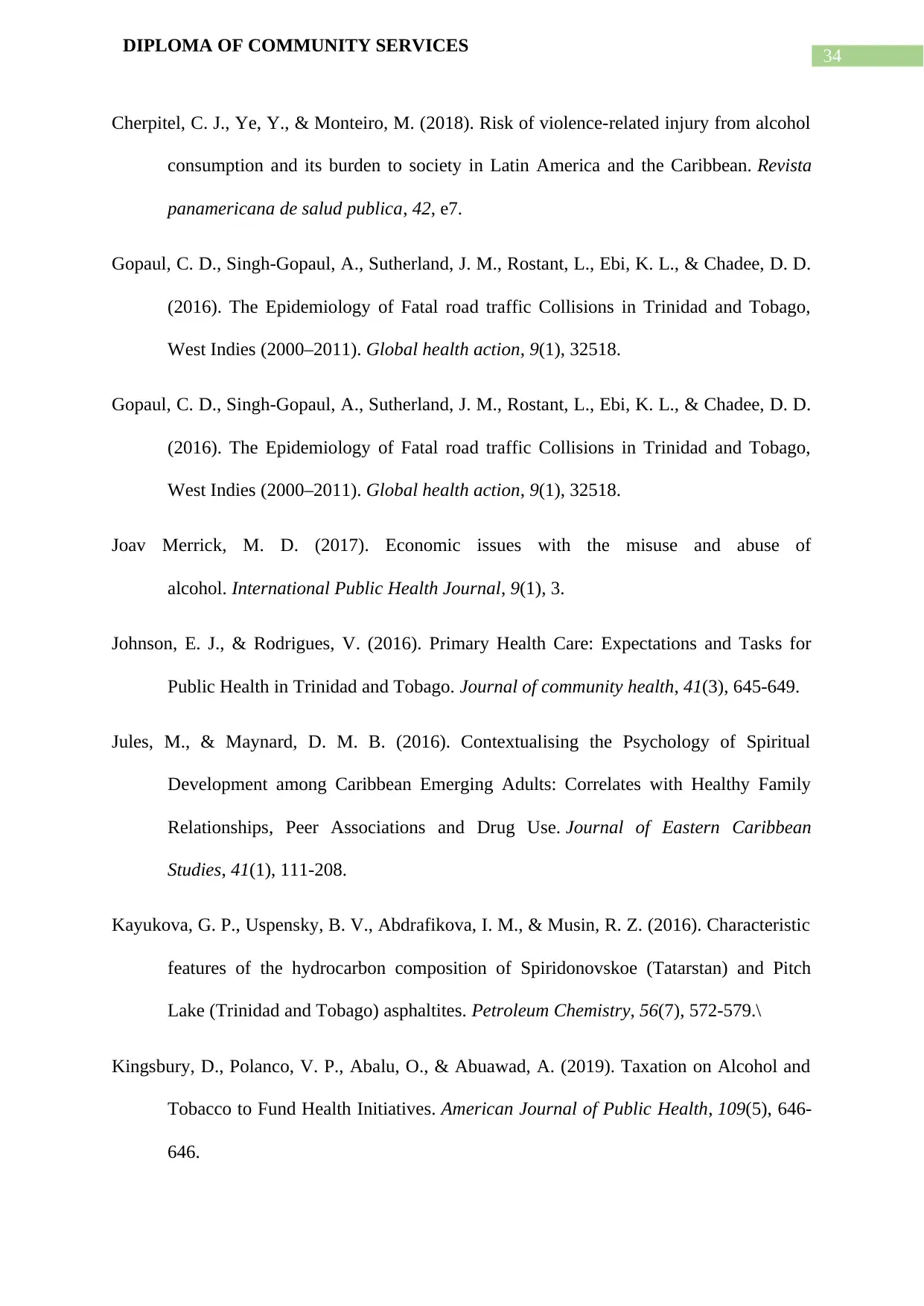
34
DIPLOMA OF COMMUNITY SERVICES
Cherpitel, C. J., Ye, Y., & Monteiro, M. (2018). Risk of violence-related injury from alcohol
consumption and its burden to society in Latin America and the Caribbean. Revista
panamericana de salud publica, 42, e7.
Gopaul, C. D., Singh-Gopaul, A., Sutherland, J. M., Rostant, L., Ebi, K. L., & Chadee, D. D.
(2016). The Epidemiology of Fatal road traffic Collisions in Trinidad and Tobago,
West Indies (2000–2011). Global health action, 9(1), 32518.
Gopaul, C. D., Singh-Gopaul, A., Sutherland, J. M., Rostant, L., Ebi, K. L., & Chadee, D. D.
(2016). The Epidemiology of Fatal road traffic Collisions in Trinidad and Tobago,
West Indies (2000–2011). Global health action, 9(1), 32518.
Joav Merrick, M. D. (2017). Economic issues with the misuse and abuse of
alcohol. International Public Health Journal, 9(1), 3.
Johnson, E. J., & Rodrigues, V. (2016). Primary Health Care: Expectations and Tasks for
Public Health in Trinidad and Tobago. Journal of community health, 41(3), 645-649.
Jules, M., & Maynard, D. M. B. (2016). Contextualising the Psychology of Spiritual
Development among Caribbean Emerging Adults: Correlates with Healthy Family
Relationships, Peer Associations and Drug Use. Journal of Eastern Caribbean
Studies, 41(1), 111-208.
Kayukova, G. P., Uspensky, B. V., Abdrafikova, I. M., & Musin, R. Z. (2016). Characteristic
features of the hydrocarbon composition of Spiridonovskoe (Tatarstan) and Pitch
Lake (Trinidad and Tobago) asphaltites. Petroleum Chemistry, 56(7), 572-579.\
Kingsbury, D., Polanco, V. P., Abalu, O., & Abuawad, A. (2019). Taxation on Alcohol and
Tobacco to Fund Health Initiatives. American Journal of Public Health, 109(5), 646-
646.
DIPLOMA OF COMMUNITY SERVICES
Cherpitel, C. J., Ye, Y., & Monteiro, M. (2018). Risk of violence-related injury from alcohol
consumption and its burden to society in Latin America and the Caribbean. Revista
panamericana de salud publica, 42, e7.
Gopaul, C. D., Singh-Gopaul, A., Sutherland, J. M., Rostant, L., Ebi, K. L., & Chadee, D. D.
(2016). The Epidemiology of Fatal road traffic Collisions in Trinidad and Tobago,
West Indies (2000–2011). Global health action, 9(1), 32518.
Gopaul, C. D., Singh-Gopaul, A., Sutherland, J. M., Rostant, L., Ebi, K. L., & Chadee, D. D.
(2016). The Epidemiology of Fatal road traffic Collisions in Trinidad and Tobago,
West Indies (2000–2011). Global health action, 9(1), 32518.
Joav Merrick, M. D. (2017). Economic issues with the misuse and abuse of
alcohol. International Public Health Journal, 9(1), 3.
Johnson, E. J., & Rodrigues, V. (2016). Primary Health Care: Expectations and Tasks for
Public Health in Trinidad and Tobago. Journal of community health, 41(3), 645-649.
Jules, M., & Maynard, D. M. B. (2016). Contextualising the Psychology of Spiritual
Development among Caribbean Emerging Adults: Correlates with Healthy Family
Relationships, Peer Associations and Drug Use. Journal of Eastern Caribbean
Studies, 41(1), 111-208.
Kayukova, G. P., Uspensky, B. V., Abdrafikova, I. M., & Musin, R. Z. (2016). Characteristic
features of the hydrocarbon composition of Spiridonovskoe (Tatarstan) and Pitch
Lake (Trinidad and Tobago) asphaltites. Petroleum Chemistry, 56(7), 572-579.\
Kingsbury, D., Polanco, V. P., Abalu, O., & Abuawad, A. (2019). Taxation on Alcohol and
Tobacco to Fund Health Initiatives. American Journal of Public Health, 109(5), 646-
646.
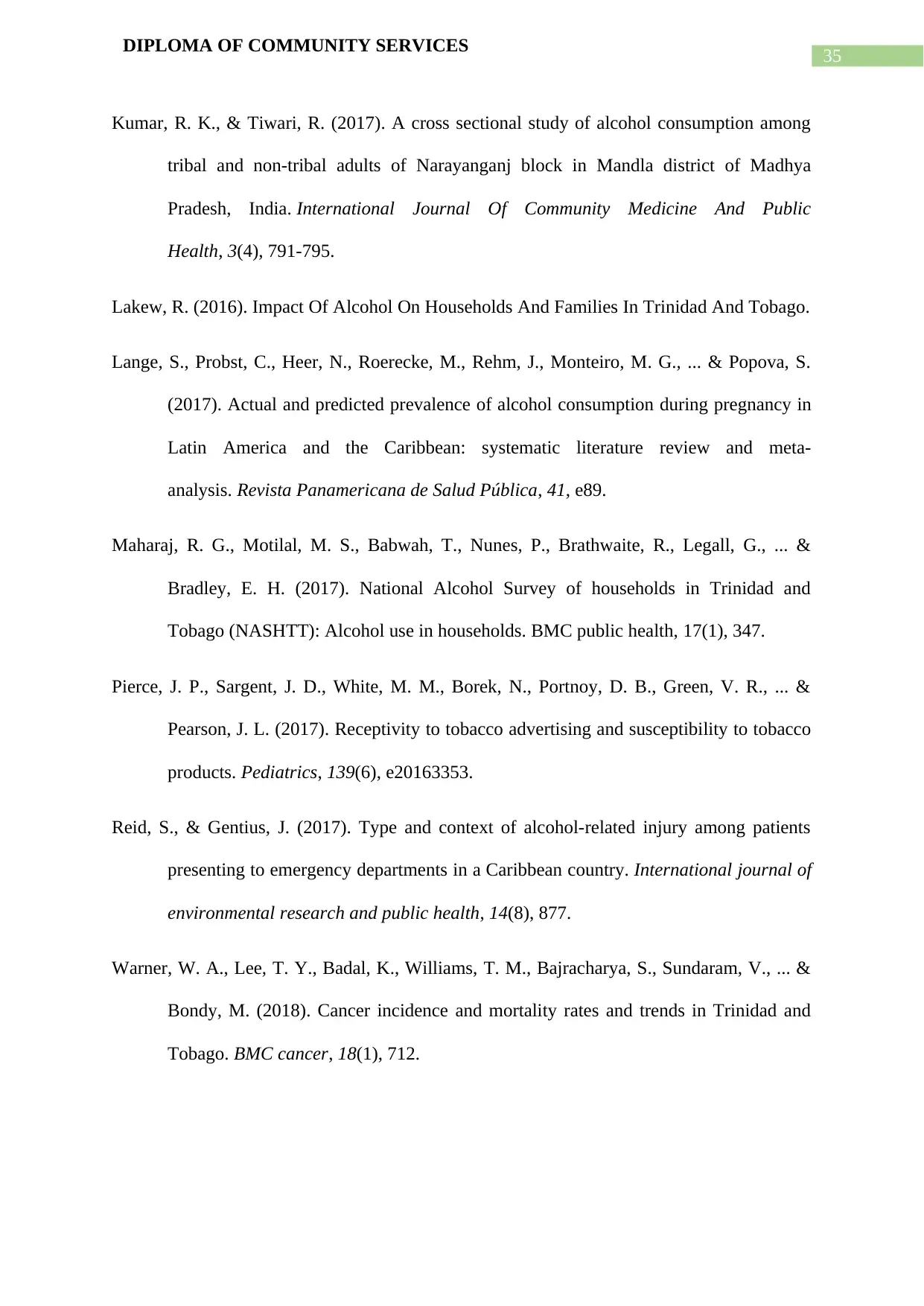
35
DIPLOMA OF COMMUNITY SERVICES
Kumar, R. K., & Tiwari, R. (2017). A cross sectional study of alcohol consumption among
tribal and non-tribal adults of Narayanganj block in Mandla district of Madhya
Pradesh, India. International Journal Of Community Medicine And Public
Health, 3(4), 791-795.
Lakew, R. (2016). Impact Of Alcohol On Households And Families In Trinidad And Tobago.
Lange, S., Probst, C., Heer, N., Roerecke, M., Rehm, J., Monteiro, M. G., ... & Popova, S.
(2017). Actual and predicted prevalence of alcohol consumption during pregnancy in
Latin America and the Caribbean: systematic literature review and meta-
analysis. Revista Panamericana de Salud Pública, 41, e89.
Maharaj, R. G., Motilal, M. S., Babwah, T., Nunes, P., Brathwaite, R., Legall, G., ... &
Bradley, E. H. (2017). National Alcohol Survey of households in Trinidad and
Tobago (NASHTT): Alcohol use in households. BMC public health, 17(1), 347.
Pierce, J. P., Sargent, J. D., White, M. M., Borek, N., Portnoy, D. B., Green, V. R., ... &
Pearson, J. L. (2017). Receptivity to tobacco advertising and susceptibility to tobacco
products. Pediatrics, 139(6), e20163353.
Reid, S., & Gentius, J. (2017). Type and context of alcohol-related injury among patients
presenting to emergency departments in a Caribbean country. International journal of
environmental research and public health, 14(8), 877.
Warner, W. A., Lee, T. Y., Badal, K., Williams, T. M., Bajracharya, S., Sundaram, V., ... &
Bondy, M. (2018). Cancer incidence and mortality rates and trends in Trinidad and
Tobago. BMC cancer, 18(1), 712.
DIPLOMA OF COMMUNITY SERVICES
Kumar, R. K., & Tiwari, R. (2017). A cross sectional study of alcohol consumption among
tribal and non-tribal adults of Narayanganj block in Mandla district of Madhya
Pradesh, India. International Journal Of Community Medicine And Public
Health, 3(4), 791-795.
Lakew, R. (2016). Impact Of Alcohol On Households And Families In Trinidad And Tobago.
Lange, S., Probst, C., Heer, N., Roerecke, M., Rehm, J., Monteiro, M. G., ... & Popova, S.
(2017). Actual and predicted prevalence of alcohol consumption during pregnancy in
Latin America and the Caribbean: systematic literature review and meta-
analysis. Revista Panamericana de Salud Pública, 41, e89.
Maharaj, R. G., Motilal, M. S., Babwah, T., Nunes, P., Brathwaite, R., Legall, G., ... &
Bradley, E. H. (2017). National Alcohol Survey of households in Trinidad and
Tobago (NASHTT): Alcohol use in households. BMC public health, 17(1), 347.
Pierce, J. P., Sargent, J. D., White, M. M., Borek, N., Portnoy, D. B., Green, V. R., ... &
Pearson, J. L. (2017). Receptivity to tobacco advertising and susceptibility to tobacco
products. Pediatrics, 139(6), e20163353.
Reid, S., & Gentius, J. (2017). Type and context of alcohol-related injury among patients
presenting to emergency departments in a Caribbean country. International journal of
environmental research and public health, 14(8), 877.
Warner, W. A., Lee, T. Y., Badal, K., Williams, T. M., Bajracharya, S., Sundaram, V., ... &
Bondy, M. (2018). Cancer incidence and mortality rates and trends in Trinidad and
Tobago. BMC cancer, 18(1), 712.
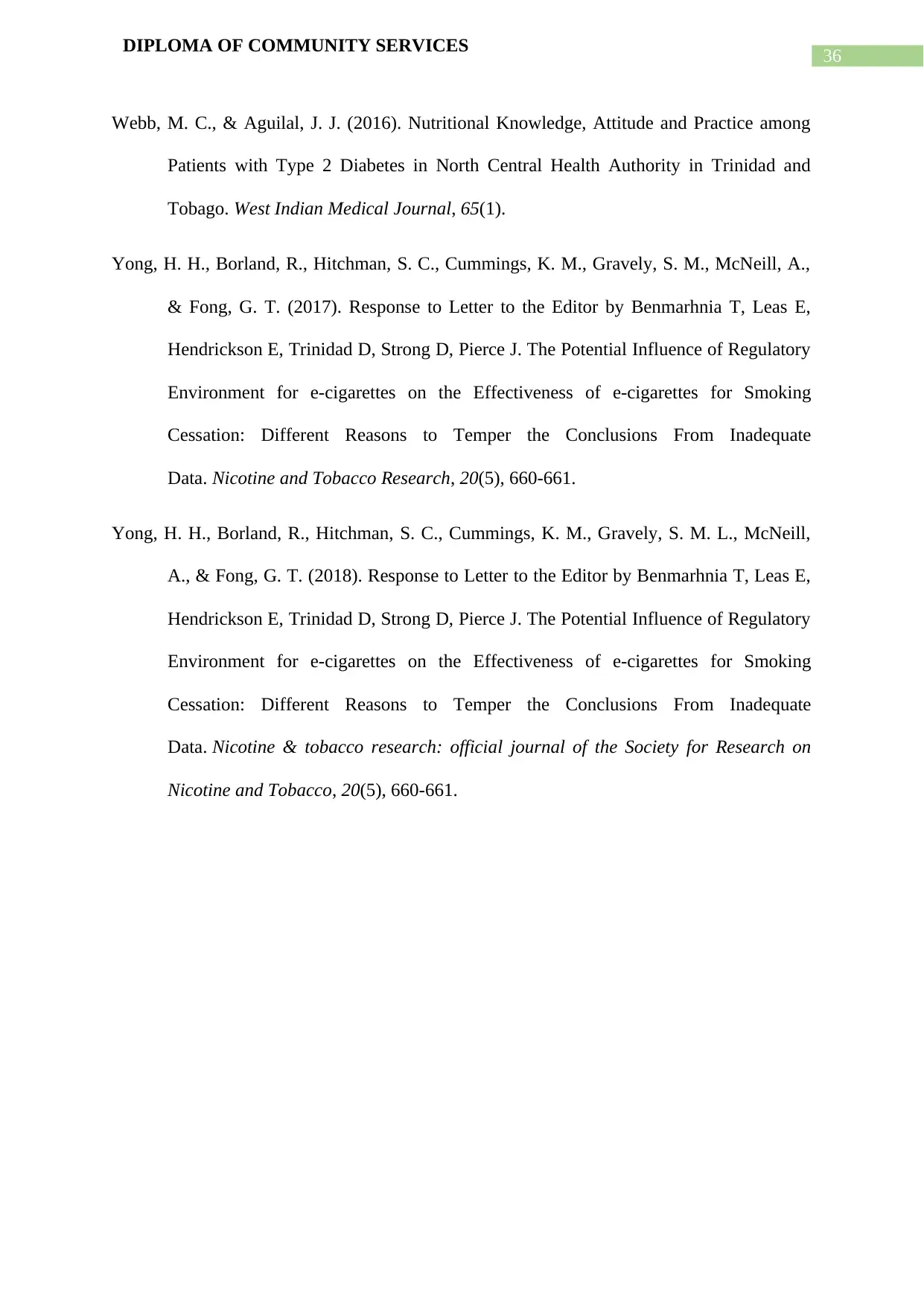
36
DIPLOMA OF COMMUNITY SERVICES
Webb, M. C., & Aguilal, J. J. (2016). Nutritional Knowledge, Attitude and Practice among
Patients with Type 2 Diabetes in North Central Health Authority in Trinidad and
Tobago. West Indian Medical Journal, 65(1).
Yong, H. H., Borland, R., Hitchman, S. C., Cummings, K. M., Gravely, S. M., McNeill, A.,
& Fong, G. T. (2017). Response to Letter to the Editor by Benmarhnia T, Leas E,
Hendrickson E, Trinidad D, Strong D, Pierce J. The Potential Influence of Regulatory
Environment for e-cigarettes on the Effectiveness of e-cigarettes for Smoking
Cessation: Different Reasons to Temper the Conclusions From Inadequate
Data. Nicotine and Tobacco Research, 20(5), 660-661.
Yong, H. H., Borland, R., Hitchman, S. C., Cummings, K. M., Gravely, S. M. L., McNeill,
A., & Fong, G. T. (2018). Response to Letter to the Editor by Benmarhnia T, Leas E,
Hendrickson E, Trinidad D, Strong D, Pierce J. The Potential Influence of Regulatory
Environment for e-cigarettes on the Effectiveness of e-cigarettes for Smoking
Cessation: Different Reasons to Temper the Conclusions From Inadequate
Data. Nicotine & tobacco research: official journal of the Society for Research on
Nicotine and Tobacco, 20(5), 660-661.
DIPLOMA OF COMMUNITY SERVICES
Webb, M. C., & Aguilal, J. J. (2016). Nutritional Knowledge, Attitude and Practice among
Patients with Type 2 Diabetes in North Central Health Authority in Trinidad and
Tobago. West Indian Medical Journal, 65(1).
Yong, H. H., Borland, R., Hitchman, S. C., Cummings, K. M., Gravely, S. M., McNeill, A.,
& Fong, G. T. (2017). Response to Letter to the Editor by Benmarhnia T, Leas E,
Hendrickson E, Trinidad D, Strong D, Pierce J. The Potential Influence of Regulatory
Environment for e-cigarettes on the Effectiveness of e-cigarettes for Smoking
Cessation: Different Reasons to Temper the Conclusions From Inadequate
Data. Nicotine and Tobacco Research, 20(5), 660-661.
Yong, H. H., Borland, R., Hitchman, S. C., Cummings, K. M., Gravely, S. M. L., McNeill,
A., & Fong, G. T. (2018). Response to Letter to the Editor by Benmarhnia T, Leas E,
Hendrickson E, Trinidad D, Strong D, Pierce J. The Potential Influence of Regulatory
Environment for e-cigarettes on the Effectiveness of e-cigarettes for Smoking
Cessation: Different Reasons to Temper the Conclusions From Inadequate
Data. Nicotine & tobacco research: official journal of the Society for Research on
Nicotine and Tobacco, 20(5), 660-661.
1 out of 37
Your All-in-One AI-Powered Toolkit for Academic Success.
+13062052269
info@desklib.com
Available 24*7 on WhatsApp / Email
![[object Object]](/_next/static/media/star-bottom.7253800d.svg)
Unlock your academic potential
© 2024 | Zucol Services PVT LTD | All rights reserved.

